About the Japan Society for Hyperdifferentiation Conference Tokyo 2022
Hyper Interdisciplinary Conference in Tokyo 2022
- Conference Theme
- The Return of Knowledge - Toward an Era of Global Contribution
- Day & Time
- Friday, March 4 and Saturday, March 5, 2022
- Place
- TOC GOTANDA MESSE (TOC Gotanda Messe)Access
- March 4
- March 5
In the limited environment of the earth, we must live by circulating various things, maintaining a sustainable situation, and creating new things. This absolute challenge is akin to "reflux," a chemical reaction with the maximum amount of heat in a closed environment. At Tokyo 2022, under the theme of "reflux of knowledge," we will discuss new knowledge that contributes to the Earth from a sustainable perspective.
What is the Hyper Interdisciplinary Conference?
It is a place where researchers, large corporations, small factories, and venture companies, regardless of their field or industry, can fuse their knowledge and technology through discussion, identify new research themes and issues that humanity needs to face, and promote research together.
Hyper Interdisciplinary Conference in Tokyo 2024
Friday, March 8 and Saturday, March 9, 2023
Dates Friday, March 4 and Saturday, March 5, 2022
Location TOC Gotanda Messe (6-6-19 Nishi-Gotanda, Shinagawa-ku, Tokyo)>MAP
Please note that this is a different venue from the Gotanda TOC Building.
Participants
Academia, ventures, large companies, SMEs, local governments, secondary and high school students, etc.
About distribution
There will be no live-streaming on the day of the event.
Archived videos of some sessions will be available at a later date.
Measures against new coronavirus infection
The meeting will be held in compliance with the policies announced by the government and local authorities, and in cooperation with the implementing venues, and in accordance with the measures taken to prevent new coronavirus infection. For details, please contactNews here (updated February 10, 2022)Please check the following page for details. Any changes to this policy will be posted on this website.
Pamphlet on the day
The pamphlet that will be distributed on the day of the Tokyo Congress of the Association for Hyperdifferent Fields will also be available online.
Visitors will receive them at the reception desk on the day of the event. Please look forward to it!
(Published on Tuesday, March 1, 2012)
Online Abstracts
Abstracts of the poster presentations and booth exhibits of the Japan Society for Hyperdifferentiation Conference Tokyo 2022 are now available online.
For information about your own presentation No., please click here.
To view, you must register for a poster or booth presentation or obtain an auditorium ticket.
- March 4
- March 5
Friday, March 4, 9:30 - 18:50
- Main hall
- Main hall
Technology Splash."
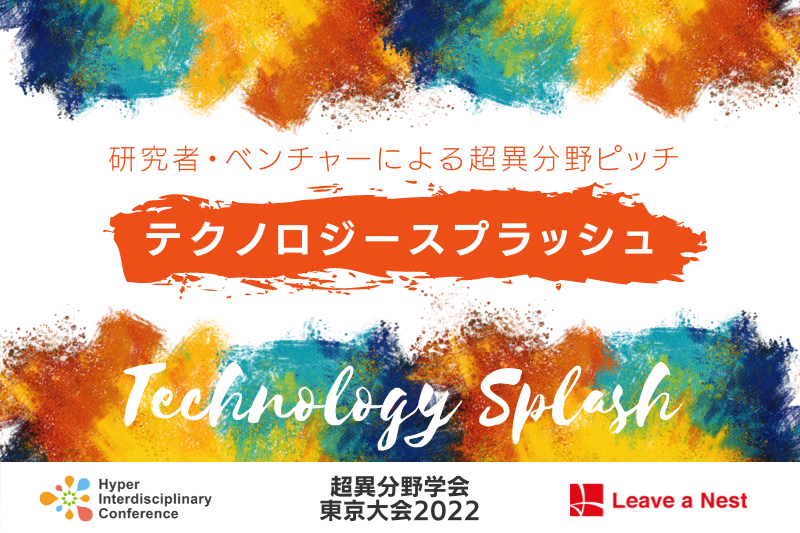
"More Information"
Presenters (as of February 16, 2022)
| order of presentation | belong to | identity | Title/Theme |
| 1 | Saitama University | Kensuke Kageyama | Movement of plants and microorganisms captured by acoustic emission |
| 2 | Shiga University of Medical Science | Junko Okano | Surgical procedures that do not result in kizuato |
| 3 | Tokyo Metropolitan University | Yuya Miyawaki | Research on a system to promote switching behavior from obsessive behavior in autistic children |
| 4 | Tottori University of Environmental Studies | Shin Sato | Degradation of flame retardant rubber by mushrooms |
| 5 | Yokohama National University Graduate School | Shogen Matsumoto | Technology for synthesis of thick film phosphor using high speed vapor deposition method |
| 6 | Tokyo Woman's Christian University | Ikutaro Masaki | An Empirical Study of the Visualization and Psychological Effects of Praise in the Workplace |
| 7 | Miyazaki University | Aya Nishiwaki | Can the "plant water meter" tell how much water a plant needs? |
| 8 | Foundation for the Advancement of International Science (FAIS) | Yohisa Kawasaki | Effects of AC electric field exposure on prolonged survival and improved sleep |
| 9 | Tokyo City University | Akifumi Kawamura | "SATOYAMA BANKING": Supporting Japanese companies that are expanding their business globally by visualizing their SDGs and nature conservation activities! |
| 10 | Fukushima University | Hironori Ohashi | Creating a taste map of tomatoes that allows one to imagine the flavor without tasting. |
| 11 | Shikokuchuo City School Education Division (Junior High School) | Jinsuke Nakayama | Development of bait for captive and cultured fish |
| 12 | Tokyo University of Marine Science and Technology | Daigo Hasegawa | Posture and fatigue evaluation system during running based on human center of gravity detection theory |
| 13 | Emulsion Flow Technologies, Inc. | Hirochika Naganawa | Business related to horizontal recycling of rare metals |
| 14 | Fujii Farm Ltd. | Yuichiro Fujii | Do you know what A2 milk is? |
| 15 | Yamagata Prefectural Yonezawa Kojokan High School | Akiyuki Umetsu | Weather forecasting using microparticles |
| 16 | Department of Sports and Health Science, Faculty of Human Sciences, Kyushu Sangyo University | Goichi Hagiwara | Is playing digital games effective in improving cognitive function? -A Proposed Protocol for Measuring Effectiveness-. |
| 17 | The University of Tokyo | Kenji Itao | Evolutionary Models Reveal Universality and Diversity of Social Structures |
| 18 | Kyoto Sangyo University | Shota Wada | Sensing Mechanisms of Endoplasmic Reticulum Stress Sensors via Redox Regulation. |
| 19 | RIDE DESIGN / Ride Design, HAL Osaka, Osaka High Technology Academy | Hirotsugu Hamada | Development PJ of electric bikes that don't roll over |
| 20 | Sydecas Corporation | Masahiro Yoritama | NinjaFoods, evolving all kinds of food to be healthier and more sustainable |
| 21 | Cecil Research Inc. | Keiji Yamashita | Research business specializing in attached organisms (barnacles, mussels, hydras, algae, etc.) |
| 22 | Core System Japan Inc. | Taishi Yamazaki | Looking at the Environment and Infrastructure with i-Line, a Non-breakable Sensor and IoT System |
| 23 | Tokyo Metropolitan University | Hiromichi Obara | Organ Engineering for the Future |
| 24 | I-Compology Corporation | Hideki Koide | Reducing Environmental Impact through the Use of Biomass Composite Plastics |
| 25 | MicroBiophactory, Inc. | Masashi Shimizu | Development of upcycled materials using unused sugarcane resources |
| 26 | IHI Jet Service Co. | Yoshifumi Dounomae | If this doesn't work, give up. image improvement device that visualizes even a 1-bit difference. |
| 27 | Universal BioSampling, Inc. | Fumiaki Hirata | Innovative bio-sampling by solid-phase liquid specimens at room temperature |
| 28 | OUTSENSE Corporation | Takayama Takahashi | Introduction of Surface Shape Search Service |
| 29 | MORESCO Corporation | Shingo Maruyama | Nano-emulsion of liposoluble drugs into aqueous solutions - Improvement of absorption and use in bioassessment. |
| 30 | Rohto Pharmaceutical Co. | Hisaya Shibata | Sustainable hot bath facility "Fermentation Sauna |
- Poster and booth

- Main hall
Opening up a new field in autophagy research, which was said to be 'useless'.
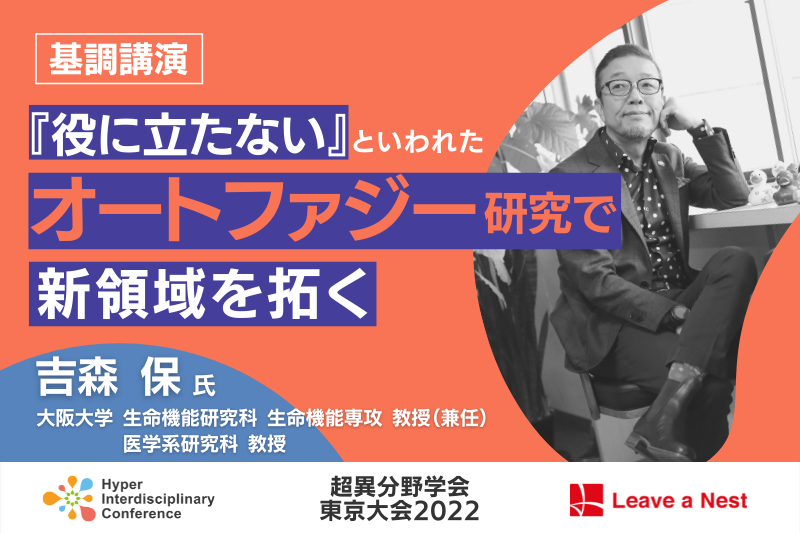
Unfortunately, so-called basic research is often positioned as "useless to society. In these days of rapid change, research that can be quickly commercialized and used in industry tends to attract attention. However, basic research that does not appear to be useful at first glance is the source that opens up new fields and generates new knowledge, and without basic research, there would be no development of science and technology. The field of autophagy, which is now the focus of industry, is one such research field that began with such basic research. The field of autophagy research started with a strong curiosity to clarify the mechanism of the autophagy phenomenon and to understand the physiological significance of the phenomenon. What is the use of this research? Yoshimori's approach to research and his desire to return science to society will surely serve as a guide for all researchers.
"More Information"
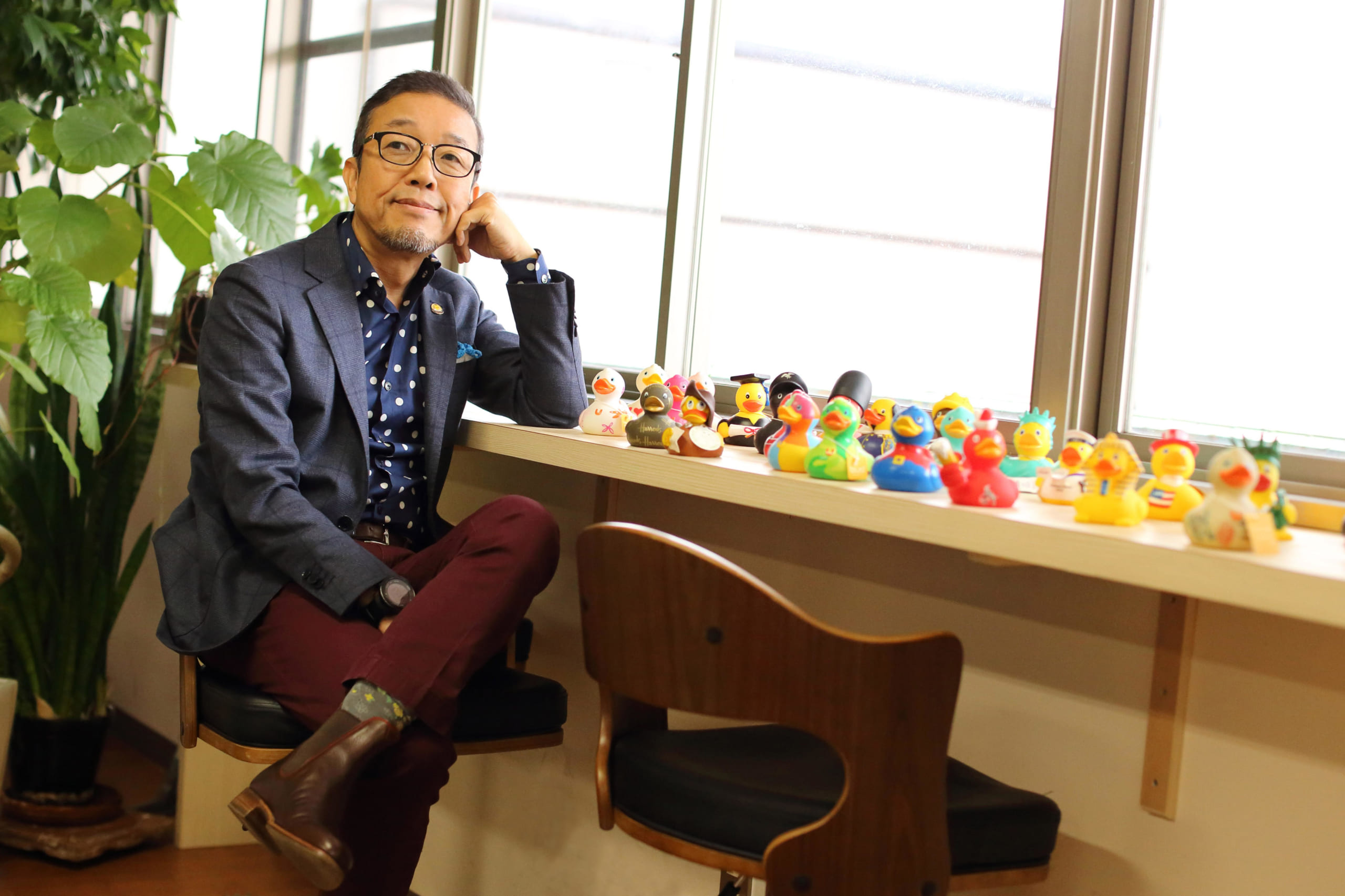
Mr. Tamotsu Yoshimori
Professor, Graduate School of Frontier Biosciences, Osaka University (concurrently) Professor, Graduate School of Medicine
After graduating from the Department of Biology, Faculty of Science, Osaka University, he dropped out of the Graduate School of Medicine at the same university, worked as an assistant at a private university, and studied in Germany before joining the laboratory of Yoshinori Osumi (Nobel Prize in Physiology or Medicine 2016) as an assistant professor in 1996. Together, they have been at the forefront of autophagy research since its early days. He has been a professor at the National Institute of Genetics and the Research Institute for Microbial Diseases, Osaka University. 2017 Professor Emeritus, Osaka University. 2019 Medal with Purple Ribbon, and many other awards. 2019 Technical Advisor, AutoPhagyGO Inc. 2020 President, Japan Autophagy Consortium.
- Main hall
Meta-bio": creating materials that surpass living organisms while taking living organisms as a model.
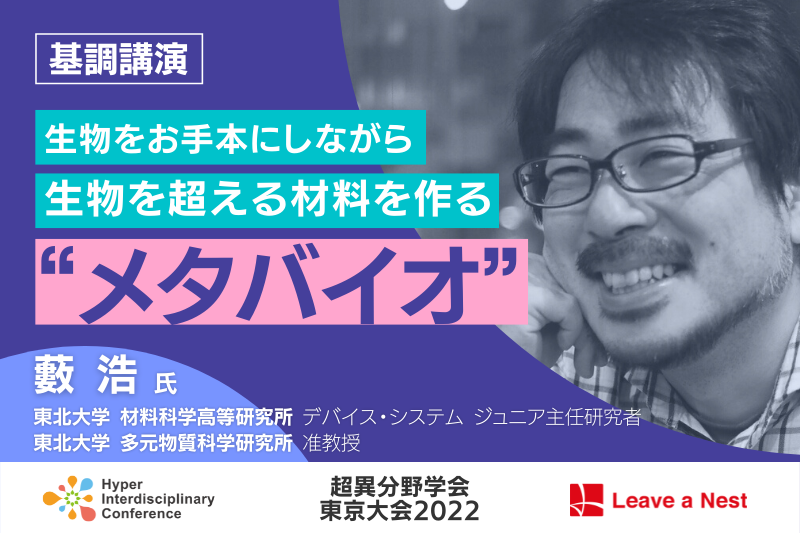
Organisms realize highly controlled manufacturing through self-organization that skillfully takes advantage of molecular characteristics. Not only is this manufacturing more eco-friendly than human top-down processing, it is also highly functional and sophisticated. In this lecture, he will introduce "meta-bio", which has created various functional materials by learning from living organisms and mimicking them more sophisticatedly with artificial materials. In the social and industrial challenges that humanity faces, there are many hints for solutions to be learned from the natural world, including living organisms. Furthermore, the efforts to return newly designed functional materials to society based on these models are a good example of what can be achieved only by transcending fields of study. We would like to provide an opportunity to flexibly think beyond the boundaries of our field by introducing not only the real joys of self-organization and biomimetics research, but also examples of how the results of such research have been linked to business.
"More Information"
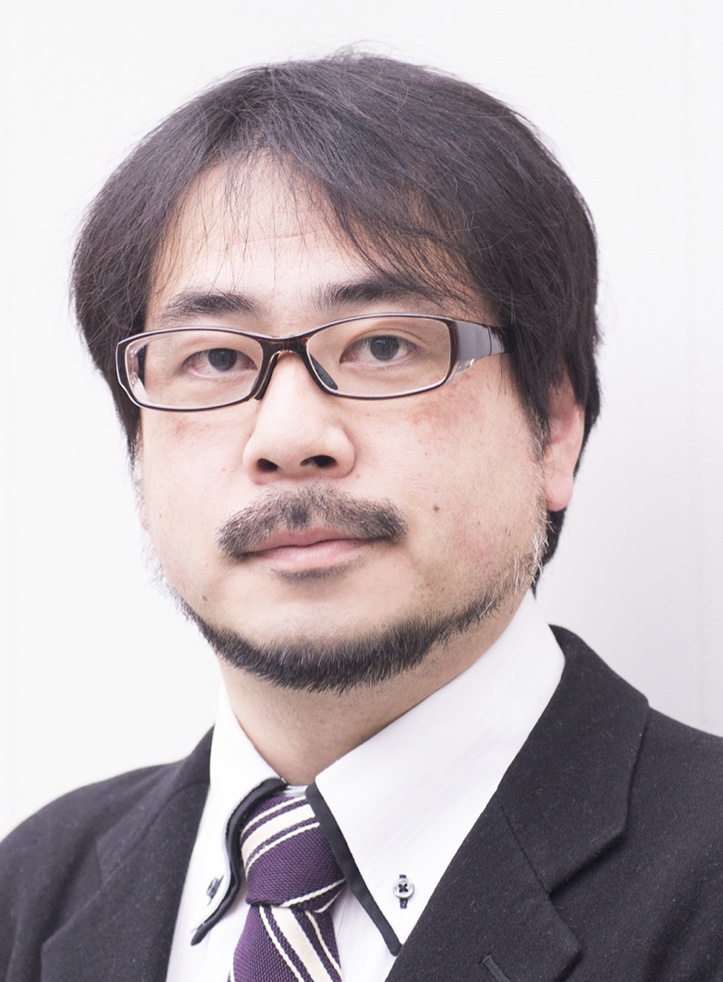
Mr. Hiroshi Yabu
Junior Principal Investigator, Devices and Systems Group, Advanced Institute for Materials Research, Tohoku University
Associate Professor, Institute of Multidisciplinary Research for Advanced Materials, Tohoku University
He has been a Research Associate at Institute of Electronic Science, Hokkaido University since 2004, Assistant Professor at Institute of Multidisciplinary Research for Advanced Materials, Tohoku University since 2007, Visiting Researcher at RIKEN (concurrently) from 2007-2009, Associate Professor at RIKEN in 2010, Junior Principal Investigator at Advanced Institute for Materials Science in 2016, and presently. Engaged in functional materials research, including metamaterials research by self-assembly and biomimetics materials development; co-founded AZUL Energy, Inc. in 2019 with the aim of social implementation of research results, and became Director and Chief Scientific Officer (CSO).
- Main hall
- Development of a drone crop pathology diagnostic project in Malaysia -.
Session Partner ACSL Corporation
powered by Manufacturing Research Center
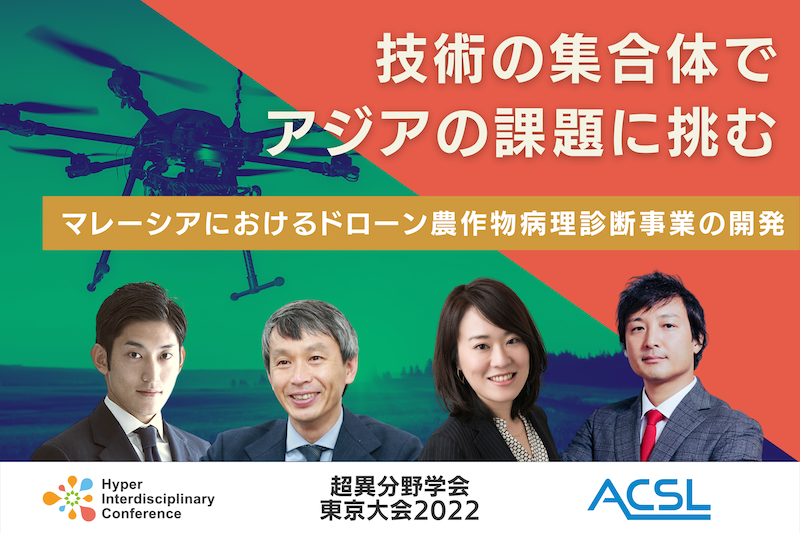
"More Information"
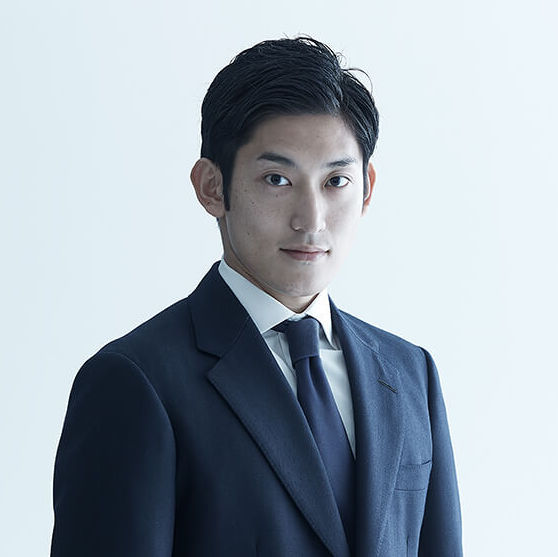
Mr. Kensuke Hayakawa
ACSL Corporation
Director CFO
He joined ACSL in March 2017. Previously, he worked at KKR Capstone, where he was involved in management reform of portfolio companies. He holds a Master's degree in Innovation Management from Tokyo Institute of Technology.
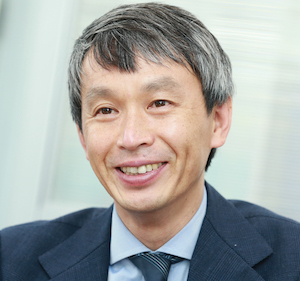
Takahiro Nakamura
Representative Director, Polastar Space Inc.
Born in Tochigi Prefecture. Graduated from the Department of Aerospace Engineering, Faculty of Science and Engineering, National Defense Academy. Involved in satellite development at Mitsubishi Electric Group. After working as a secretary for a politician, developed and operated a search engine as a representative of Mooter Corporation. The night sky is very beautiful in Nasu Highlands, and he started Polar Star Space out of his yearning for space, his involvement in satellite development, and his desire to one day utilize space (satellite data) for something close to home.
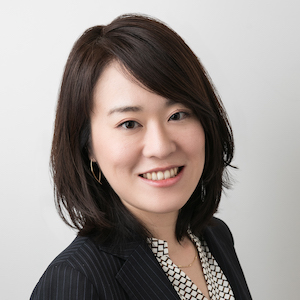
Yuko Ueno
Director, Leave a Nest Malaysia Sdn. Bhd.
D. in Science. While in school, he explored the origin of life through his study abroad experience in the U.S. In 2013, he joined LIVERNESS, Inc. In the Human Resource Development Division, he developed U.S. training programs for young Japanese researchers. After two years of experience as the general manager of the division, he became the editor-in-chief of the booklet "Founding Support" and engaged in dialogue with many venture executives. After gaining experience in assisting Japanese deep-tech startups to enter Southeast Asia and Southeast Asian startups to enter Japan, he was appointed as General Manager of the Group Development Business Division in October 2021. In November of the same year, he was appointed as Director of Leave a Nest Malaysia Sdn. Bhd. He aims to establish a knowledge platform that integrates Southeast Asia and Japan in order to maximize the RIVERNESS Group.
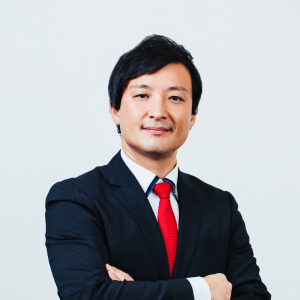
Moderator.
Yukihiro Maru
Group CEO and Representative Director, LIVERNESS Co.
In 2002, while a graduate student at the University of Tokyo, he founded LIVERNESS with only undergraduate and graduate students in science and engineering. He has developed Japan's first "delivery experiment class of cutting-edge science" into a business. He operates a "knowledge manufacturing business" that creates new knowledge by combining technologies and management resources that lie dormant in universities and local communities. As the instigator of one of Asia's largest venture ecosystems, he works to solve global-scale social issues by discovering deep tech from around the world. He is also an innovator involved in the launch of numerous deep tech ventures, including Euglena.
- Session Room A
Session Partner Suntory Global Innovation Center Ltd.
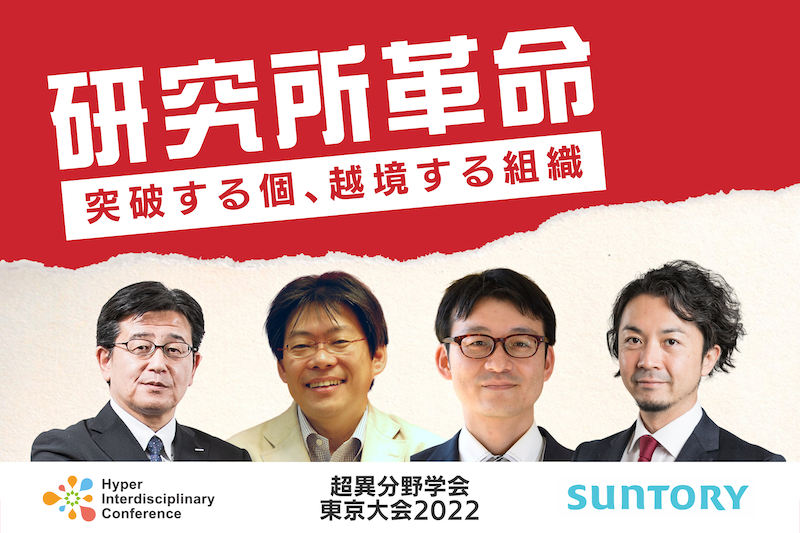
In this session, we will invite corporate researchers, researchers who have jumped out of the corporate world, and researchers who are looking at corporations from academia to discuss what it takes to start a revolution.
"More Information"
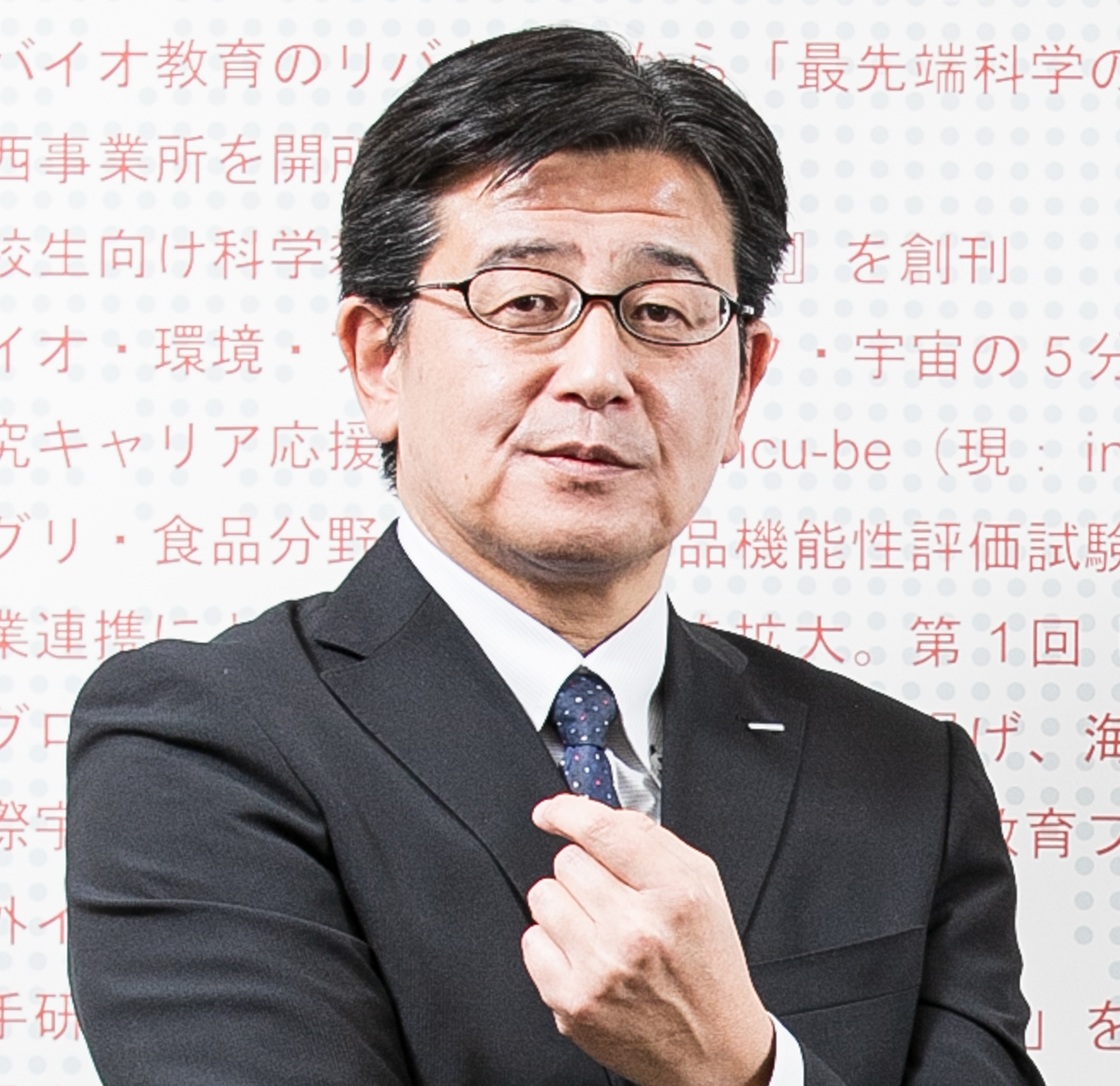
Mr. Koichi Nakahara
Suntory Global Innovation Center Limited
Director of Research Promotion Dept.
M.S. in Fermentation Science, Graduate School of Agriculture, Kyushu University, and joined Suntory Ltd. D. (Agricultural Science) in functional research on oolong tea polyphenols from his activities at the Basic Research Laboratory. Through basic research on polyphenols and material development, he contributed to the commercialization of beverages and candies with his basic research results. In the Technology Development Division, he was engaged in the development of new technologies such as raw material processing, and developed a new technology utilizing the reaction characteristics of water. He developed a new technology that utilizes the reaction characteristics of water. He connected the technology to commercialize a unique raw material and received the 2004 Society of Chemical Engineers of Japan Award for Technology. He aims to contribute to society through research by sending out products accompanied by the results of his fundamental research. Currently, he is promoting open innovation activities at Suntory Global Innovation Center, aiming to install technology through external collaboration. (He has been a visiting professor at Yamagata University and also a visiting professor at Tokyo University of Agriculture.)
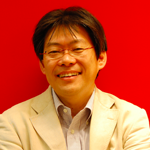
Mr. Hideki Hayashida
Professor, Department of Industrial Technology, Graduate School of Engineering, Tokyo University of Agriculture and Technology
D. in Materials Science and Engineering, Graduate School of Engineering Science, Osaka University, and a Master of Business Administration in Contemporary Business Administration, Graduate School of Business Administration, Kobe University. Currently teaching and conducting research in technology management at the Department of Industrial Technology, Graduate School of Engineering, Tokyo University of Agriculture and Technology. He has been active in the chemical industry for a total of 32 years, including 19 years at a Japanese chemical company and 13 years at a major foreign chemical company. He has experience in R&D, new business development, and management of existing businesses of functional chemicals on a global scale, as well as venture investment business. Through open innovation activities in a wide range of fields such as chemicals, semiconductor materials, biotechnology, medical devices, and IoT for nursing care, he has created new business projects by combining the resources of large companies with the technologies owned by other companies, universities, and ventures.
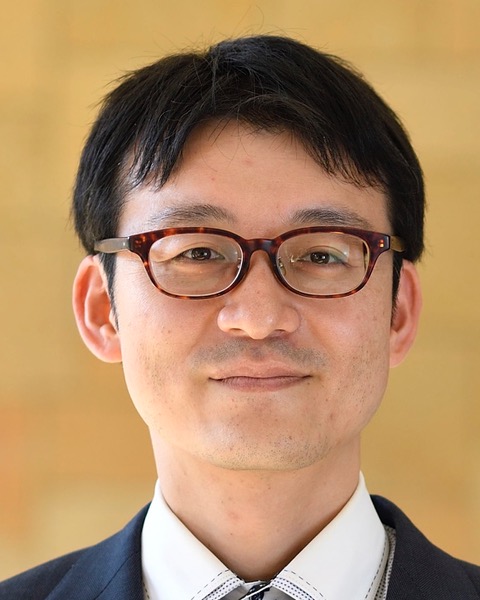
Mr. Toru Yoshioka (Kobayashi)
Lecturer, Center for Innovation Research, Hitotsubashi University
He graduated from the Faculty of Law, Osaka University in 2005 and completed his law studies there in 2007. From the same year to 2012, he was in charge of research and study of science and technology policy at Mitsubishi Research Institute, Inc. He received his Ph.D. in 2015 from the University of Tokyo, Graduate School of Engineering, Department of Technology Management Strategy. In the same year, he was a specially-appointed lecturer at Hitotsubashi University's Center for Innovation Research, and from 2016 to 2019, he was a specially-appointed assistant professor at the University of Tokyo's Graduate School of Engineering, where he will hold his current position from 2019. His research focuses on the management of technology and design development, focusing on the knowledge possessed by engineers and designers. He also conducts research on the management of industry-university collaboration and university research activities from an organizational perspective, as well as research on university-launched ventures from an external environment perspective. His main publications include "Economics of Innovation & Marketing" (co-authored, Chuokeizai-sha, Inc.).

Moderator.
Joe Inoue
Representative Director, Vice President CTO, Liverness, Inc.
D. in Pharmaceutical Sciences from Tokyo University of Pharmacy and Life Sciences. He is a founding member of LIVERNESS. After completing his doctoral studies, he worked as an assistant professor and lecturer at the Faculty of Science, Kitasato University, and an assistant professor at the Graduate School of Medicine, Kyoto University, before being appointed and concurrently serving as a specially-appointed associate professor at the Institute for Advanced Biosciences, Keio University in 2015, and as a professor of advanced pharmacy at the Faculty of Pharmaceutical Sciences, Kumamoto University and a visiting professor at Keio University's Faculty of Pharmaceutical Sciences in 2018. While conducting research and development, he is a researcher involved in launching joint research projects with universities and research institutions and supporting the establishment of research institutes.
- Session Room B
- Redefined from human history and ergonomics -
Session Partner Tokai Railway Company
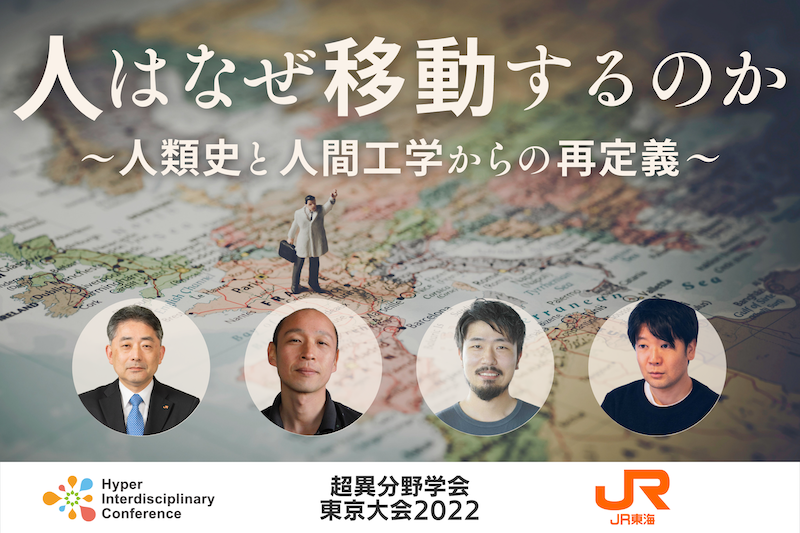
"More Information"
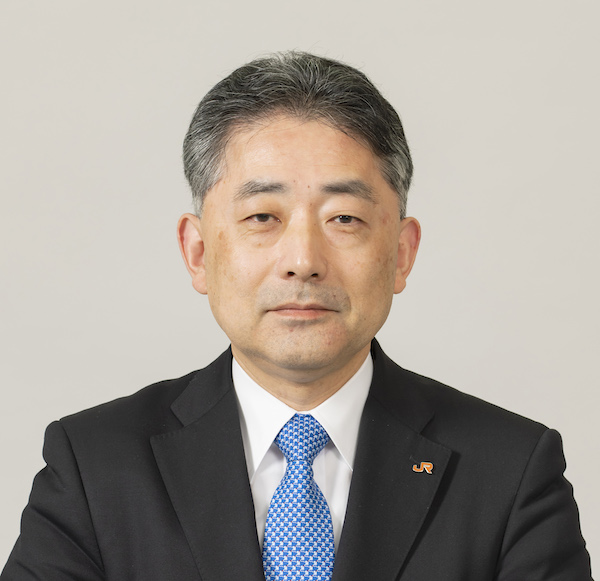
Mr. Tatsuya Okajima
Executive Officer, Tokai Railway Company
Deputy General Manager, General Engineering Headquarters; General Manager, Engineering Development Dept.
After completing his master's degree at the Graduate School of Engineering, Kyoto University, he joined Tokai Railway Company (JR Tokai) in 1988 as a first-generation employee. Focusing on the electrical and systems fields, he has been engaged in a wide range of work including the development of superconducting linear trains, maintenance and management of Shinkansen and conventional lines, technical development, as well as management strategy and human resource development. After serving as Deputy General Manager of the Engineering Development Department of the General Engineering Division, he assumed his current position in 2018.
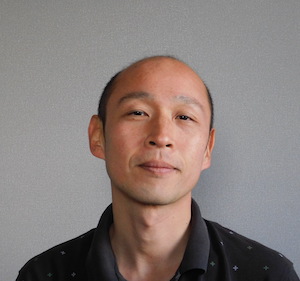
Mr. Hideaki Suzuki
Associate Professor, Department of Global Phenomena, National Museum of Ethnology
His specialty is history. By combining archives and fieldwork, he attempts to decipher the history of the world in the Indian Ocean region through the movements and encounters of people and goods. He is also engaged in global history. He is the author of Slave Trade Profiteers in the Western Indian Ocean: Suppression and Resistance in the Nineteenth Century (Palgrave, 2017) and "People Not Emancipated, People Not Emancipated. --A Global History of the Abolition of Slavery (University of Tokyo Press, 2020), and editor of World History in View from East Asian Seas: Networks and Seas (Akashi Shoten, 2019).
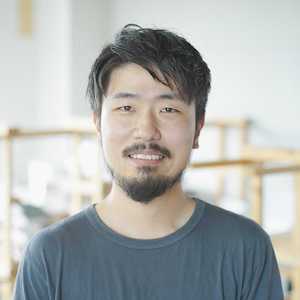
Mr. Ryohei Tokuda
Director and CDO, Ashirase Inc.
Graduated from Graduate School of Information Science and Technology, Hokkaido University.
He has been engaged in circuit design and product management of mobile notebook PCs at Fujitsu Limited since 2011, and in functional research and system design in the automotive HMI area at Honda R&D Institute since 2016. he will participate in the activities of Ashirase from 2019 and co-found Ashirase in April 2021. Chief Development Officer. Winner of the S-Booster 2019 Grand Prize from the Cabinet Office, the Asics accelerator program Excellence Award, and the Hiroshima Sandbox D-EGGS Sandbox Award.
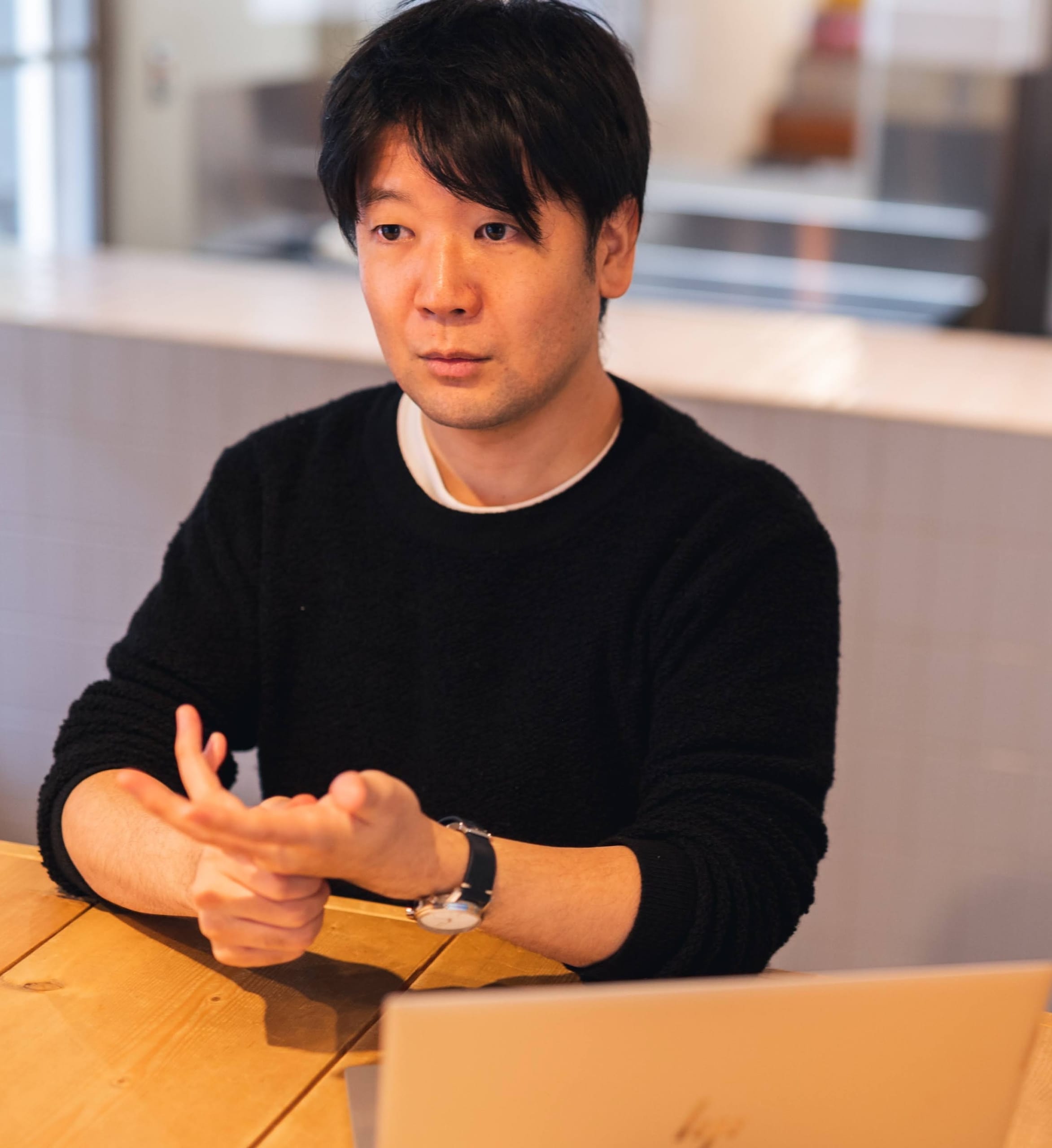
Moderator.
Mr. Kazutaka Inoue
Sun Asterisk Inc.
Business Development Section Manager
After graduating from Keio University, Faculty of Science and Technology, he joined Arthur D. Little, a strategy consulting firm. In 2012, he joined JINS. After leaving JINS, he joined Sun Asterisk.
- Main hall
Session Partner KOBASHI HOLDINGS Co.
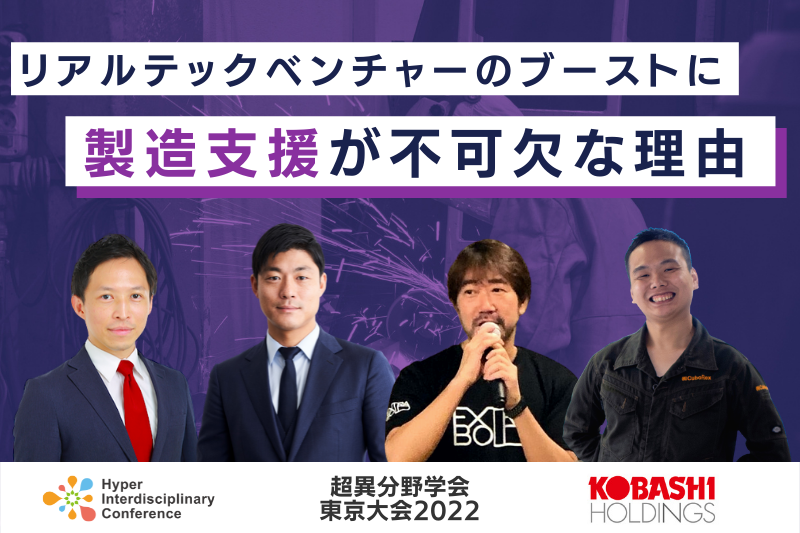
"More Information"
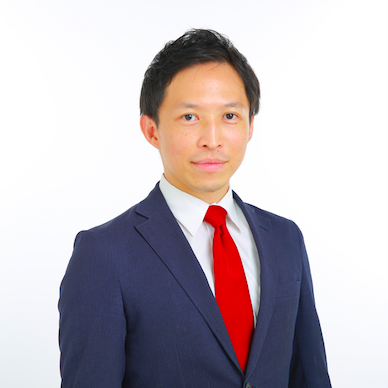
Moderator.
Mr. Shogo Sakashita
Executive Officer, Office of the President, KOBASHI HOLDINGS Co.
/ COO, KOBASHI ROBOTICS Co.
Born in Chiba, Japan in 1984. After graduating from university, he joined Mikimoto Co., Ltd. and worked as a diamond buyer, procuring diamonds for royalty and royal families. Later, experienced setting up reconstruction projects after the Great East Japan Earthquake, and joined MISUMI Corporation in 2015. He has experience in development, production, and sales, and is familiar with marketing and promotion in e-commerce. He has also been engaged in business strategy planning. Responsible for planning and executing business strategies for the entire group. In order to embody the management philosophy "Cultivate the Earth," in addition to the core agricultural machinery business, he is also involved in the manufacturing support business for startups and the creation of new regional industries.
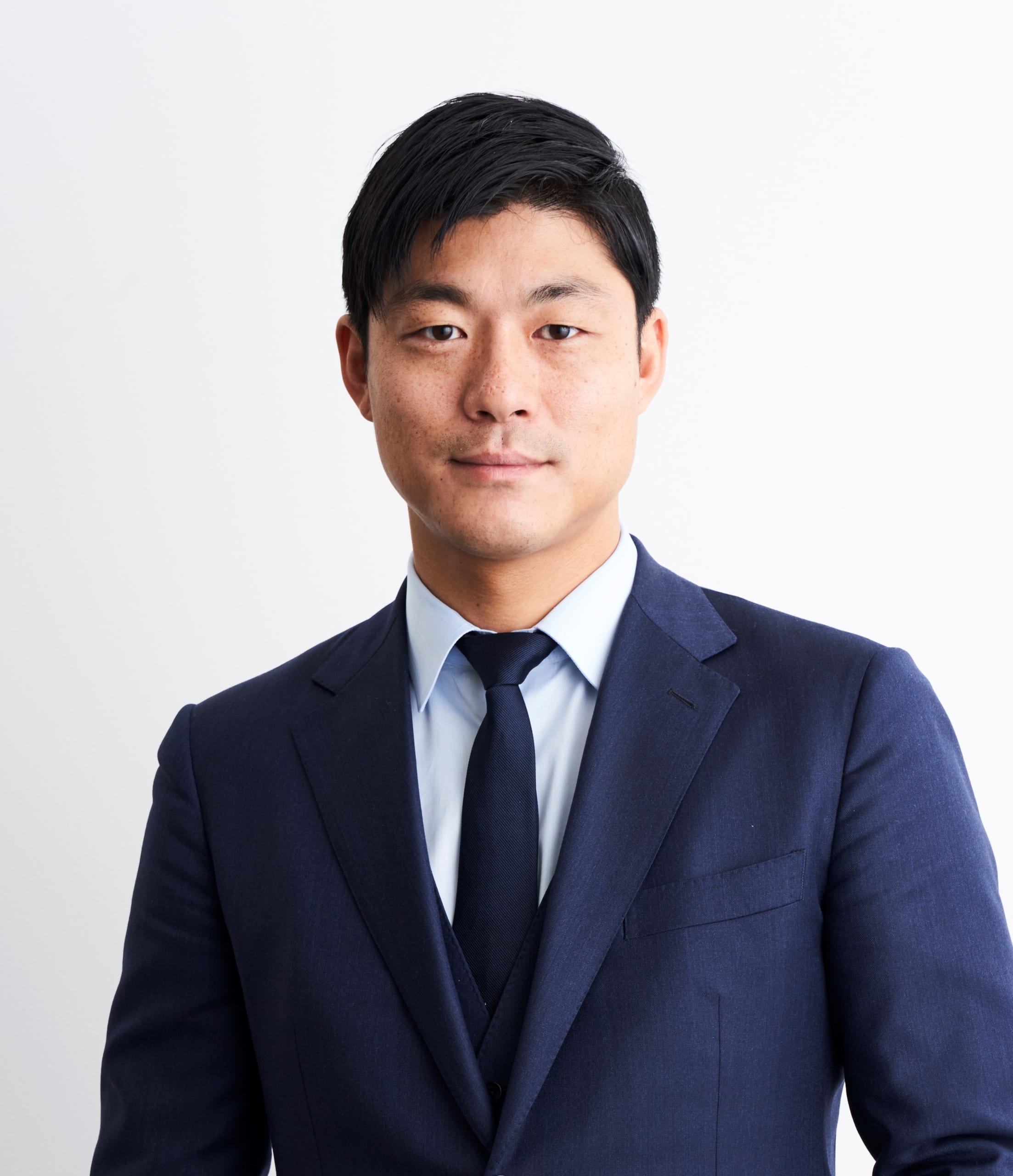
Mr. Akihiko Nagata
President, Real Tech Fund
Director, Representative Executive Officer and CEO, Euglena Co.
After graduating from Keio University's Faculty of Commerce, he joined an independent private equity fund and became a director of Euglena Co. in 2008. Since the unlisted period, he has been in charge of business strategy, M&A, fundraising, capital alliance, PR/IR, and administration. Currently, as CEO, he is responsible for the execution of all business operations and promoting next-generation management, including rebranding to extend healthy life expectancy, developing biofuels for a decarbonized society, and designing a system to incorporate teenagers into management. He also oversees overall fund management as the representative of the Real Tech Fund, one of Japan's largest technology VC firms.
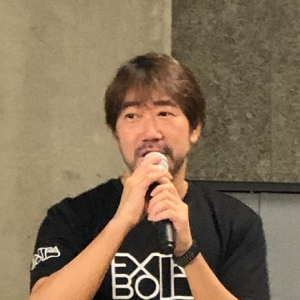
Mr. Yuji Hara
Representative Director, ExtraBold Corporation
He has experience working on prototype production at a major telecommunications equipment manufacturer and as a development manager at a 3D CAD/CAM software development company. Later, he started a sales consulting company for 3D printers and other products and a community management company for 3D engineers, and worked to spread 3D technology. Currently, at ExtraBold Corporation, which he founded in 2017, he is developing and selling a laminate molding system that circulates plastic, utilizing his experience as a 3D tool developer, user, and sales consultant.
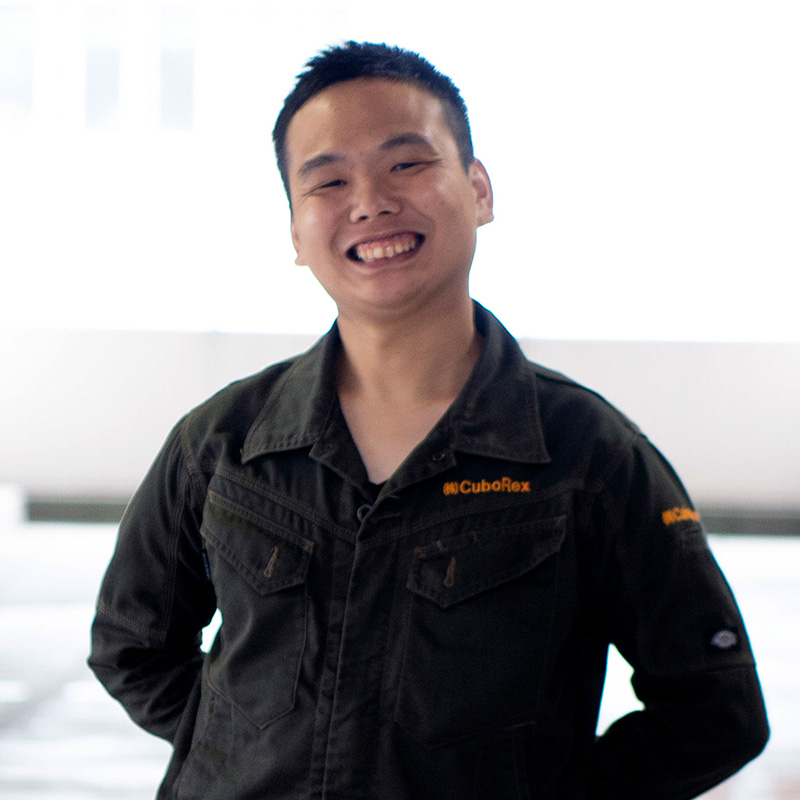
Mr. Mizuhito Terashima
CEO/CTO, CuboRex Corporation
Born in 1993. Born in Arita-gun, Wakayama. Graduated from Wakayama National College of Technology, Department of Intelligent Mechanical Engineering, and Nagaoka University of Technology, Department of Mechanical and Creative Engineering. He has been actively involved in robot contests since his student days, winning many national runner-up prizes. Based on his research on rescue robots, he won the third place in the 2017 James Dyson Award in Japan. International top 20 prize winner. Winner of the Ministry of Internal Affairs and Communications' Different Generation Award in the "Other Fields Not Conceived of by the Business Execution Organization" category, among others.
- Session Room A
Session Partner Uchida Samejima Law Office
powered by Investment Development Research Center
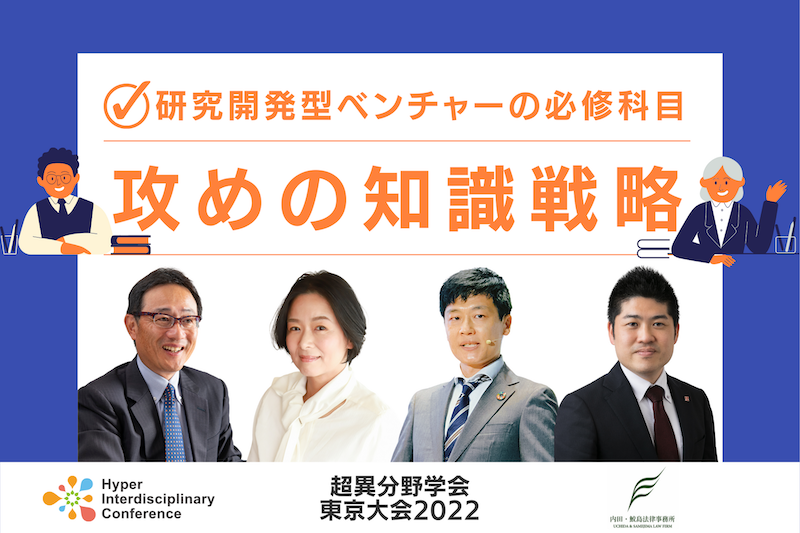
"More Information"
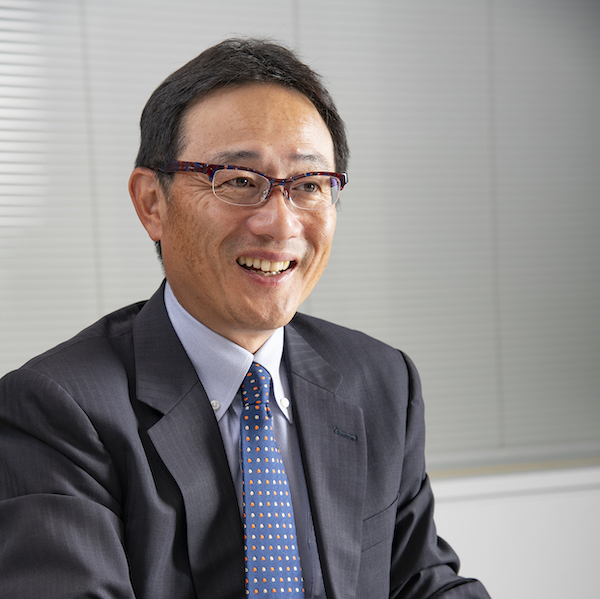
Mr. Masahiro Samejima
Uchida & Samejima Law Office
Representative Partner and Patent Attorney
Born on January 8, 1963 (age 58), he graduated from the Department of Metallurgical Engineering, Tokyo Institute of Technology. After working as an engineer (development of wire materials) at Fujikura Electric Wire Ltd. In addition to his legal practice, he received the 2012 Intellectual Property Merit Award for his contributions to IP strategy, IP management, and IP policy. He has served on several government committees related to open innovation and is well versed in policy trends. His publications include "Gijutsu Houmu no Susume" (Nihon Kajo Shuppan 2014) [co-author] and "Chizai Senryaku no Susume: Building Competitive Advantage in an Age of Commoditization" (Nikkei BP 2016) [co-author].
He is the model for Attorney Kamiya in "Shitamachi Rocket."
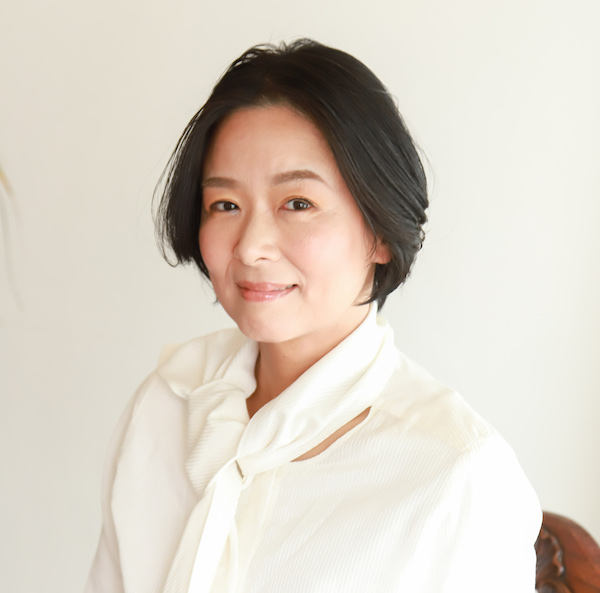
Ms. Michiko Ashizawa
Associate Professor, Faculty of International Commerce, Yokohama City University
Since 2013, he has been an Associate Professor at Yokohama City University, Faculty of International Commerce, where he has consistently been interested in practical entrepreneurship education and entrepreneurship support. Since 2018, he has also been focusing on research into "startup ecosystems" and is particularly committed to policy proposals and their implementation for the formation of ecosystems in collaboration with industry, academia, and government in the Yokohama area. Currently, he serves as an outside director of three listed companies and as a member of various committees of the national government and the City of Yokohama. Graduated from Keio University (B.A. in Economics, M.B.A., Ph.D. in Business Administration)
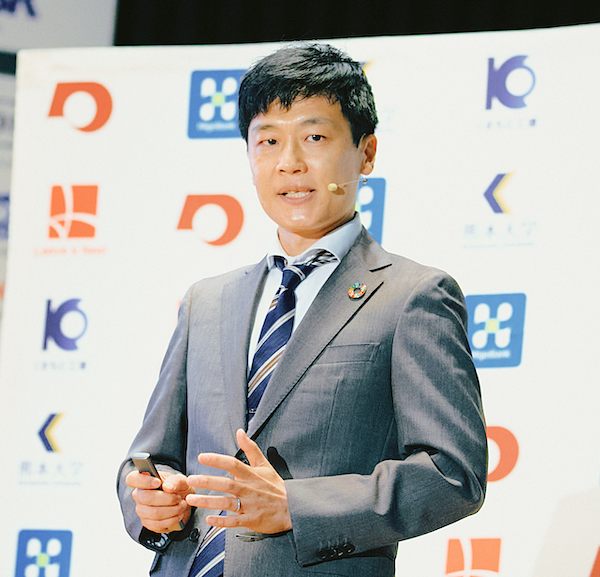
Mr. Tsuyoshi Suto
Kumamoto University Graduate School of Life Sciences Research Center for Global Natural Products Science
associate professor
Born in Beppu City, Oita Prefecture. Studied abroad during his master's program at Kumamoto University Graduate School. Currently, he is an associate professor at the Center for Global Natural Products Science attached to the Graduate School of Life Sciences, Kumamoto University. Since 2017, as a project manager and researcher of UpRod, Kumamoto University's natural products manufacturing project, he has conducted 100 company interviews with pharmaceutical and food companies, and is also conducting his own research on nematode worms. He is also working hard to implement the results of his research on nematodes in society.
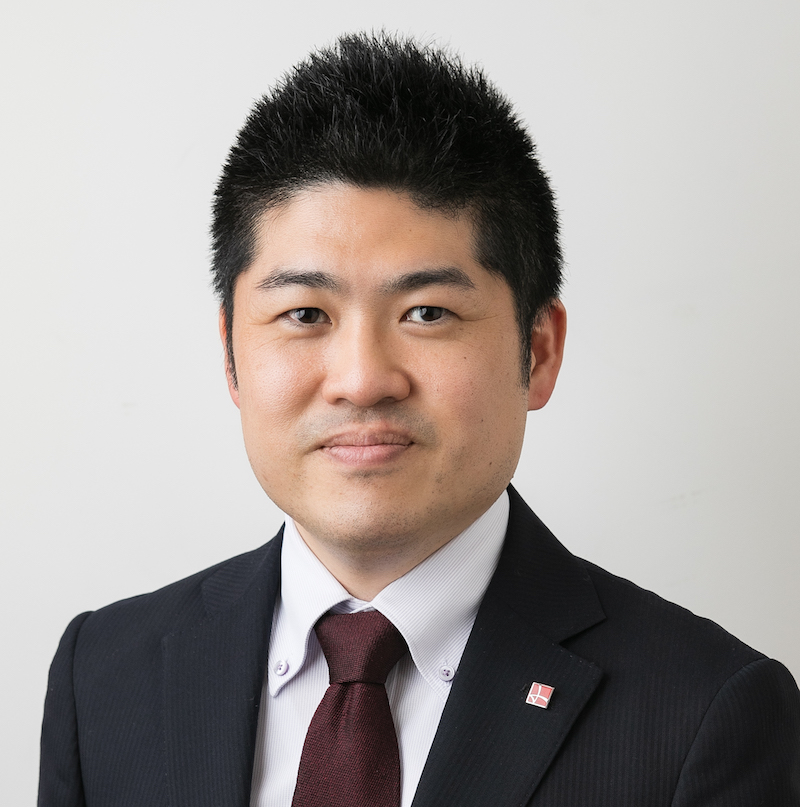
Moderator.
Yuji Fukuda
Leave a Nest Co., Ltd.
Director, Investment Development Research Center
After completing a master's degree in molecular biology at the Graduate School of Biological Sciences, Nara Institute of Science and Technology, he worked in agriculture for a year and a half at a pig farm directly managed by a feed sales company. In 2016, he launched and managed "Kumamoto Tech Planter," a project to support startups by the Kumamoto Prefecture Next-Generation Venture Creation Support Consortium. After working in Osaka, he joined the Tokyo Head Office in 2020.
- Session Room B
Session Partner Omron Corporation
powered by Knowledge Foundation Research Center
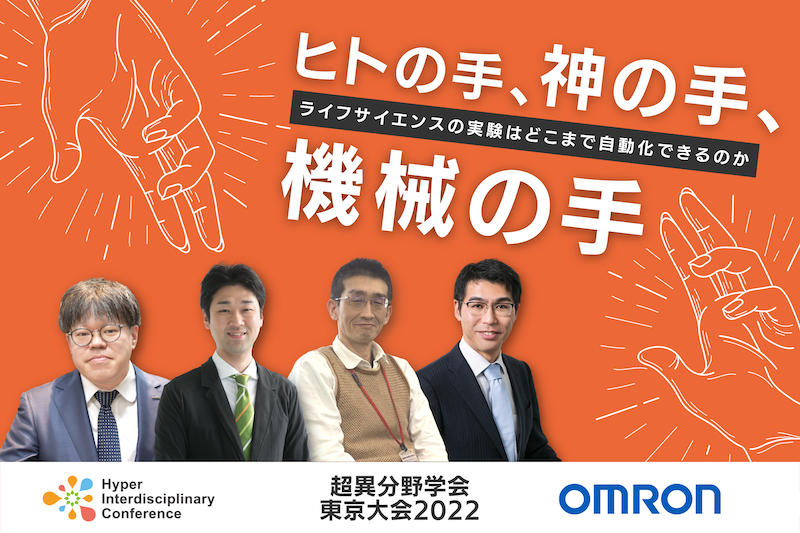
"More Information"
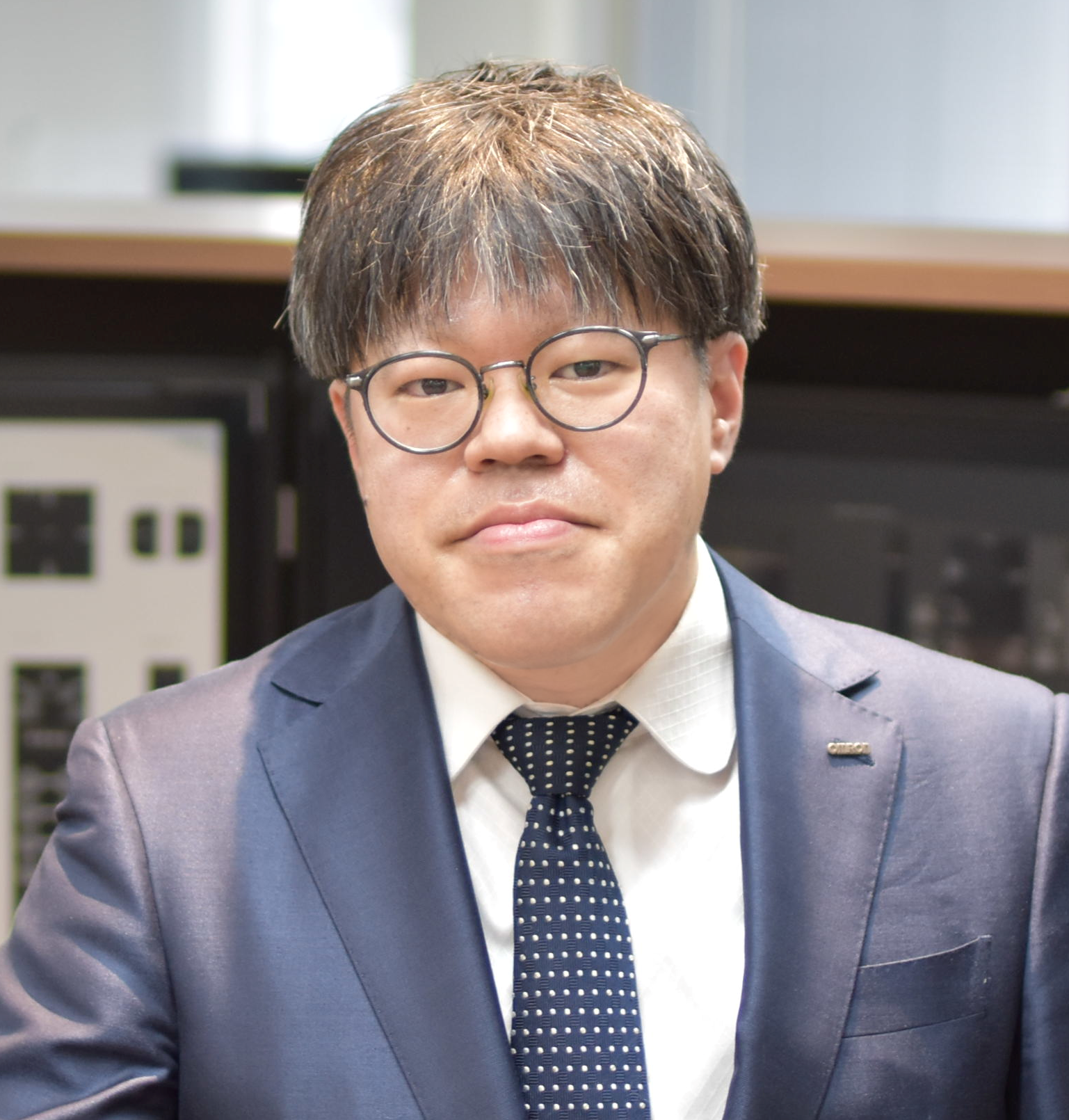
Mr. Atsuhiko Negishi
Omron Corporation
Industrial Automation Business Company Planning Office
Chief, Industry Marketing Dept.
Joined OMRON in 2010. As an engineer, he was engaged in the development of temperature control controllers for industrial use and the development of design technology that can withstand adverse environments. After that, he was in charge of planning manufacturing solutions for industries such as image sensors, the automotive industry, the electronics industry, and the food manufacturing industry, and is currently taking on the challenge of launching a new business for the medical field from April 2021!
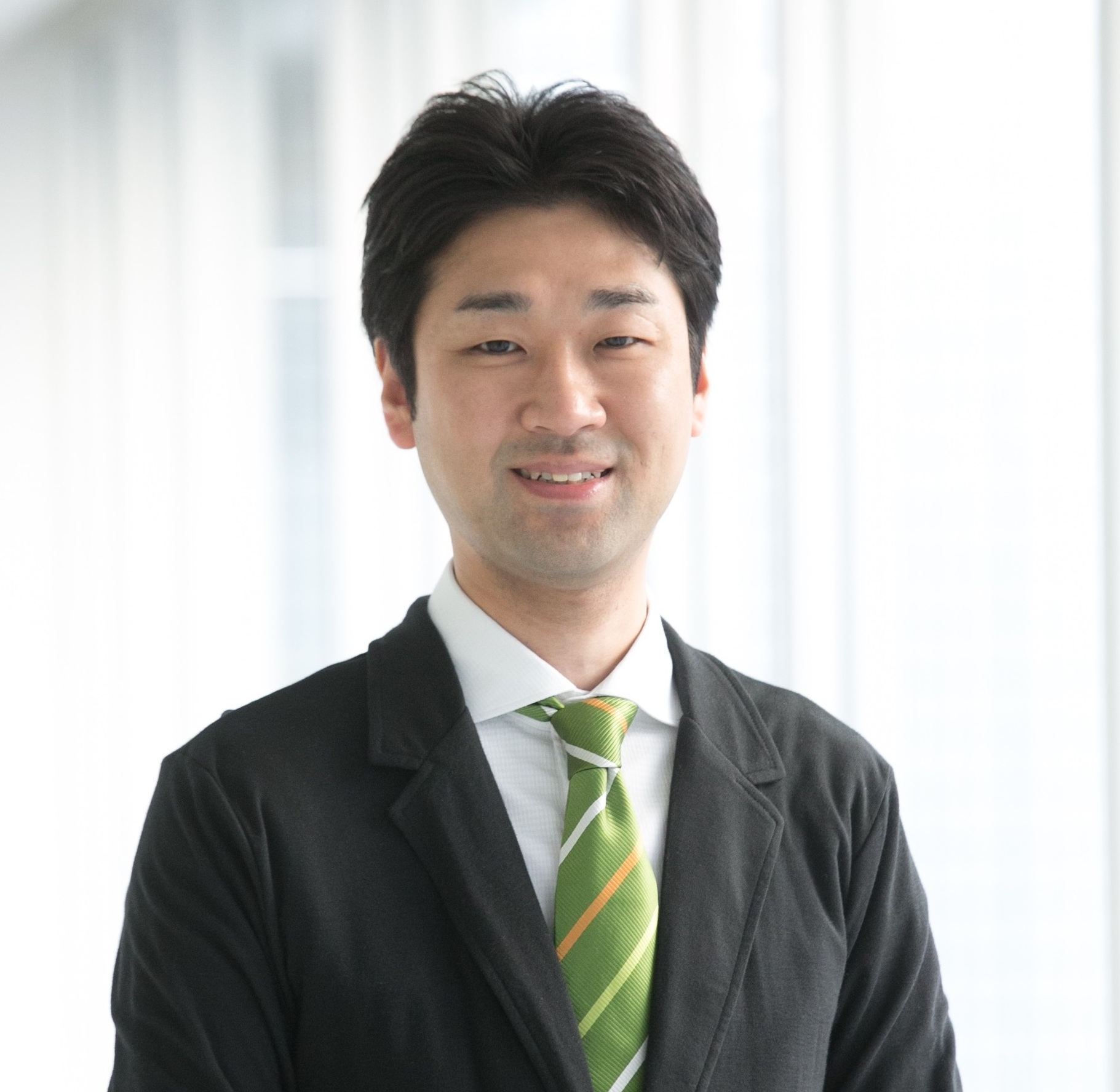
Mr. Takaaki Horinouchi
National Institute of Advanced Industrial Science and Technology (AIST)
Senior Researcher, Artificial Intelligence Research Center
D. in Information Science from the Graduate School of Information Science and Technology, Osaka University, in 2011. After working as a special researcher at the RIKEN Center for Biosystems Research and a researcher at the RIKEN Center for Functional Biology, he has been in his current position since August 2022. Representative of the Bioinformatics Advisory Group of the Japanese Society for Biological Engineering. He is also a board member of the Laboratory Automation Research Association. He is promoting the development and utilization of robotics and AI platforms for automation of various life science experiments.
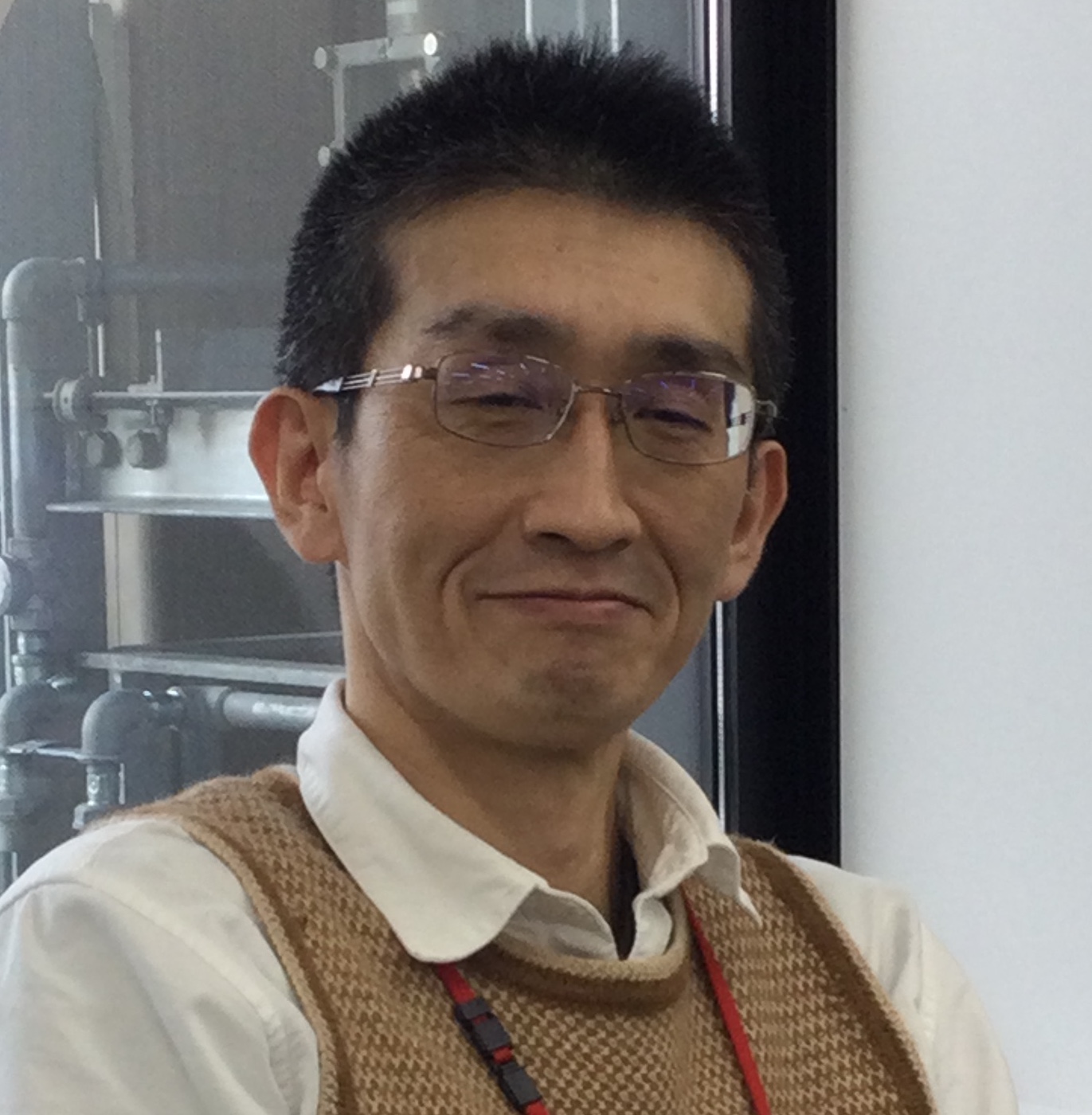
Mr. Masao Mochizuki
Bacchus Bioinnovations, Inc.
D. in 1999 from the Graduate School of Science, Himeji Institute of Technology (now Hyogo Prefectural University).
After working as a postdoctoral fellow and a faculty member at various universities in the Kansai region, he ended his university career as a national professional researcher at Kobe University. Although his background is in old-fashioned biochemistry, he has been involved in bioproduction and lab automation at Kobe University, and his experience has been well received in his current position. Bacchus aims to be a flat corporate organization with no positions. He is in charge of infrastructure development, including automation and IT, and is currently struggling with his current tasks.
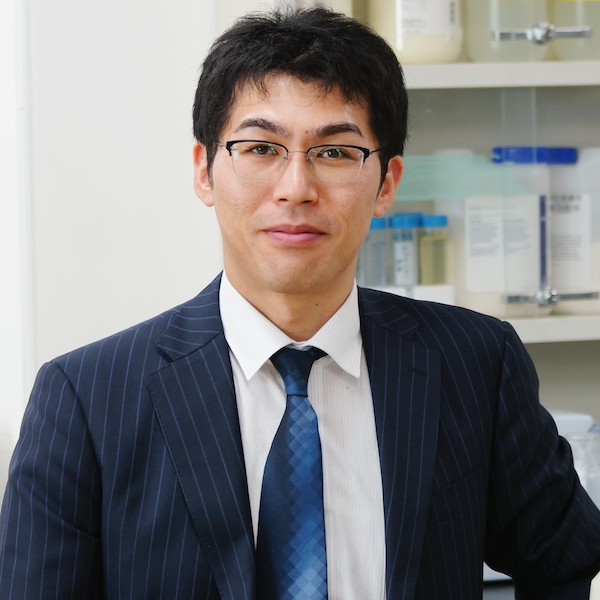
Moderator.
Hiroyuki Takahashi
Executive Officer, LIVERNESS Co.
D. from Yokohama City University in 2009. D. in Science, focusing on creating new research projects between industry and young researchers, including the launch of the "Liberace Research Fund" for young researchers under the age of 40. He has been leading the "Association of Hyperdifferent Fields" for many years since its inception, and has also been involved in the creation of places to generate research, such as the establishment of life science laboratories.
- Main hall
Session Partner The Nippon Foundation
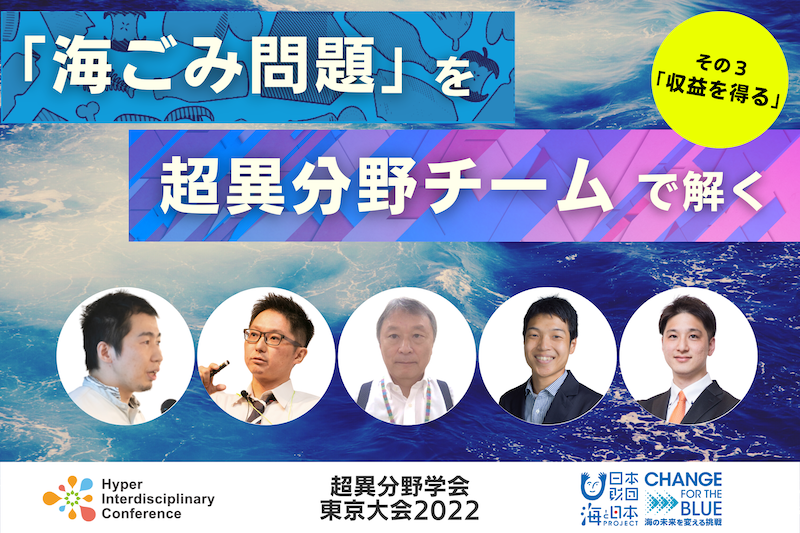
"More Information"
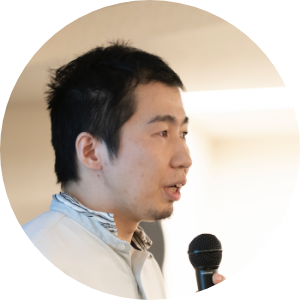
Mr. Yutaka Kudo
Representative Director, Ten no Gijutsu Co.
After graduating from Tokyo Institute of Technology with a degree in electrical and electronic engineering, he worked for a major telecommunications company, mainly in image recognition and tele-operation robotics research, as well as access network development. After working for a semiconductor equipment manufacturer and a space startup, he started StrayCats'Lab, Inc. (later renamed Ten no Gijutsu, Inc.), a space equipment development company. He was the representative organization of Debris Watchers, a project to build a satellite/drone-based litter monitoring system.
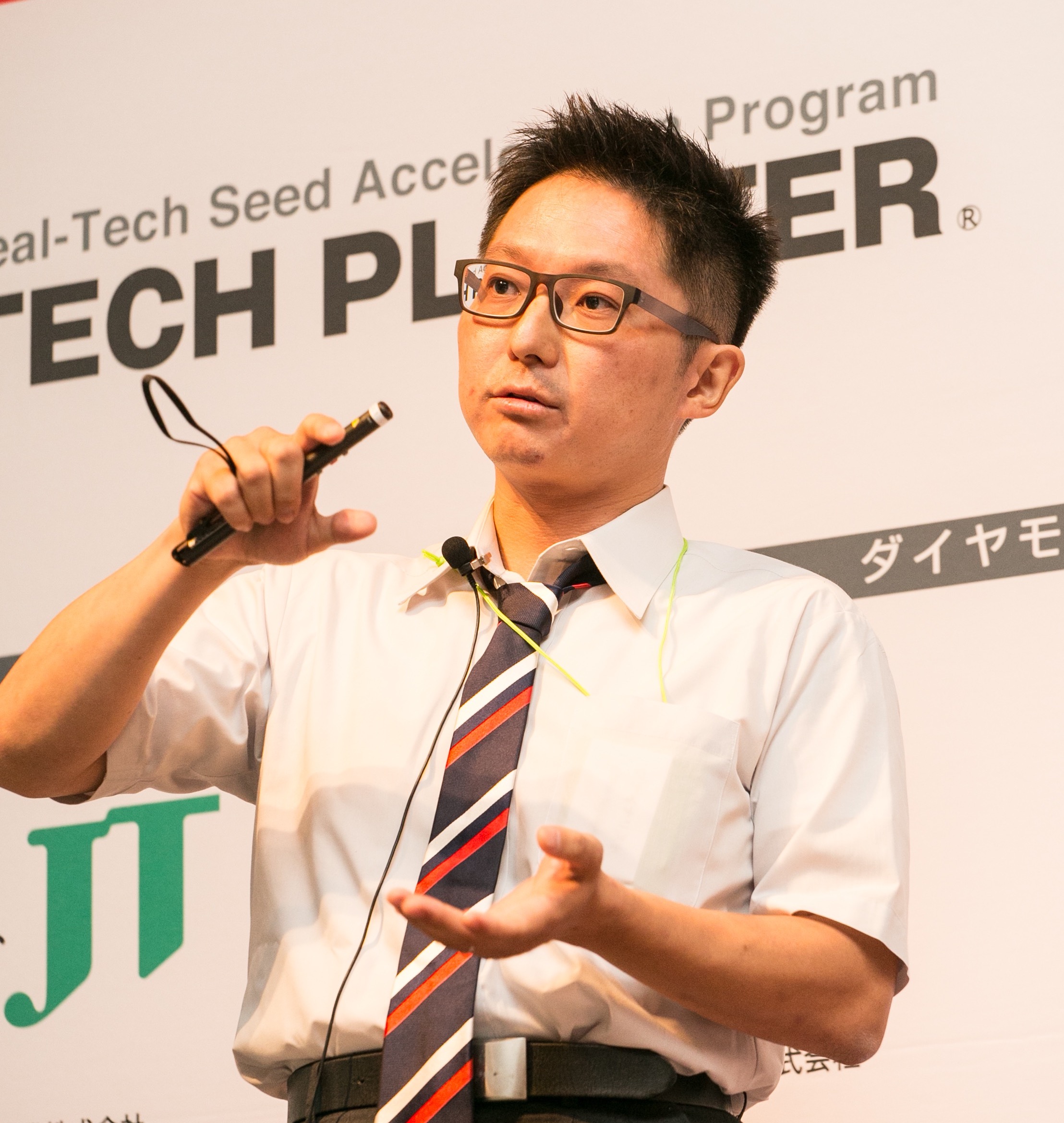
Mr. Jun Ogura
President and Representative Director, Novelgen Corporation
B.S. in Agriculture, The University of Tokyo; M.S. in Agriculture, The University of Tokyo. D. from The Graduate University for Advanced Studies. Specializes in genetic engineering, microalgae microbiology, and information biology. Professor at Nagahama Institute of Bio-Science and Technology, Nagahama Institute of Bio-Science and Technology. He founded Novelgen Corporation to solve social issues using basic research. He has developed environmental purification technology using microalgae. He is the leader of Eco Trinity in Project Ikkaku, where he is in charge of developing a biological purification system for an autonomous decentralized waste disposal system.
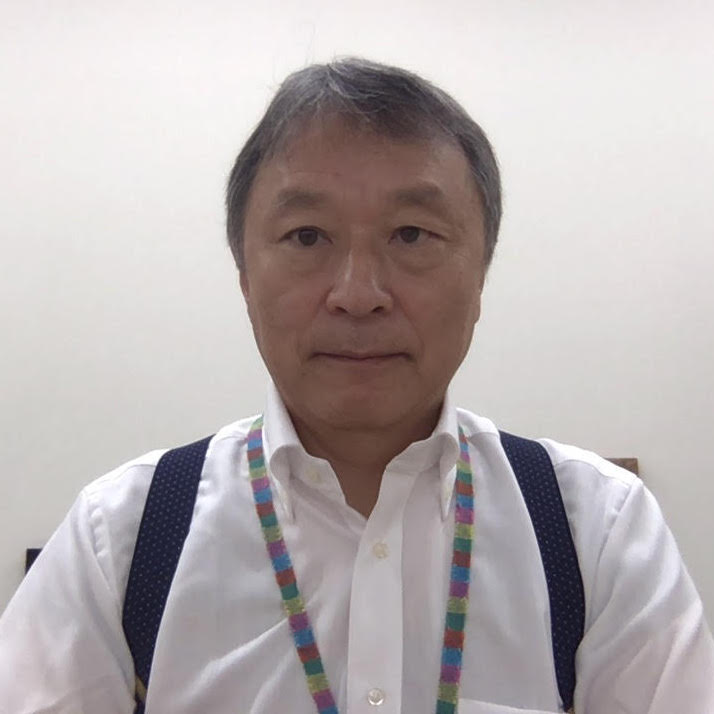
Mr. Masahiro Mitsuyama
President and CEO, Sustainable Energy Development Corporation
Graduated from Keio University, Faculty of Economics. After working for an investment bank and an auditing firm, he became the representative director of Marumitsu Sangyo Co., Ltd. and Yamagata Water and Sewage Facility Management Co. He also established a scheme (NEDO-commissioned project) with Shinjo City in Yamagata Prefecture and Nippon Paper Industries, Ltd. to convert sewage sludge generated from public sewage systems into solid fuel and sell it to coal-fired power plants, after which he established our company. In Project Ikkaku, he served as sub-leader of Eco-Trinity and promoted the development of an autonomous decentralized waste treatment system.
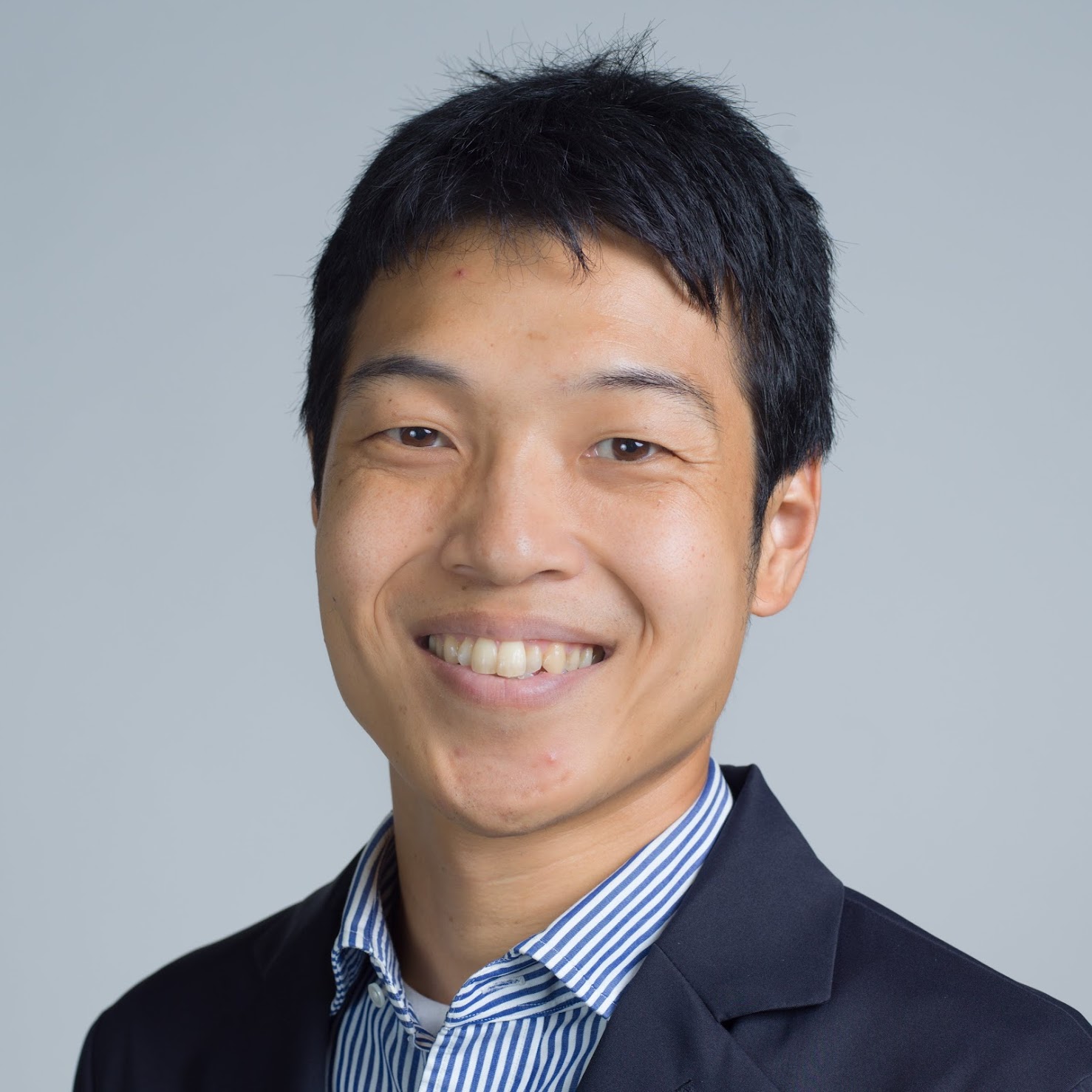
Mr. Fujio Koshima
Representative Director, Pilika Corporation
Born in Toyama and raised in Kobe. Graduated from Osaka Prefecture University (Mechanical Engineering). After taking half a year off from graduate school of Kyoto University (Energy Science), he wandered around the world. In 2011, he founded Pirika Inc. with the aim of solving the problem of "waste discharge into the natural world," which was becoming a major issue in all the countries he visited along the way. Pirika means "beautiful" in Ainu language. The company has created and commercialized new products such as "Pirika," a social networking service for picking up trash that has collected 180 million pieces of trash from around the world, "Takanome," an AI trash distribution survey system, and "Albatross," a microplastic survey device, all of which have been commercialized. All of these products have been commercialized. The company is working on a fundamental solution to the problem of litter leakage into the natural world. He is a member of Material Circulator in Project Ikkaku and promotes the development of upcycled products.
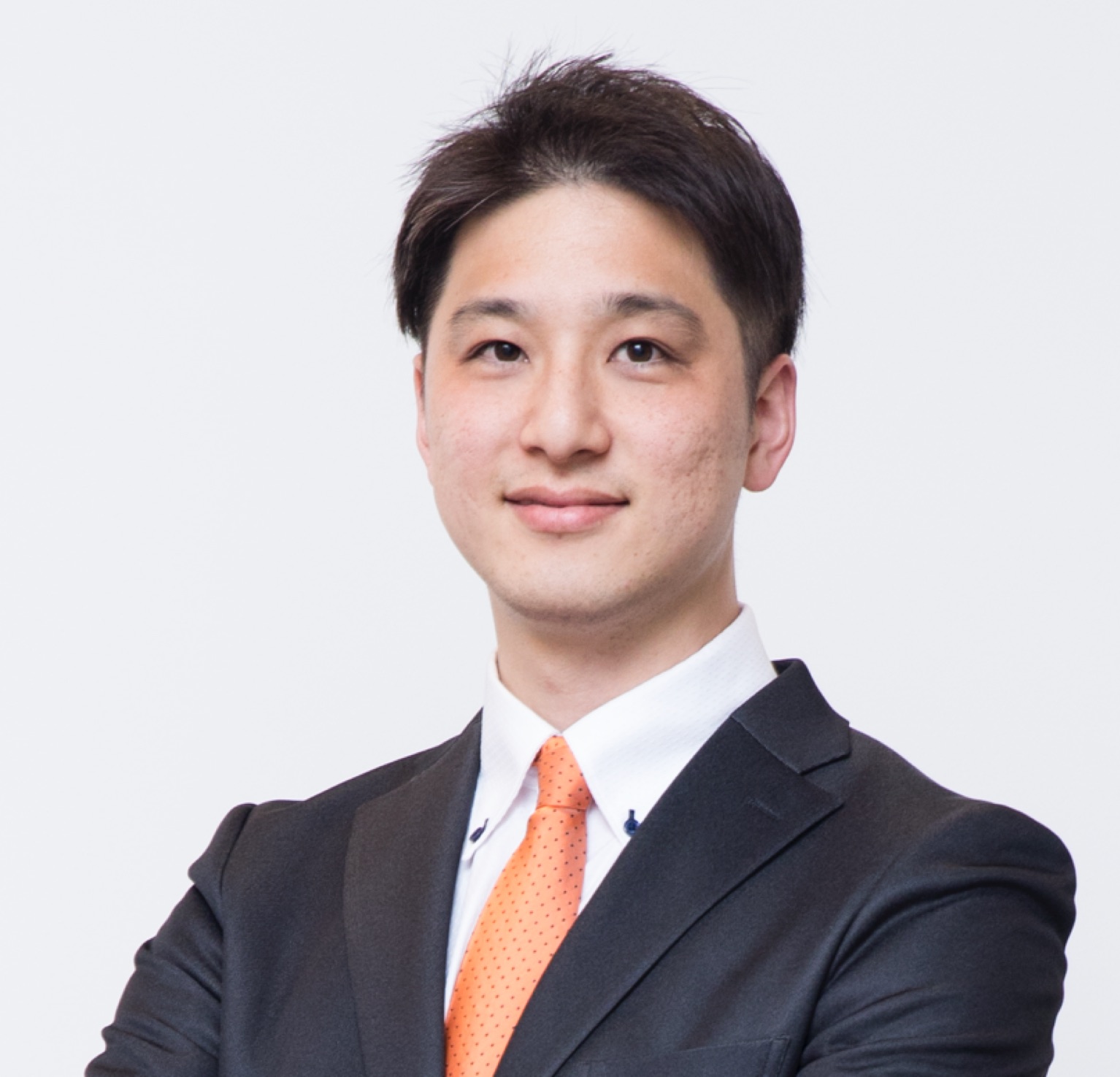
Moderator.
Yusuke Shinozawa
Executive Officer, LIVERNESS Co.
Graduated from the Graduate School of Agricultural and Life Sciences at the University of Tokyo (Master of Agricultural Science). 2008 Worked for a PR company before joining Leave a Nest in 2009. In the same year, he launched the Silicon Valley training program for graduate students, the first overseas business for Leave a Nest. 2012, he launched the media development business. 2013, he launched the seed acceleration business "TECH PLANTER". 2018, he became the head of the foundation development business. Started working on the theme of "founding a business" instead of starting a business. started Project Ikkaku in 2019. executive officer since 2021.
- Session Room A
Can Science and Technology Perfectly Copy My Family's Rice Bran Bed? Can our rice-bran paste be duplicated by science and technology?
Session Partner Kyowa Hakko Bio Co.
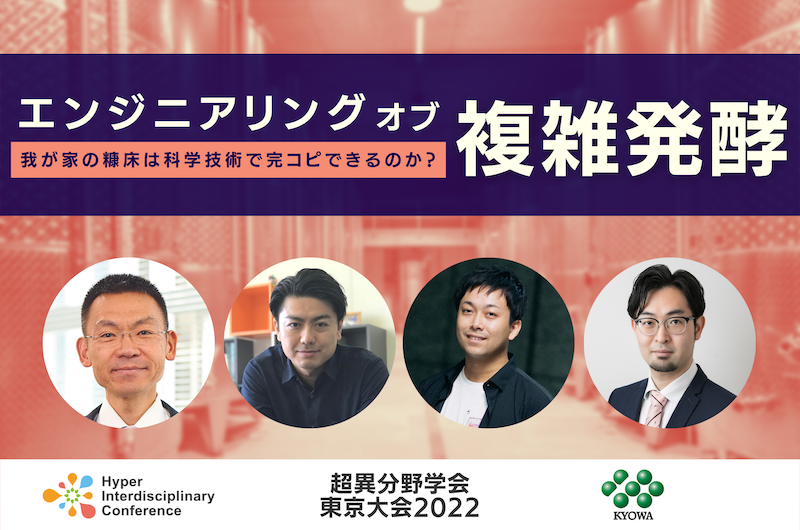
"More Information"
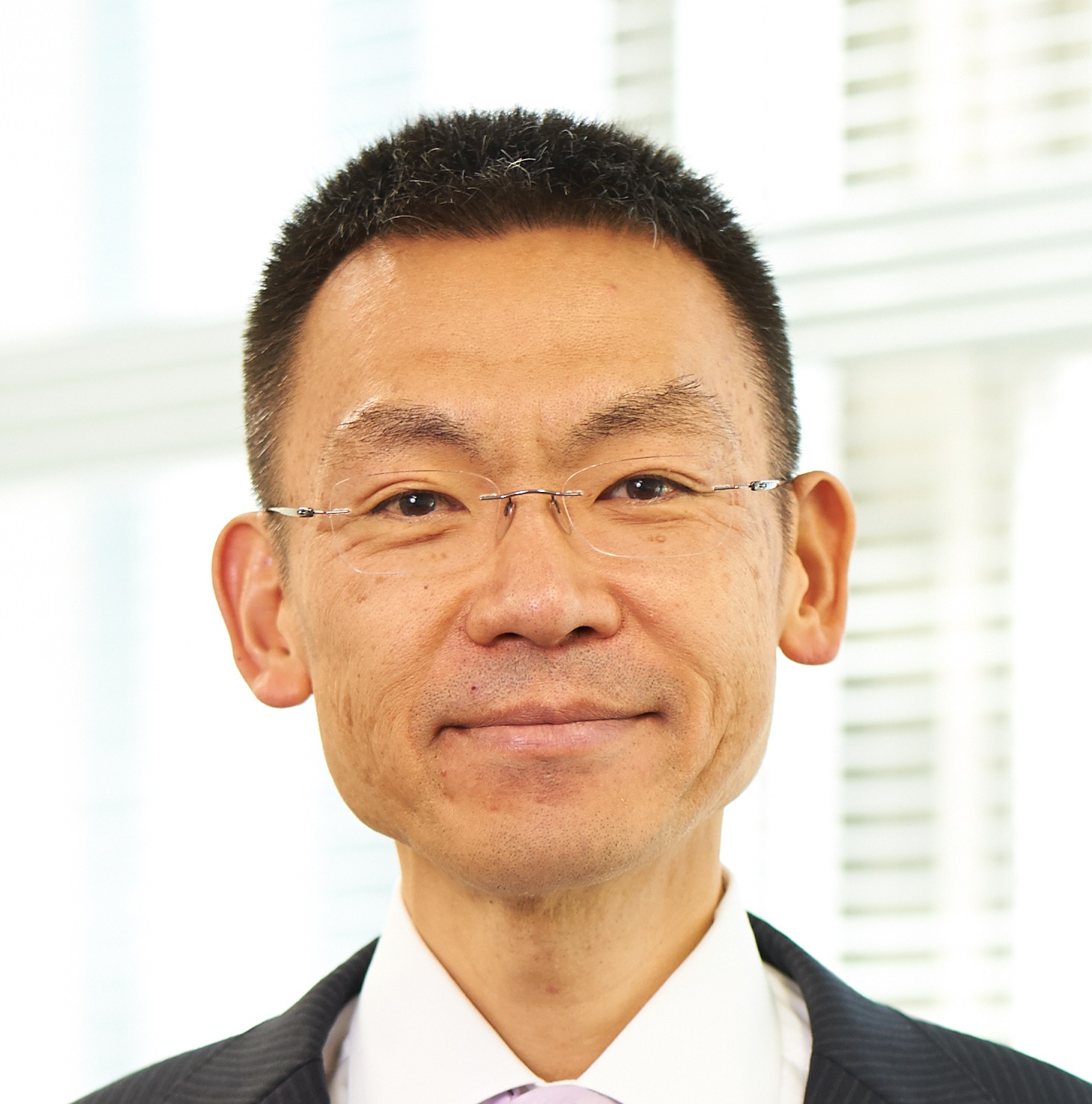
Mr. Shinichi Hashimoto
Kyowa Hakko Bio Co.
Executive Officer, General Manager of R&BD Dept.
Graduated from the University of Tokyo in 1986 with a Master's degree in Agricultural Chemistry, and joined Kyowa Hakko Industries. D. in 1998. D. in 1998, and led the world's first dipeptide fermentation technology from invention to industrialization, etc. President of Kyowa Hakko Europe in Germany from 2011 to 2014 (does not speak German), in his current position since 2014. Struggling to create technology-oriented new products and businesses. Current interests: evolutionary possibilities.
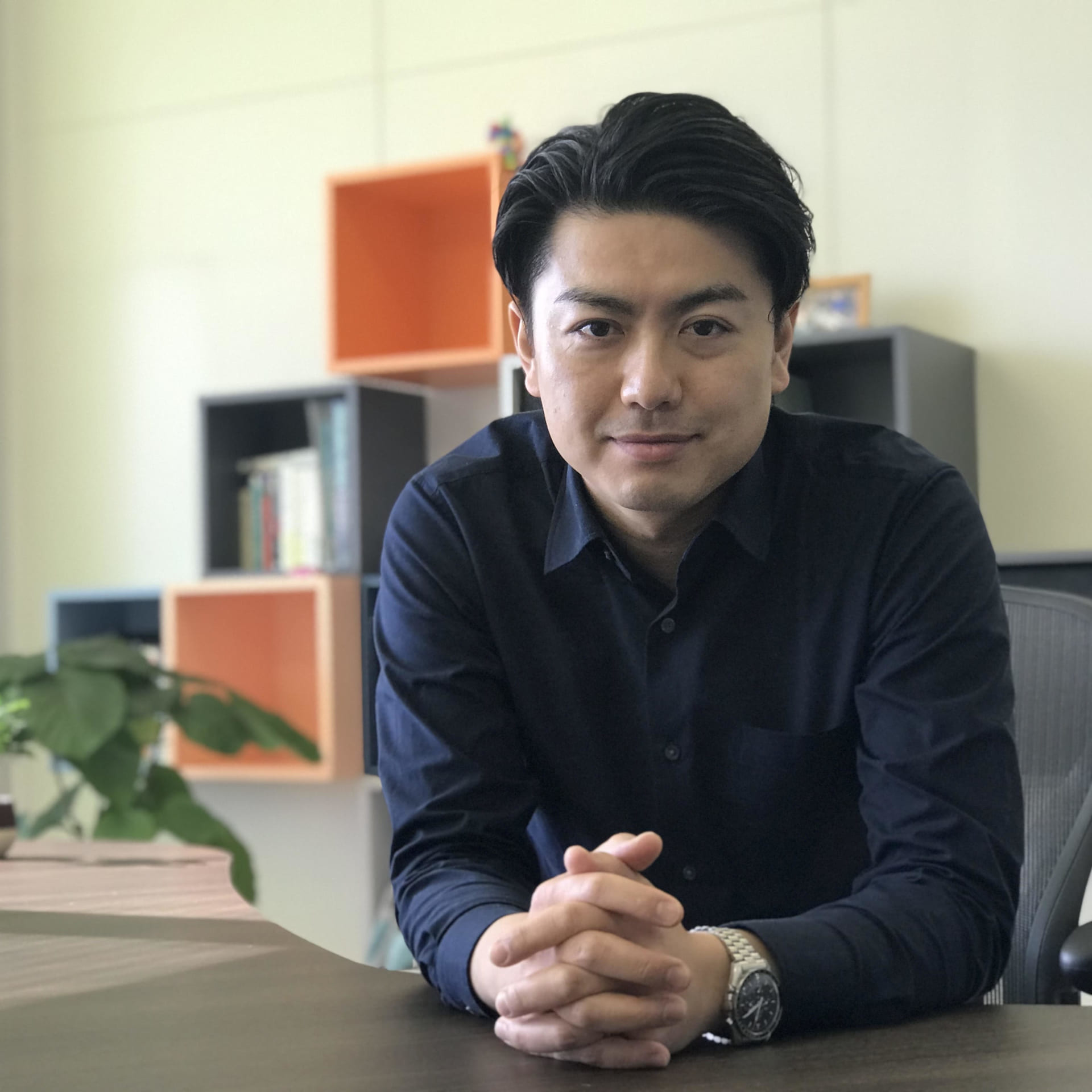
Mr. Yasunori Ichihashi
RIKEN BioResource Center
Team Leader, Plant-Microbe Symbiosis Research and Development Team
D., University of Tokyo, 2010 Postdoctoral fellow, University of California Davis, 2010 Postdoctoral fellow, RIKEN, 2014 Special Postdoctoral Fellow, RIKEN, 2016 PRESTO Researcher, Japan Science and Technology Agency, 2016 He is a team leader of the Bioresource Research Center, RIKEN, and a research representative of the Agro-Environment Engineering Research Consortium of the Strategic Innovation Program "Smart Bio-Industry and Agricultural Infrastructure Technology" (SIP phase 2), Cabinet Office, Government of Japan. He specializes in plant physiology and plant-microbe interactions.
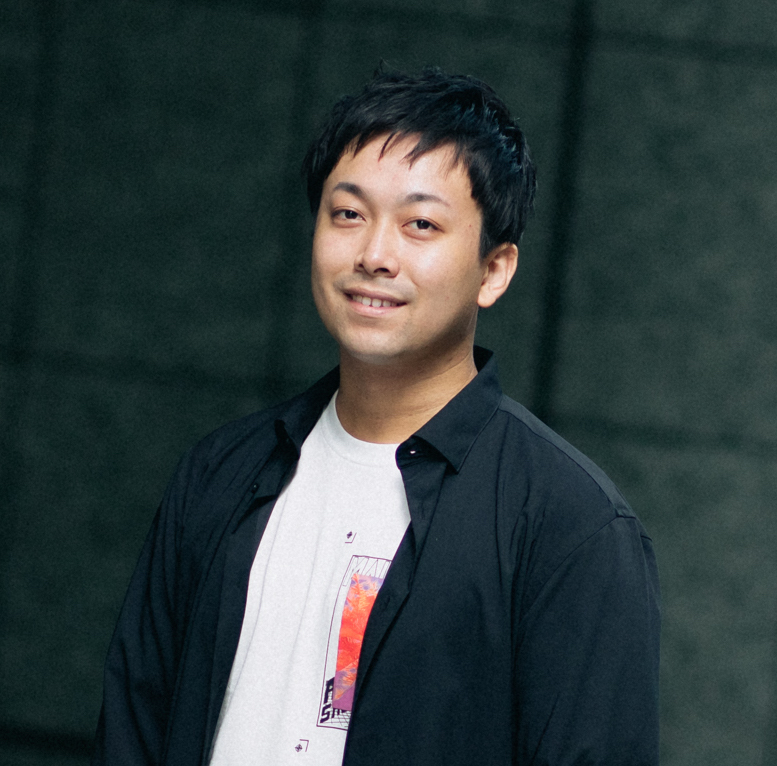
Mr. Kohei Ito
Representative Director, BIOTA Corporation
Representative Director of BIOTA Co. He has been studying the microbiome (a collection of microorganisms) since his high school days, and engaged in research using bioinformatics (information life science) for urban and built environments at the Institute for Advanced Biosciences at Keio University. After graduation, he established BIOTA Inc. and has been engaged in the business of "urban design to enhance microbial diversity.
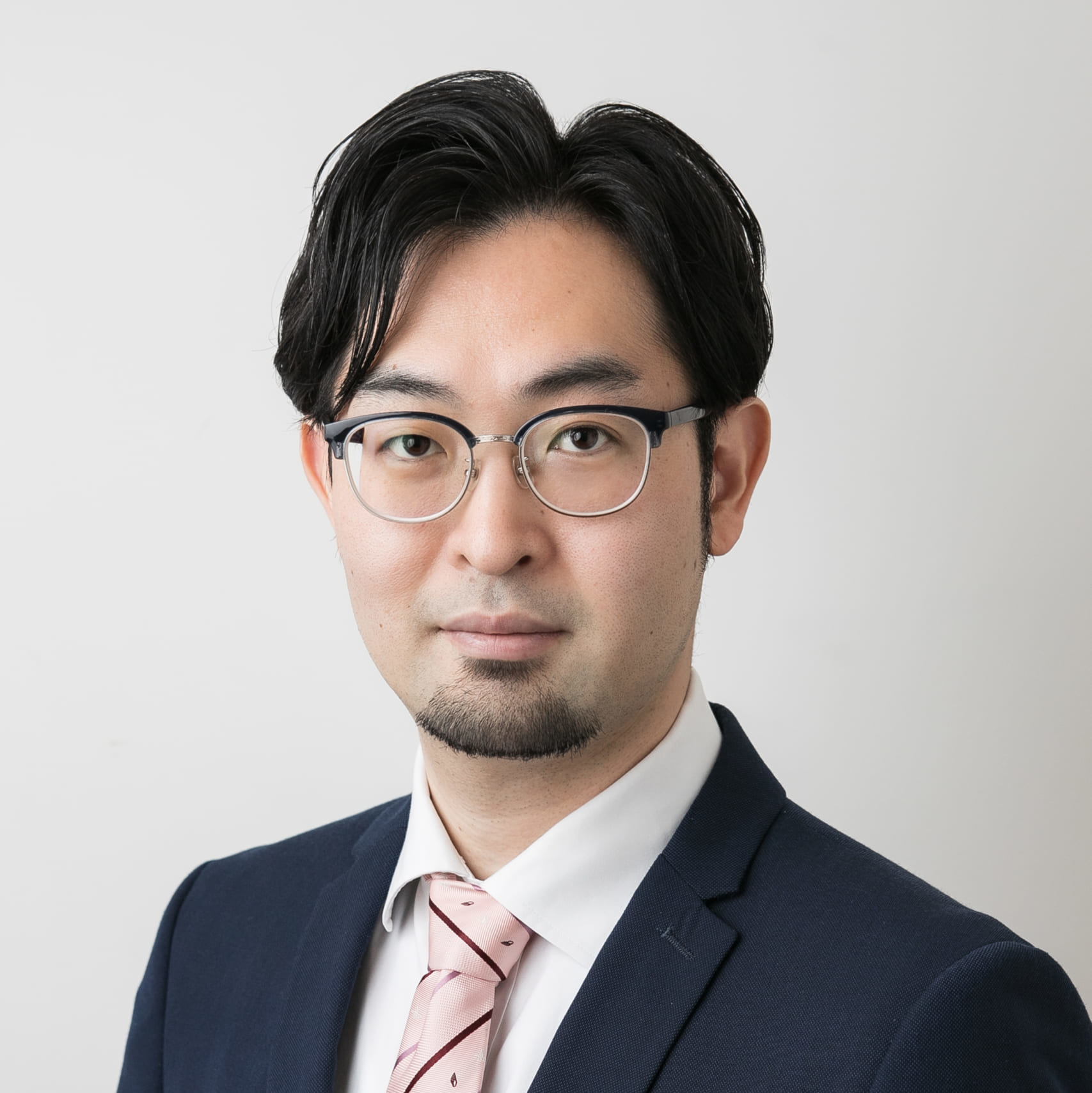
Moderator.
Ryuta Takeda
Leave a Nest Co., Ltd.
Strategic Development Division/Group Development Division
D. in 2011 after studying the structure of plant pathogens at Ohio State University. D. in 2011. After joining RIVANES, he served as the General Manager of the Human Resources Development Division and the General Manager of the International Development Division before assuming his current position as the Director of the Global Bridge Institute and Director. He has contributed to the overseas strategies of each of RIVANES' businesses, especially the development of TECH PLANTER, which discovers and nurtures university-originated deep technologies, in 10 countries. He has a wide network of key players in the overseas venture ecosystem and is currently involved in creating a place where deep issues in Southeast Asia can be solved with Japanese science and technology.
- Session Room B
Session Partner Focus Systems, Inc.
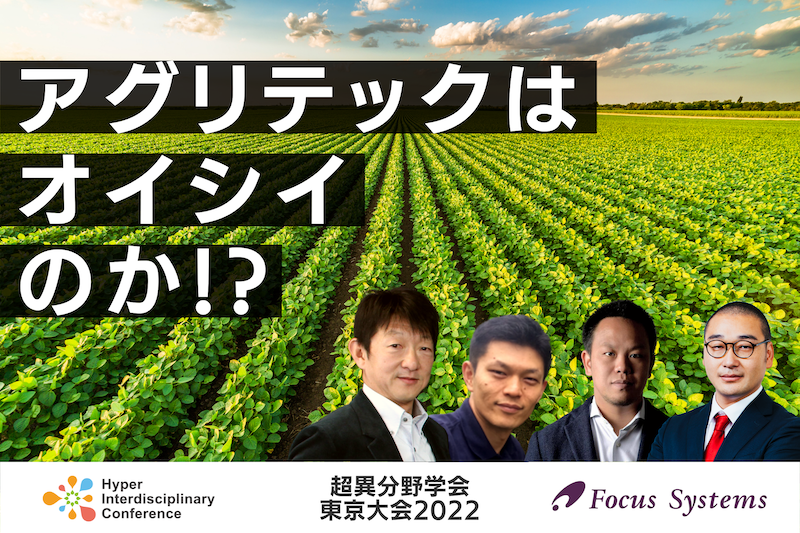
In this session, Mr. Nishioka, who has promoted the spread of agricultural sensors around the world, and Mr. Otsuka, who is developing the "Pocket Marche" platform to connect producers and consumers, will discuss what kind of framework, community, and measures are needed to connect the value of agritech to producers and beyond to consumers. The discussion will include
"More Information"
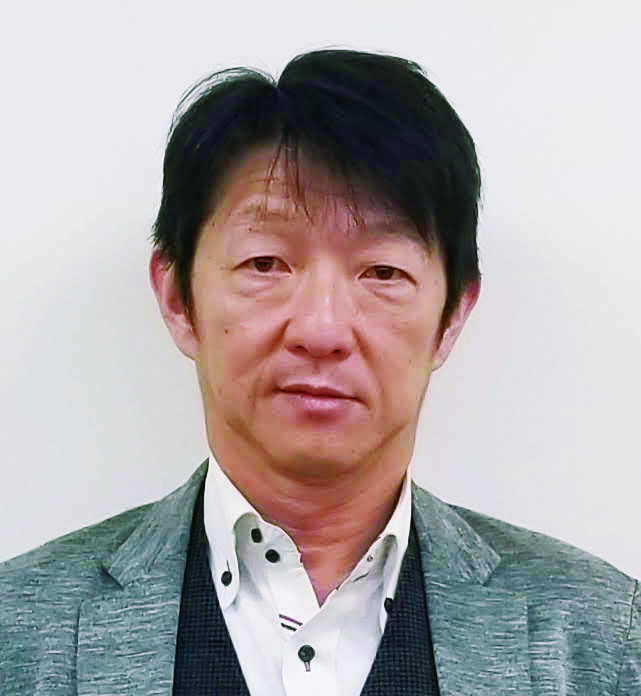
Mr. Yuji Matsuzaka
Focus Systems Co.
General Manager, Business Creation Office
He joined Focus Systems, Inc. in 1995. After working as a system development SE and IT infrastructure SE, he became a manager and then a sales manager, where he promoted the IT service business by collaborating with major customers, developing business plans, and making proposals. Currently, he also serves as the head of the Business Creation Office and is engaged in activities to create new businesses by building relationships with startup companies and university research laboratories. Most recently, he has been involved in the establishment of a new company for research and development of VR/AI, joint research with Nagoya Institute of Technology, and the creation of a business that utilizes drones.
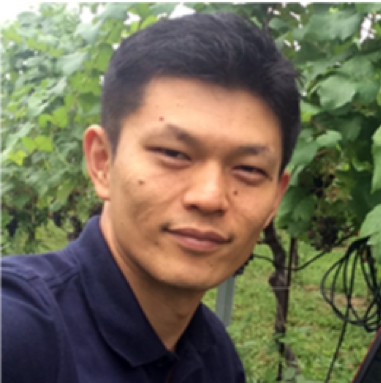
Mr. Kazuhiro Nishioka
President and Representative Director, Kisvin Science K.K.
He developed a low-cost sap flow sensor that measures the flow rate of sap sucked up by plants from their roots, and founded a venture company at the University of Tokyo to promote its use in the agricultural scene. At the same time, he has served as an advisor to several agri-tech ventures. His love of wine led him to organize Team Kisvin, a viticulture research group, 17 years ago in Yamanashi, where he has been involved in winemaking. He has been engaged in cultivation consulting both domestically and internationally.
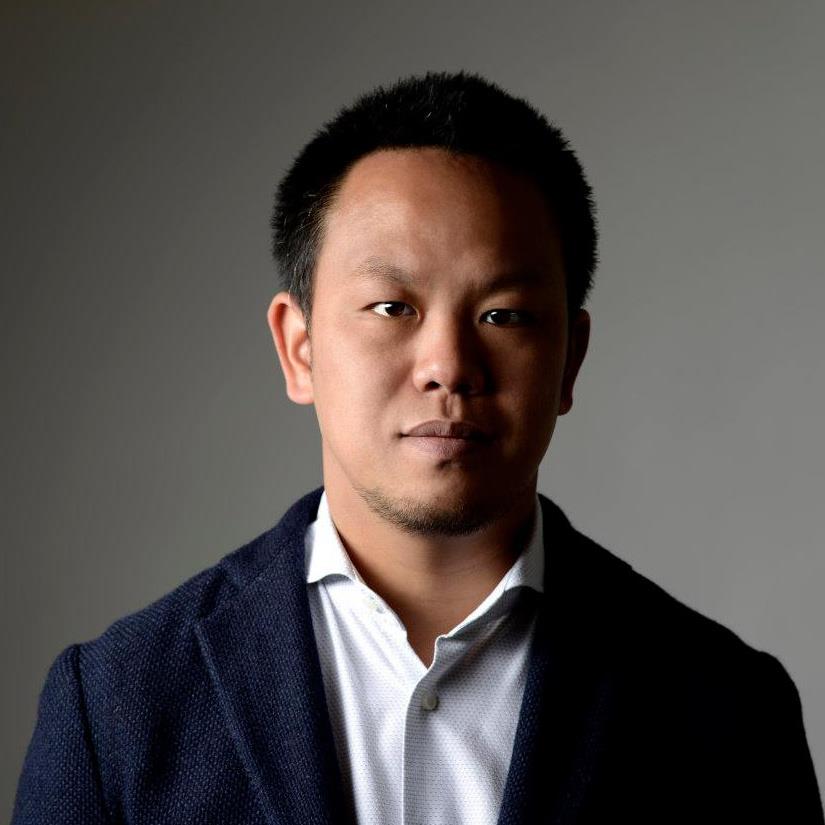
Mr. Taizo Otsuka
Director and General Manager of President's Office, Pocket Marche Co.
Upon graduating from university, he started his own business and launched a number of web services. Ten days after exiting the company, the Great East Japan Earthquake struck. He established a Tohoku-based NPO and published the Tohoku Recovery Newspaper. In 2013, he published "Tohoku Eat Tsushin," an information magazine with food ingredients, and in 2015, he moved to Silicon Valley and founded KAKAXI, Inc. In 2021, he returned to Japan and is currently in charge of management strategy and new business of Pocket Marche, Inc.
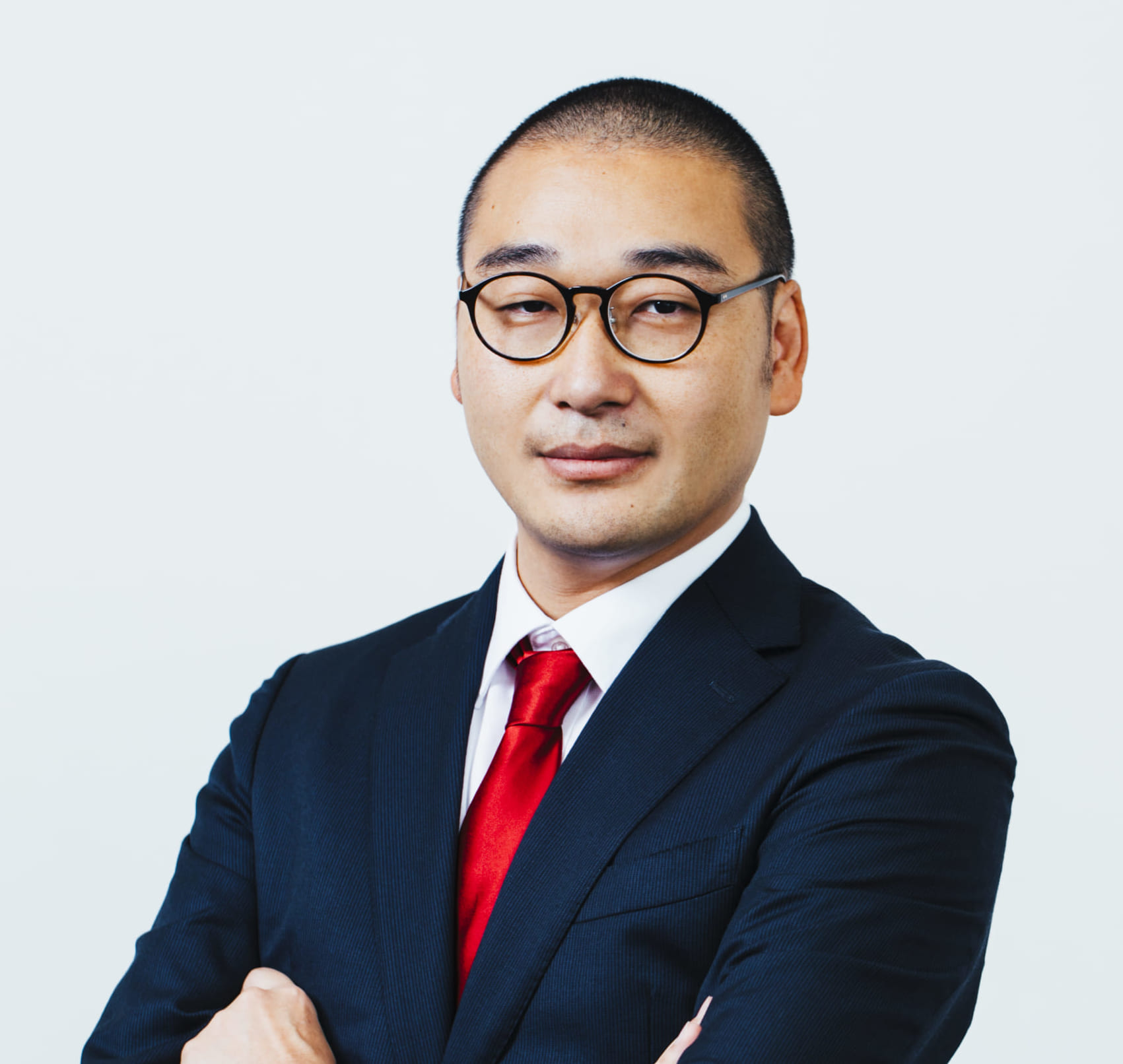
Moderator.
Shuichiro Takahashi
Representative Director, President and COO, Liverness, Inc.
D. (Life Sciences), Graduate School of Frontier Sciences, The University of Tokyo. He has been involved in RIVANESS since its establishment. After completing his graduate studies, he continued his research activities as a faculty member at the University of Tokyo, while at the same time he established a research institute at RIVANESS and built the foundation of its research and development business. He devised the business model of "Liberness Research Grant," a unique research grant, and "L-RAD," a database of unutilized research ideas, and has initiated many open innovation projects involving industry, academia, and education.
- Main hall
Award Ceremony and Special Lecture
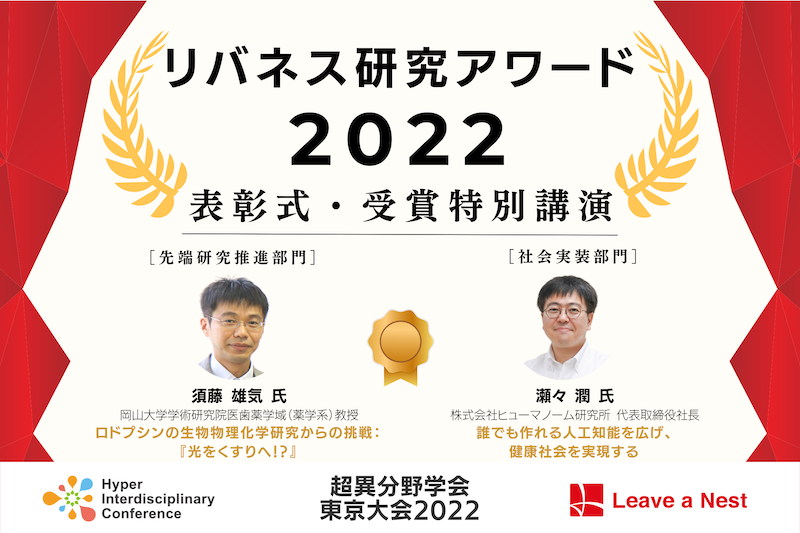
[Selection Perspectives]
A researcher who is passionate about his/her research, conducts original research, and is expanding the boundaries of his/her own research, and who can serve as a role model for the next generation of researchers.
[Section]
Advanced Research Promotion Division: Promoting original research that has an impact on science.
Social implementation category: The applicant must be making a remarkable contribution to entrepreneurship or social implementation based on the results of research.
"More Information"
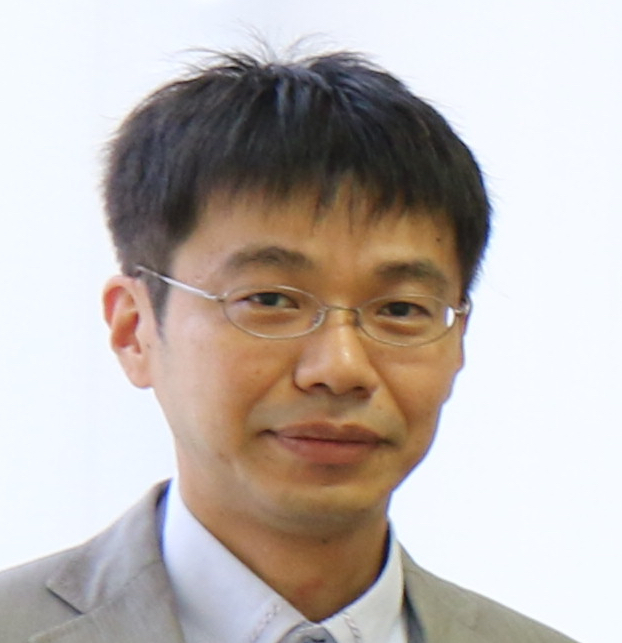
[Advanced Research Promotion Division]
Mr. Yuki Sudo
Professor, Faculty of Medicine, Dentistry and Pharmaceutical Sciences, Okayama University
Award Special Lecture
Challenges from Biophysical and Chemical Studies of Rhodopsin: "Light to Drugs!
Received the 9th LIBERNESS Research Fund Rebox Award (2011)
D. in Pharmaceutical Sciences from the Graduate School of Pharmaceutical Sciences at Hokkaido University in 2000 (during this period, he was a special research student at the Graduate School of Bioscience and Biotechnology, Nara Institute of Science and Technology (NAIST) from 2002 to 2003), and a postdoctoral fellow at the Graduate School of Engineering, Nagoya Institute of Technology and the University of Texas at Houston from 2005, Assistant Professor, Graduate School of Science, Nagoya University (2007-2008), Associate Professor, Graduate School of Science, Nagoya University (2008-2012: JST PRESTO Researcher), Professor, Graduate School of Medical, Dental and Pharmaceutical Sciences, Okayama University (currently, Faculty of Medical, Dental and Pharmaceutical Sciences, Okayama University) (2014)
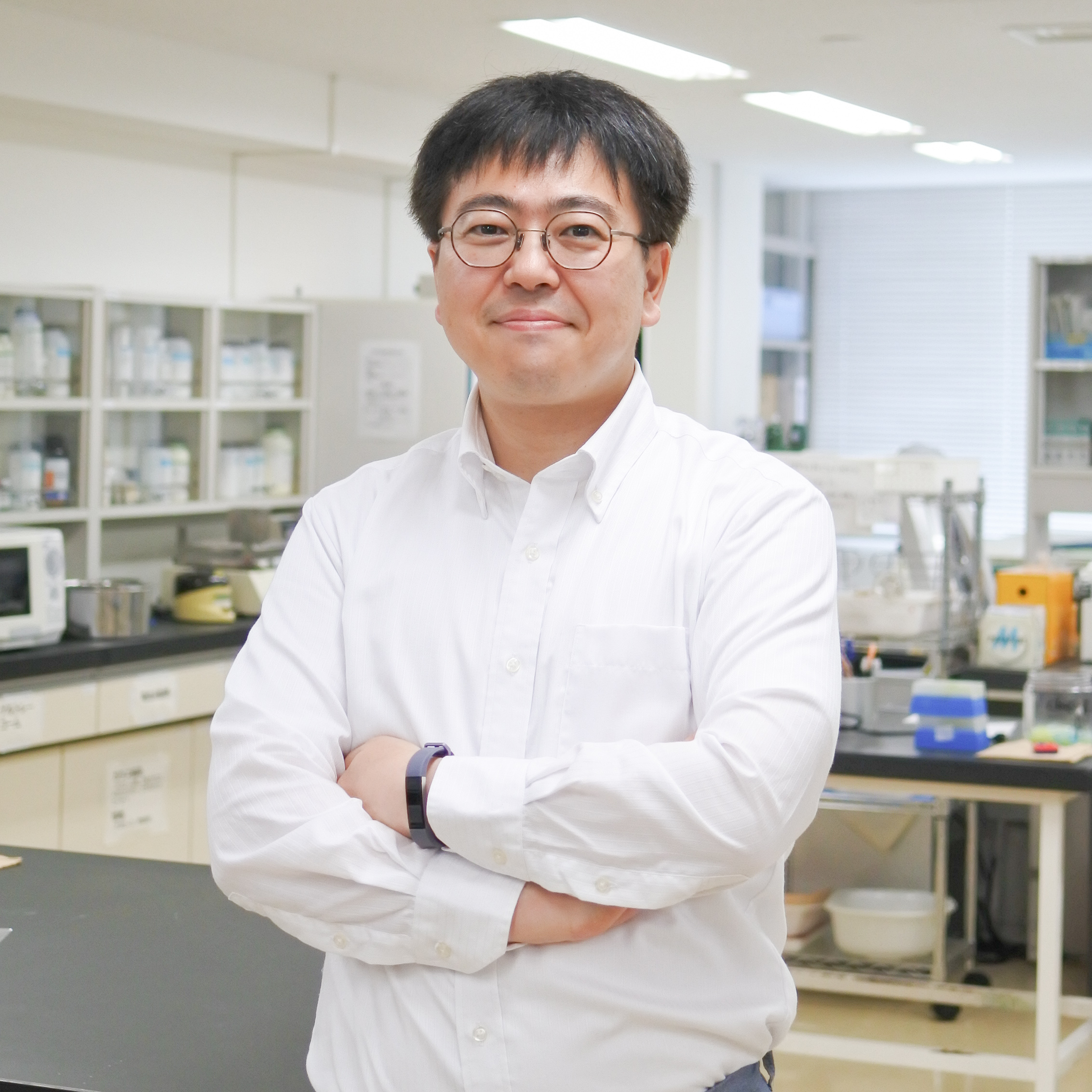
[Social Implementation Division]
Mr. Jun Zeze
President and Representative Director, Humanome Research Institute, Inc.
Award Special Lecture
Expanding Artificial Intelligence that anyone can create to achieve a healthy society
Awarded the 1st Riverness Research Funded Riverness Award (2009)
D. in Science. D. in Science. He has served as Assistant Professor at the University of Tokyo, Associate Professor at Ochanomizu University, Associate Professor at Tokyo Institute of Technology, and Research Team Leader at the National Institute of Advanced Industrial Science and Technology (AIST). He specializes in the development of machine learning and mathematical statistics methods, as well as large-scale data analysis in the life sciences. He won the KDD Cup 2001, a data mining contest of the American Society for Computing Machinery, and the Oxford Journals-JSBi Prize.
Saturday, March 5, 9:30 - 18:20
- Main hall
- Main hall
Technology Splash."

"More Information"
Presenters (as of February 16, 2022)
| order of presentation | belong to | identity | Title/Theme |
| 1 | Vantec Ltd. | Tetsuya Inokuchi | Centrifugal separation solves the problem of livestock manure! |
| 2 | Keio University | Yuya Enbara | Elucidating the Mechanisms of Sleep Deprivation-Induced Alteration of Immune Responses |
| 3 | Graduate School of Science and Engineering, Doshisha University | Kohei Okuda | Composite of chemically modified cellulose and hydroxyapatite for development of high toughness biomass materials |
| 4 | University of Tokyo | Kosei Yoshikawa | Analysis of human flow around ticket gates |
| 5 | Tokyo University of Technology | Takumi Sato | Carnosic acid from rosemary may inhibit COVID by two pathways |
| 6 | Osaka University | Shih, Hong-ju | Rare metal-free room temperature phosphorescent materials for sustainable OLED devices |
| 7 | (1)National Institute of Radiological Sciences, (2)Chiba University | Koide, Koji(1), Natsume, Yuhei(2) | Proposal for experimental teaching materials to see the light tunneling effect (evanescent phenomenon) |
| 8 | NPO Daichi | Tomofumi Obata | Distance Rehabilitation Support Based on Behavior Analysis with Operant Behavior of Children and Caregivers - Toward Industry-Academia Collaboration Connecting Parents, Supporters, Specialists, and Government -. |
| 9 | Muroran Institute of Technology | Koji Uei | Development of functional food for dementia prevention using ingredients produced in Shiranukan Town, Hokkaido |
| 10 | Waseda University | Rie Nitta | The relationship between differences and discrepancies in body clock rhythms and differences in nutritional intake for each diet. |
| 11 | Yuge Merchant Marine Technical College | Kotaro Mori | Development of a portable power generation system combining a rocket stove and a Stirling engine |
| 12 | Osaka University | Ryota Akai | Creation of innovative organic semiconductor materials for next-generation devices |
| 13 | Fish Biotech, Inc. | Toshiko Tanaka | Changing the world through land-based aquaculture |
| 14 | International University of Health and Welfare | Nobuhiro Watanabe | Distance care support based on behavior analysis centered on the child and caregiver's responder response. |
| 15 | Kyushu University | Makoto Tokunaga | Controlling the Aroma of Alcoholic Beverages with Supported Gold Nanoparticles |
| 16 | Kyoto University Graduate School | Naoto Toyoda | Approaching the Evolutionary Origins of the Human Face! ~Quantitative Studies of Facial Cranial Morphology in Primates~. |
| 17 | Setagaya Gakuen Junior & Senior High School | Daichi Watanuki | Potential of Tokyo Bay red tide diatom as an alternative feed material for fishmeal |
| 18 | Osaka University Graduate School | Takahiro Ami | All-organic porous material for selective separation of greenhouse gases |
| 19 | The University of Tokyo | Daichi Yanagisawa | Yoshinoya Agent Simulation |
| 20 | Gunma University | Kei Suzuki | Estrogen, a sex hormone, triggers osteogenic cell differentiation and substrate calcification |
| 21 | Tohoku University | Kosuke Hiromori | Proposal for a self-supporting energy-efficient electrolysis system for the treatment of oil and grease wastes. |
| 22 | Kyushu University of Health and Welfare | Norito Takamura | Medication instruction using ADME dolls (puppets) and other uses and strategies for worldwide dissemination |
| 23 | Plant Kikou Co. | Abe Naka | Expanded development and sales of microgrid baseloads that use renewable energy |
| 24 | BIOTA inc. | Kohei Ito | Creating sustainable and healthy spaces designed in symbiosis with microorganisms |
| 25 | National Institute for Materials Science | Takeshi Imamura | Sensor to measure odor |
| 26 | JSC Technology Corporation | Iku Sato | Development and commercialization of innovative energy-saving technologies for data centers |
| 27 | Science Farm Corporation | Masami Otsuka | Molecularly targeted deodorant for age-related odors |
| 28 | Gifu University Graduate School | Shunya Nagasobe | Development of highly functional materials using the world's first "Anaerobic" technology |
| 29 | Ashirase Corporation | Ryohei Tokuda | Development of "Ashirase" walking navigation system for the visually impaired, quantification of attention resources |
| 30 | Easpe.inc | Tomohiro Hiratsuka | Monitoring system for rehabilitation facilities to visualize children's growth |
- Poster and booth
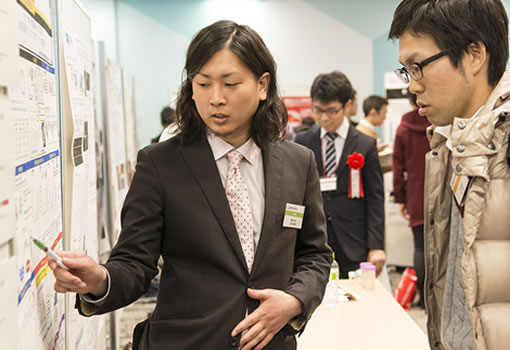
- Main hall
What is "behind the door of healthy longevity" as seen in different fields and big data analysis
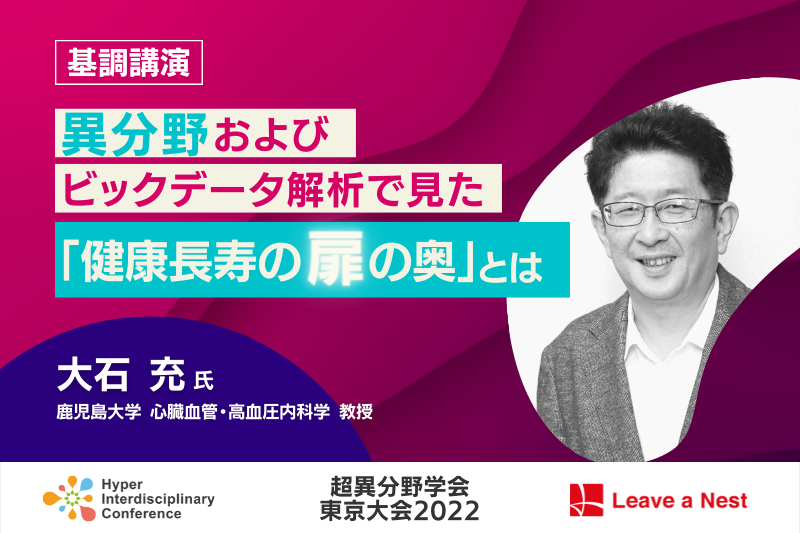
Japan has the world's highest population aging rate (the ratio of people aged 65 and over to the total population) of approximately 30%, and is said to have the fastest aging population in the world. One of the fastest aging areas in the world is Tarumi City in Kagoshima Prefecture. Under these circumstances, a project was launched in 2009 with a team of many specialists, including dentists, pharmacists, nutritionists, insurance professionals, psychologists, occupational therapists, and physical therapists, to conduct a thorough analysis of each elderly person over a long period of time. Mr. Oishi, who himself specializes in cardiovascular and hypertension internal medicine, has a central role in this project as a supervisor.
In this keynote presentation, Mr. Oishi will discuss his research that opens the door to "healthy longevity" as revealed by analyzing health data for 1,000 people in Tarumi City via various disciplinary perspectives.
"More Information"
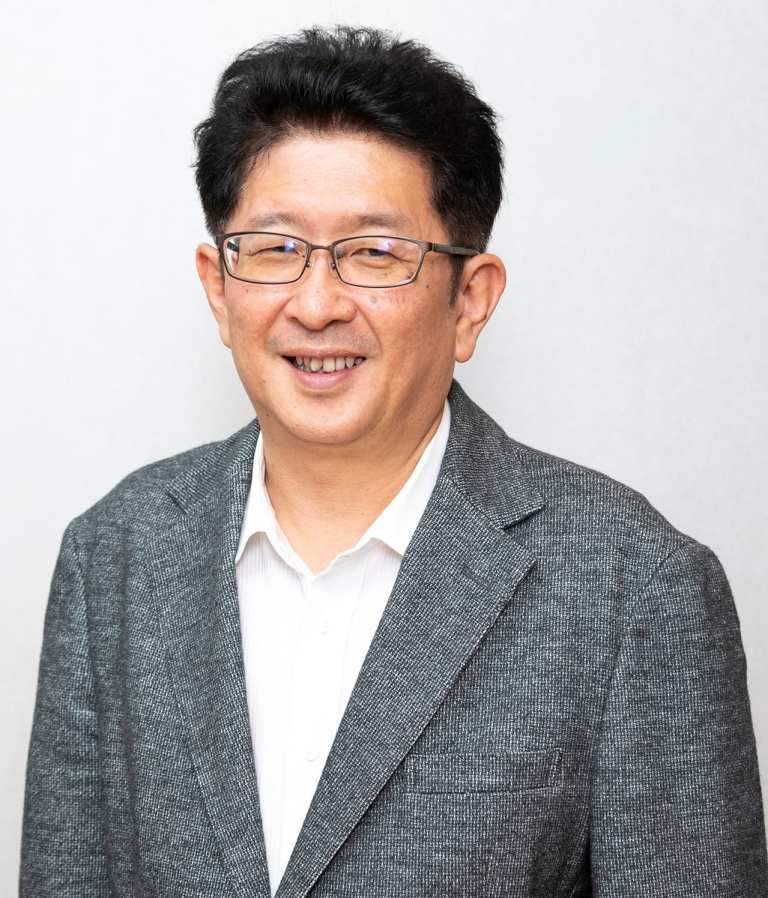
Mr. Mitsuru Oishi
Professor, Department of Cardiovascular and Hypertension Medicine, Kagoshima University
Graduated from Osaka University School of Medicine in 1990, and worked in cardiovascular emergency and cardiac catheterization since 1991. 1995 returned to the 4th Department of Internal Medicine, Osaka University, and then to the Department of Pathology, Osaka City University to conduct research on atherosclerosis. 1997 to 2 years of study at the Howard Florey Research Institute, Australia. After working as a lecturer at the Department of Geriatrics and Nephrology, Osaka University, he became a professor at the Department of Cardiovascular and Hypertension Medicine, Kagoshima University in 2013, where he has also served as deputy hospital director since 2015. He is conducting three cohort studies and 30-year health checkup data analysis for 1 million people in Kagoshima in collaboration with industry and academia.
- Main hall
From Container Transport to Bipedal Walking. Center-of-Gravity Detection Theory Extended to Different Fields
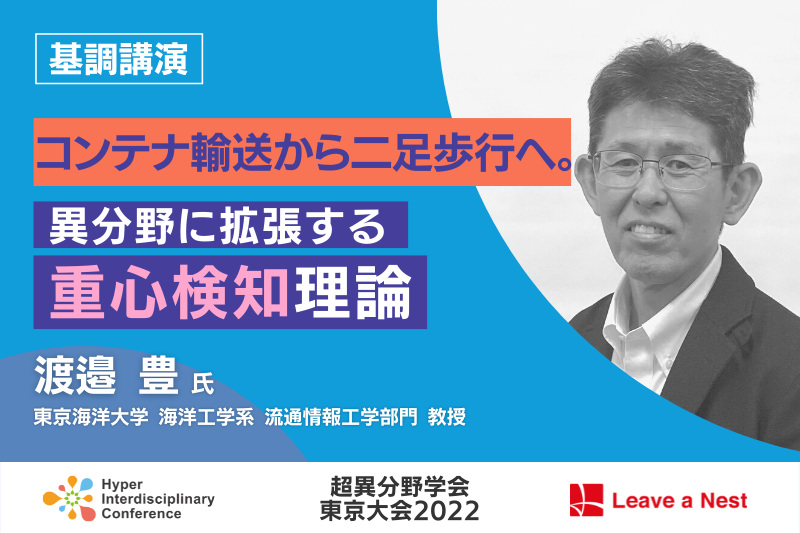
Trucks transporting containers of the same size require different driving styles, even though they look the same. Since the condition of the cargo inside the container affects the truck's overall center of gravity, the speed limit for turning varies depending on the position of the center of gravity, sometimes leading to unexpected tipping over accidents. To address these issues, Mr. Watanabe has conducted research to detect the state of moving objects and prevent tipping over, and has discovered the three-dimensional center-of-gravity detection theory. This technology has been implemented and utilized in port logistics.
This theory was born from the idea that it might be applicable to a moving object such as a human being, and the collaboration between different fields was born to counteract fatigue and heat stroke of civil engineering workers. The human center-of-gravity detection theory, which was developed for human walking, can capture the degree of swaying of a person while walking, which may not be apparent at first glance, and evaluate it as the degree of fatigue. It is expected to be useful in managing the physical condition of physical workers, for example, by encouraging them to take appropriate breaks before they reach the limit of collapse. This theory, which focuses on the position of the center of gravity and views the human being as a spring structure, is also useful in terms of why it is possible for people to walk naturally on two legs with good balance, and is expected to be further developed into new areas through collaboration with various different fields.
"More Information"

Mr. Yutaka Watanabe
Professor, Department of Distribution and Information Engineering, Tokyo University of Marine Science and Technology
D. in Engineering from the University of Tokyo in 1993, a visiting researcher at the Royal Chalmers University of Technology in Sweden in 1994, and an associate professor at Tokyo University of Marine Science and Technology in 2004, D. in Engineering from Tokyo University of Marine Science and Technology in 1993. He is a leading researcher on international logistics and port logistics, exploring logistics systems that combine environmental, safety, and security concerns with economic efficiency.
- Main hall
Session Partner Euglena Co.
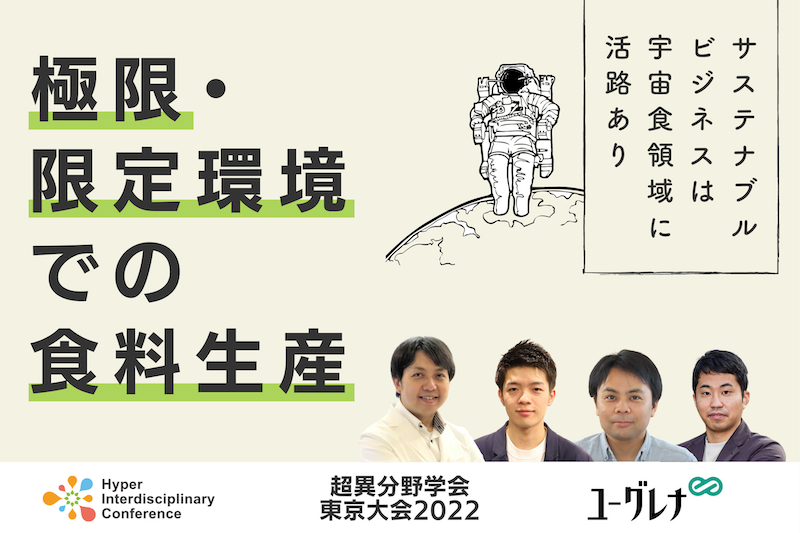
"More Information"
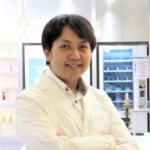
Moderator.
Mr. Kengo Suzuki
Executive Officer, CTO, Euglena Co.
D. (Agriculture)/Ph.D. (Medicine), was involved in the establishment of Euglena Co., Ltd. in 2005 while a student at the University of Tokyo, where he was one of the co-founders and responsible for research and development up to the present. He is mainly involved in the development of technologies related to the mass cultivation of Euglena, a type of microalgae, and received his PhD (Agriculture) from the University of Tokyo in 2016 and his PhD (Medicine) from Kitasato University in 2019. He is currently a team leader of the Microalgae Production Control Technology Research Team at RIKEN, a Visiting Professor at Universiti Teknologi Malaysia-Japan International Institute of Technology, and a Specially Appointed Professor (Visiting) at Tohoku University Graduate Program for Excellence in Future Medical Care Creation.
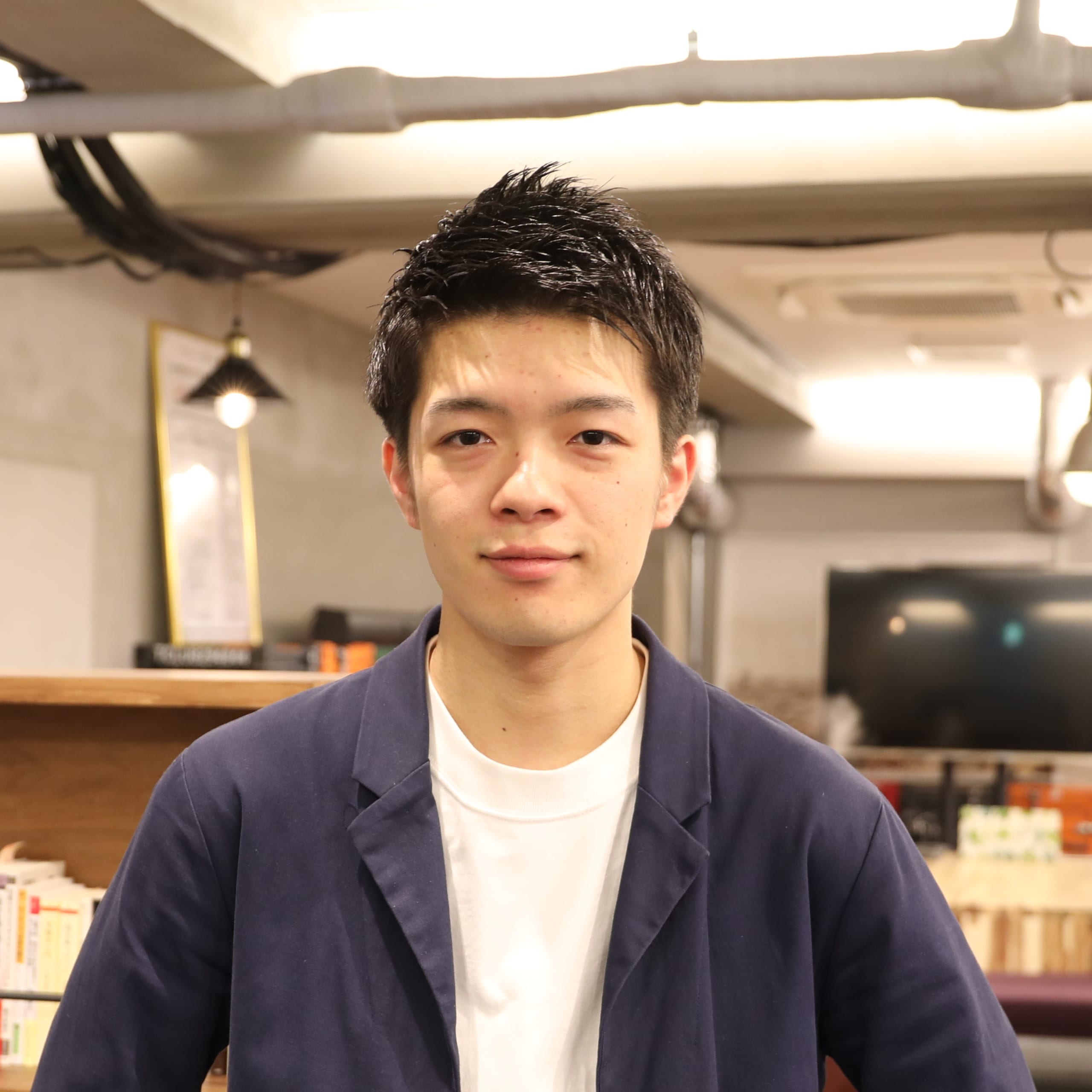
Mr. Ryohei Kobayashi
Representative Director / CEO, ElevationSpace Inc.
Born in Akita Prefecture in 1997. While a student at Akita National College of Technology, he encountered space architecture at the age of 19, which changed his life. After graduation, he transferred to Tohoku University and majored in architecture and space engineering. While a student at Tohoku University, he was involved in satellite development projects and research on next-generation space architecture, winning first place in Japan and second place in the world for space architecture. He also founded the Tohoku Space Community, aiming to revitalize the Tohoku region through space. After interning at several companies including space ventures, he started ElevationSpace Inc. in collaboration with an associate professor at Tohoku University. He has received awards in various programs and contests, including the Next Innovator program sponsored by the Ministry of Economy, Trade and Industry (METI) and JETRO.
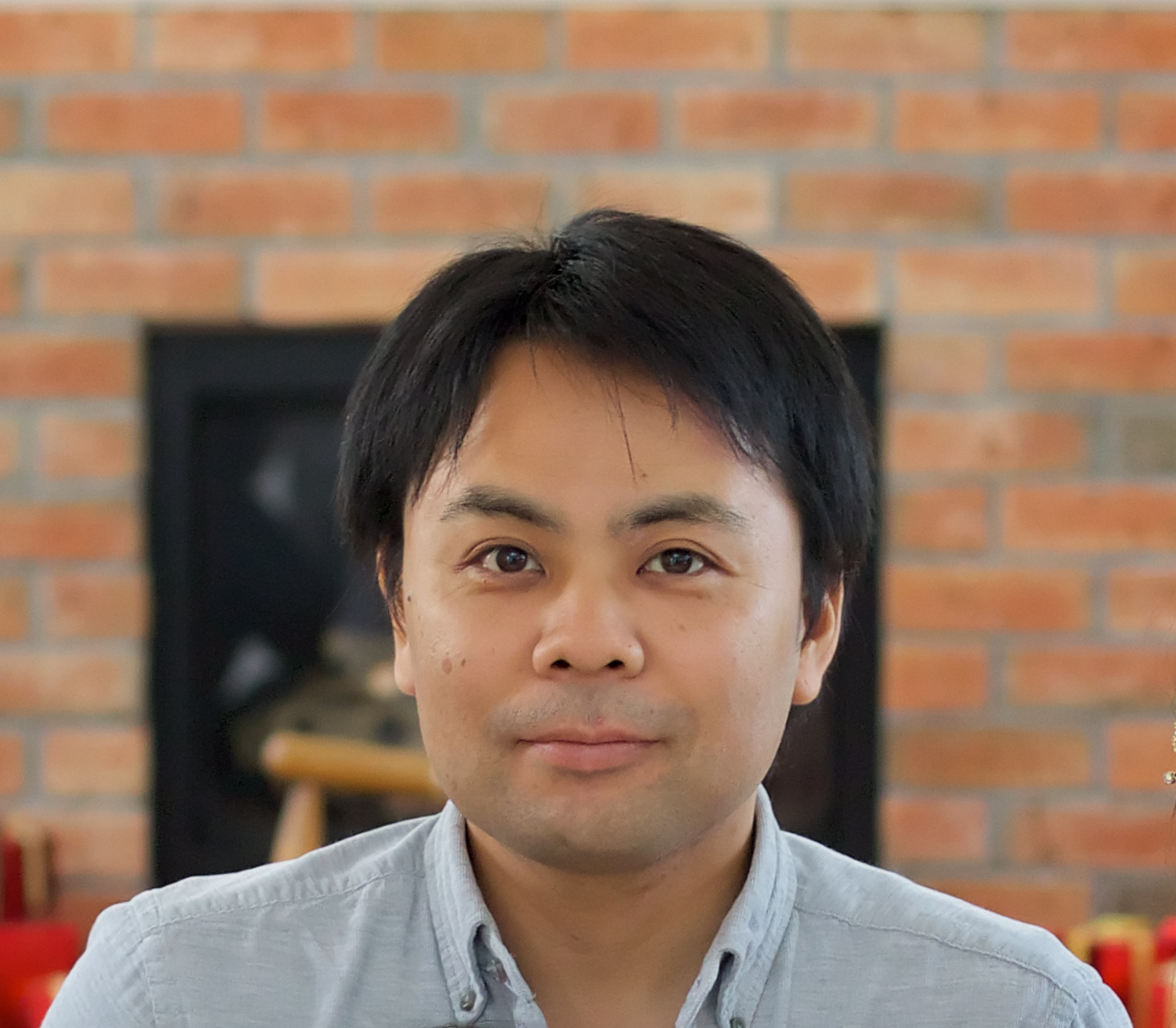
Mr. Toshiro Maekawa
Takasago Electric Industry Co.
Leader, Life Science Group, New Business and Innovation Promotion Team
D. (Health Sciences), Graduate School of Health Sciences, Kitasato University. His areas of specialization include biochemistry and molecular cell biology. After completing graduate school, he worked on research and development projects in the field of regenerative medicine at the Graduate School of Medicine, Shinshu University. He joined Takasago Electric Industry in 2019. He is a Life Science Group Leader. He is expanding the scope of his activities in the life science and aerospace fields as a new business. He is promoting a beer brewing device project in space.
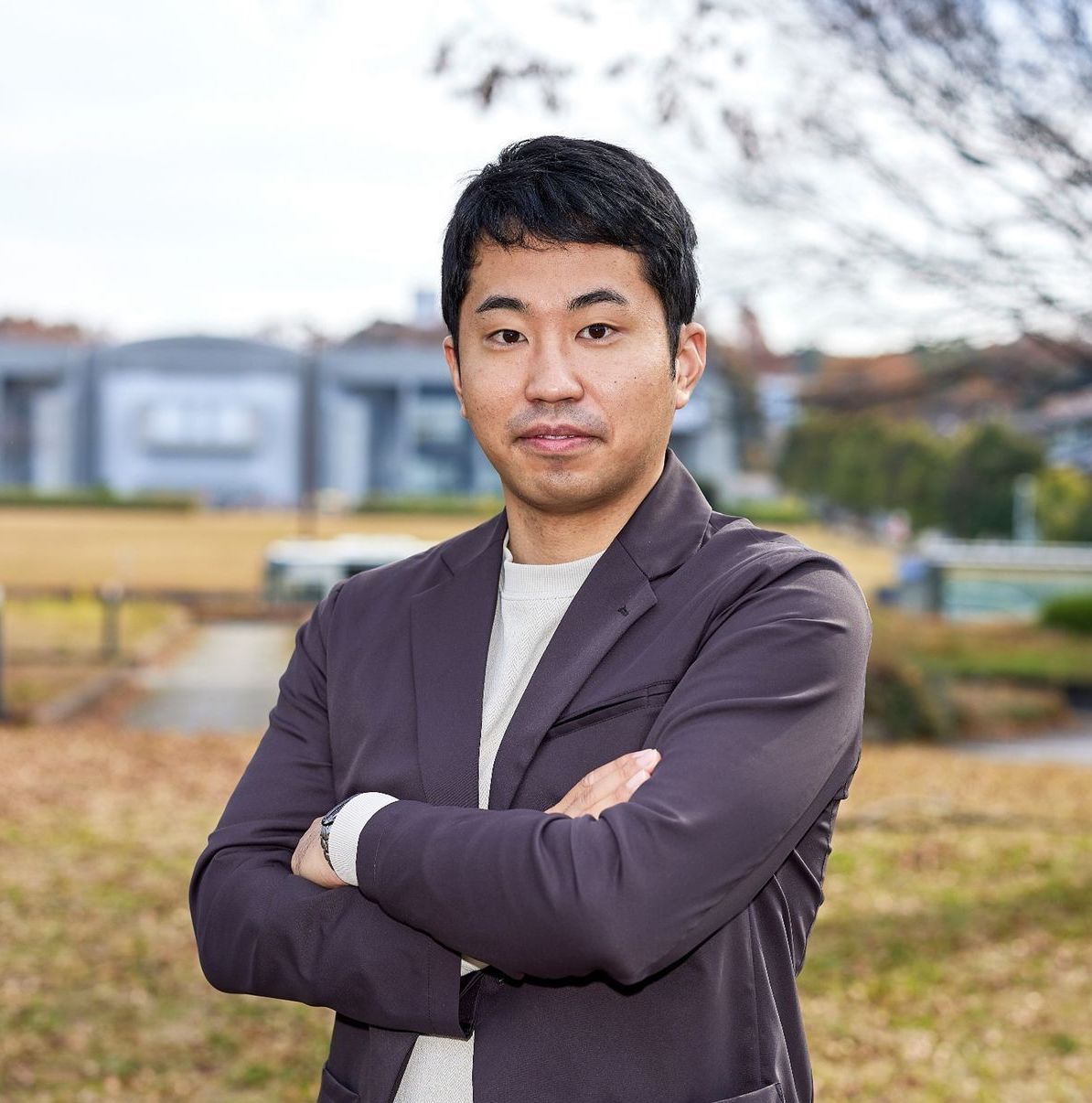
Mr. Kohei Nishida
CEO, TOWING Co.
Born in December 1993. Born in Shiga Prefecture, Shigaraki Town. Graduated from the Graduate School of Environmental Studies, Nagoya University. Studied agricultural machinery and soil science at the same graduate school. After that, he joined Denso Corporation, where he was involved in the design of automobile parts. While working for Denso, he founded TOWING Co. with his younger brother as a side business. He aims to implement the technology he learned at the graduate school in society, and to create a future in which we can eat fresh crops directly from the fields, which he used to eat as a boy, both on earth and in space.
- Session Room A
- How to visualize the "hard-to-explain important things."
Session Partner Ikeda Rika Corporation
powered by Career Design Research Center / Education Research Center
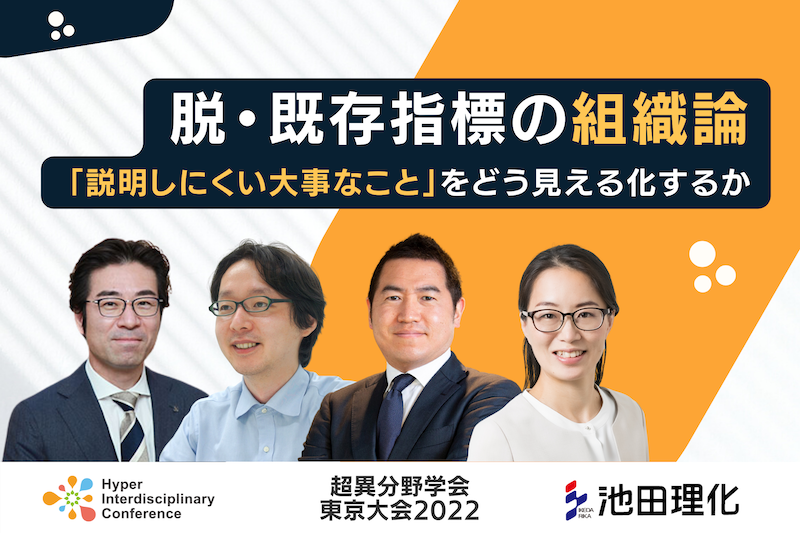
"More Information"
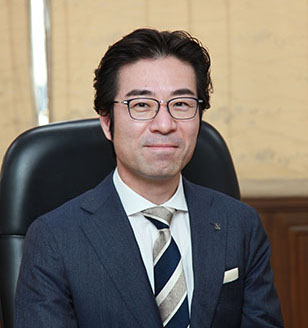
Mr. Hideo Takahashi
President and Representative Director, Ikeda Rika Co.
Born in Gunma Prefecture in 1974. Graduated from Gunma University, Faculty of Social Informatics. 7th EMP student at the University of Tokyo. Currently a master's student at Keio SDM. Worked for Chiyoda Corporation, Arthur Andersen, and Sanyo Electric Co. He has been a board member of Tokyo Scientific Instruments Association since 2016. In addition to business operations (sales of research equipment and other products for laboratories in industry and academia), he started the Rivanes Ikeda Rika Award in 2014 to support young researchers. 2016, he co-participated in L-RAD, an open innovation promotion project. He is the author of "Introduction to Organizational Value Management" (2002). His hobbies include mountain climbing and walking with his dog.
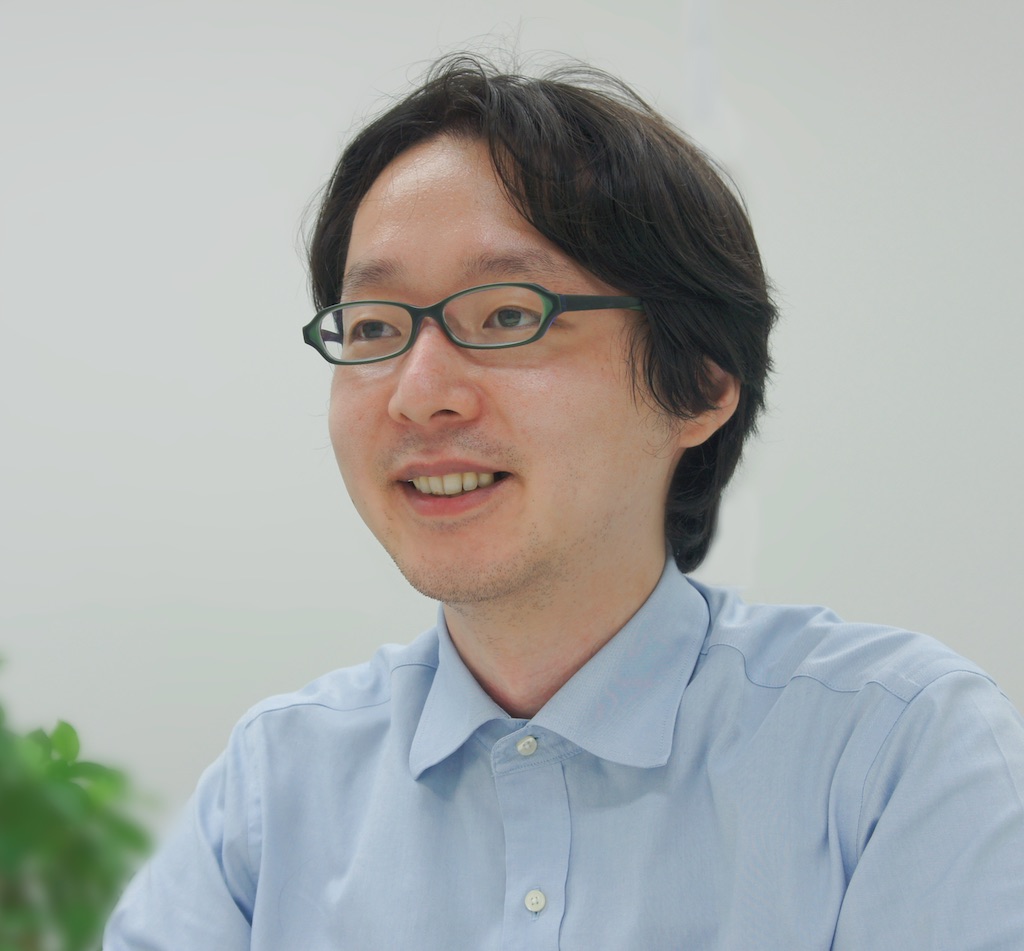
Mr. Takeshi Mizumoto
Representative Director, HiLable, Inc.
D., Graduate School of Informatics, Kyoto University, 2013. D. (Informatics). Engaged in research on frog chorus and robot ensemble. In the same year, he joined Honda Research Institute Japan, where he worked on sound research. 2016, he founded and became the president of HiLable, Inc. He provides visualization services for face-to-face and web conferencing discussions. He has analyzed more than 30,000 conversations, mainly for school and corporate training programs. He received the 17th Japan e-Learning Award from the Minister of Health, Labor, and Welfare, among others.
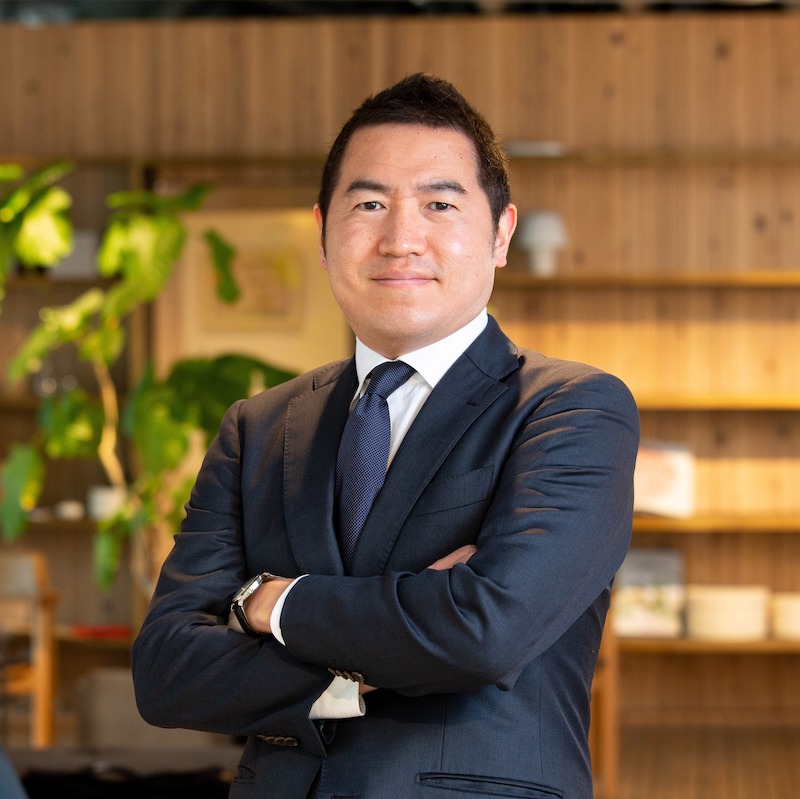
Mr. Takahiro Hirano
Sigmaxis Corporation
Director of Management Transformation (MX)
Engaged in management consulting at Corporate Directions and Management Co-Creation Foundation. At Akindo Sushiro (restaurant), he was in charge of new business development projects, human resource development, and business planning, and at Bears (housekeeping service), he was in charge of business operations. After joining Sigmaxyz, he led consulting on management platform reform (organization and leadership structure, management process, HR system, etc.). His life's work is the art of "learning, working, and earning. His hobby is philosophy.
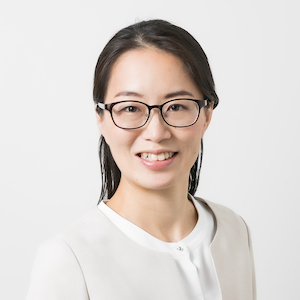
Moderator.
Satoko Tachibana
Director, Career Design Research Center, Riverness, Inc.
Life Sciences (M.S.). While studying microalgae in graduate school, she participated in an internship program at the dawn of RIVANESS to convey to children the fascination of living creatures that have both diversity and universality. After completing her graduate studies, she worked for Z-kai, Inc. as a creator of science teaching materials for junior high and high school students before joining RIVANES. In 2019, she moved to human resource development and continues to support former junior and senior high school student researchers who have grown into PhDs. At the Career Design Research Center, he researches new ways of working and creating organizations for people who generate knowledge out of their own curiosity and awareness of issues, as typified by researchers.
- Session Room B
Session Partner Aoxintec Inc.
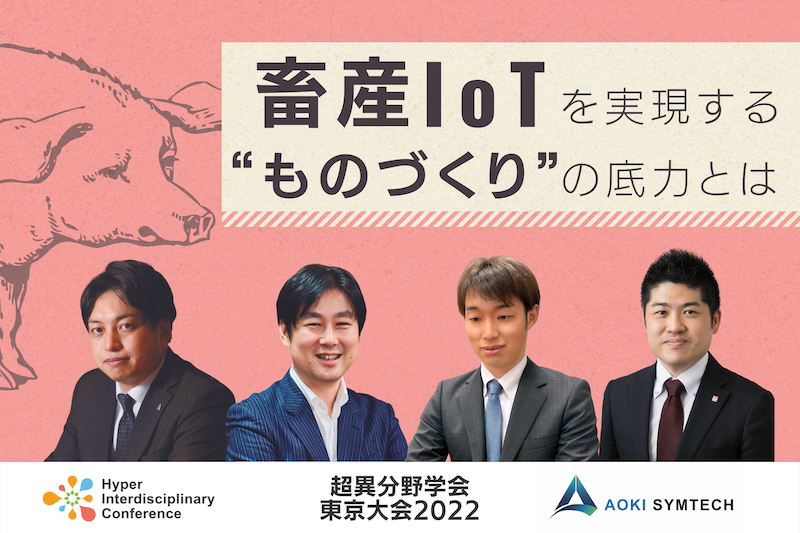
"More Information"
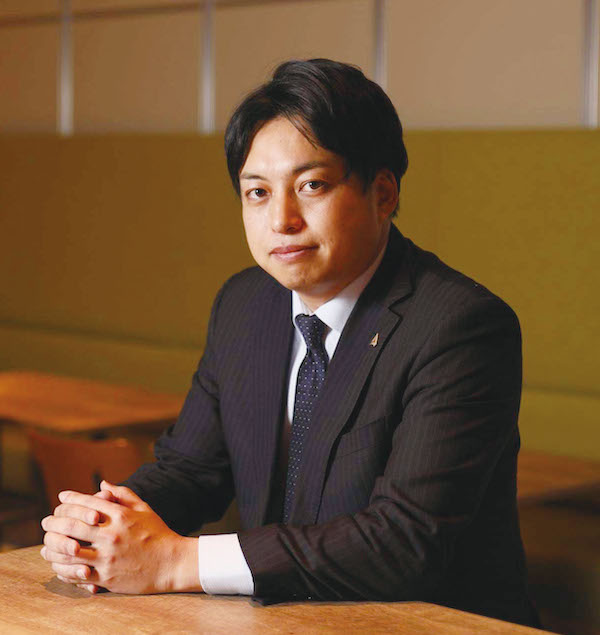
Mr. Keita Aoki
Aoxintec Corporation
Founder & CEO
Born in 1980 in Moka City, Tochigi Prefecture. After graduating from Moka Technical High School, he went on to Teikyo University. After joining Aoki Seisakusho (now Aoxintec), he was involved in all aspects of production, and contributed to sales expansion and sales growth. 2011, he succeeded his father, the founder of the company, as Representative Director. He operates Garage Tochigi as a member of the RIVANES SUPER FACTORY Group, which gives shape to the enthusiasm and ideas of venture businesses. With the management philosophy of "taking on the challenge of a symbiotic manufacturing industry," he aims to create manufacturing that will change the world by building a symbiotic network with various organizations such as partner factories, universities, ventures, and companies from different industries.
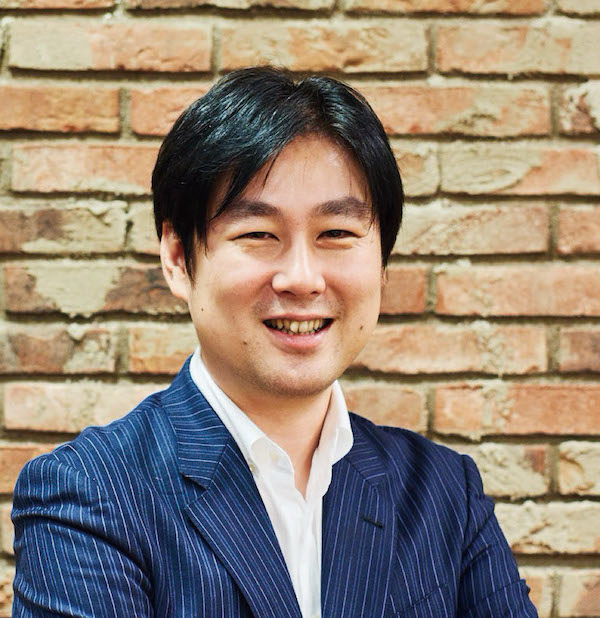
Mr. Takashi Kanbayashi
Representative Director, Eco-Pork Co.
He holds a Master of Business Administration from the University of Michigan, where he graduated cum laude. Worked at a foreign consulting firm, mainly in management strategy and new business model planning in the telecom area. Later, after leading the development of new solutions utilizing statistical analysis and artificial intelligence as a manager, he became independent.
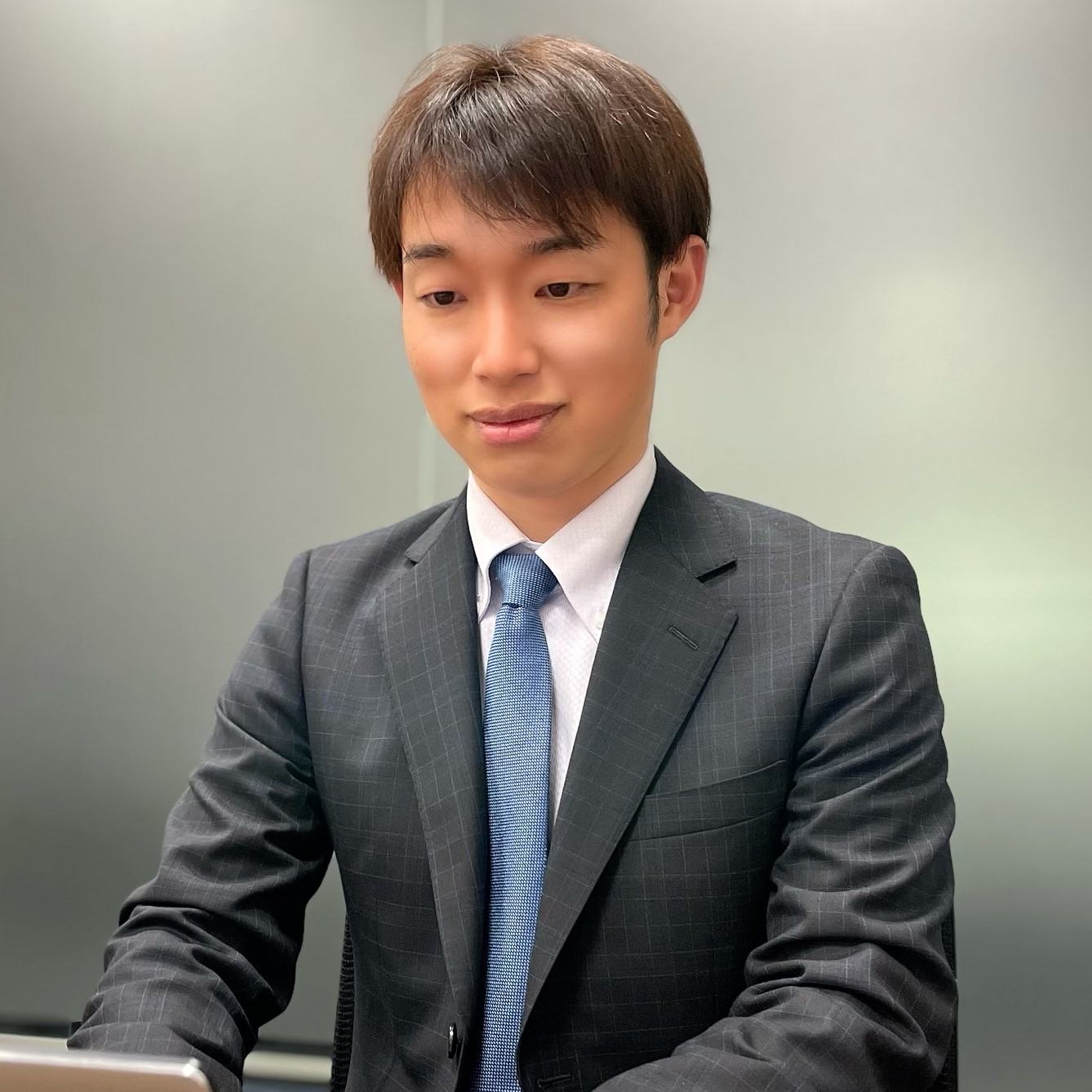
Mr. Keisuke Kobune
YE DIGITAL Corporation
General Manager, Business Promotion Department, Marketing Division
He joined YE DIGITAL in 2006. While in charge of developing hardware and embedded systems, he developed products utilizing data sensing and wireless communication technologies. In 2018, he moved to the Marketing Division, where he began to research whether there were areas in the non-manufacturing sector where he could make a contribution to society by utilizing YE DIGITAL's products and technological capabilities. In 2018, he moved to the Marketing Division, where he started researching for areas in the non-manufacturing sector where he could make a contribution to society by utilizing our products and technological capabilities.
Currently planning and commercializing solutions to realize livestock DX, such as visualization of remaining feed tank volume and construction of data utilization infrastructure.

Moderator.
Yuji Fukuda
Leave a Nest Co., Ltd.
Director, Investment Development Research Center
After completing a master's degree in molecular biology at the Graduate School of Biological Sciences, Nara Institute of Science and Technology, he worked in agriculture for a year and a half at a pig farm directly managed by a feed sales company. In 2016, he launched and managed "Kumamoto Tech Planter," a project to support startups by the Kumamoto Prefecture Next-Generation Venture Creation Support Consortium. After working in Osaka, he joined the Tokyo Head Office in 2020.
- Main hall
Session Partner DIC Corporation
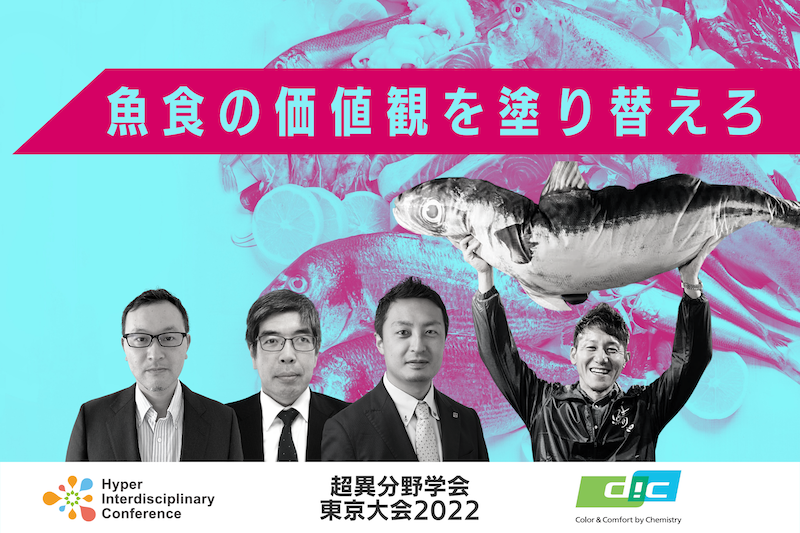
"More Information"
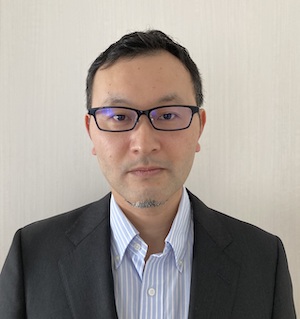
Mr. Daiei Nakaguma
DIC Corporation
Manager, H-1 Project, Healthcare Business Unit, New Business Management Division
After graduating from Kyoto University's Graduate School of Human and Environmental Studies (Synthetic Organic Chemistry), he joined DIC Corporation in 2002, where he was engaged in the development of polymeric materials for medical devices in the R&D Division, and from 2017, he participated in an in-house project to create new algae businesses, developing processes to extract active ingredients from algae biomass, and evaluating technologies for overseas algae start-ups, From 2019, he will work on marketing of new algae materials for aquaculture feed in his current position.
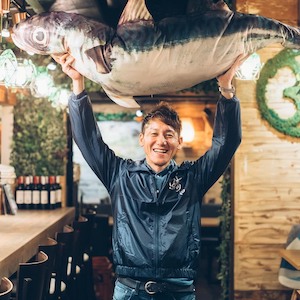
Mr. Takanori Uida
CEO, Fish Biotech, Inc.
Owns and operates Sabar, a restaurant specializing in "Torosaba" (mackerel) cuisine. Taking advantage of the decline in mackerel catches, he founded Fish Biotech (Toyonaka City, Osaka Prefecture), a company specializing in mackerel farming. The company has embarked on land-based mackerel farming, which can be done as long as there is tap water available. Unlike sea farming, land-based mackerel farming is not affected by ocean pollution or global warming. The company has comprehensively developed the seeds and seedlings, feed, and various systems necessary for cultivation, aiming to become a "platform performer" for land-based mackerel cultivation.
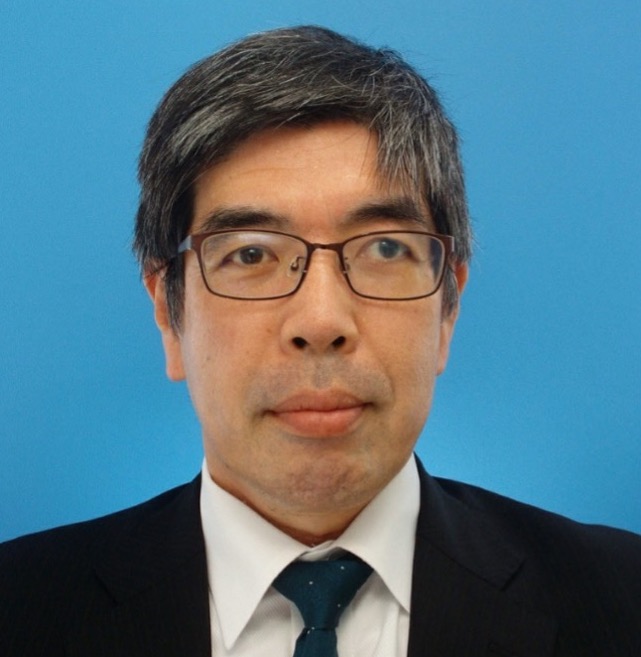
Mr. Shinya Ashida
General Manager, Central Research Laboratory, Maruha Nichiro Co.
Born in 1964. Graduated from Kyoto University, Faculty of Science, and joined Taiyo Fishery Corporation (now Maruha Nichiro) in 1988. After joining the company, he worked at the Central Research Laboratory, where he was mainly engaged in the development of functional materials from marine products, processed tuna products for raw consumption, and other marine and food processing technologies.
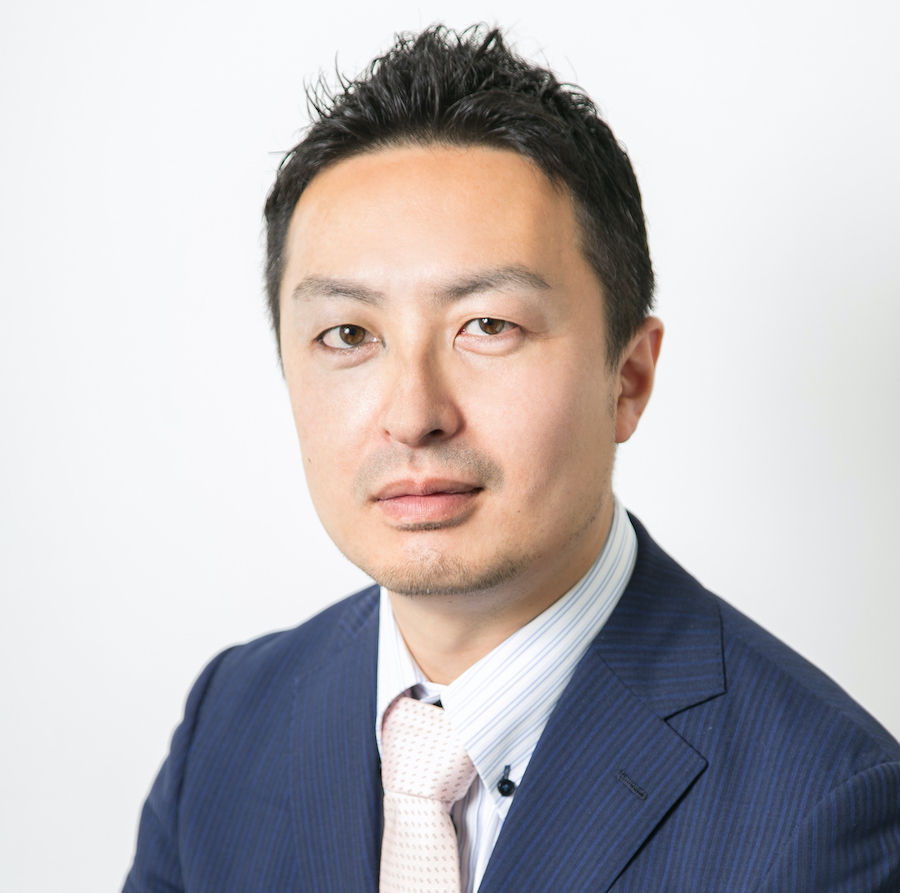
Moderator.
Shuhei Tsukada
Executive Officer, LIVERNESS Co.
D. in Applied Biotechnology, Graduate School of Agricultural and Life Sciences, The University of Tokyo. D. in Agriculture. Participated in the management of RIVERNESS since 2003, when the company was in its early stages of establishment. After accumulating practical experience in experimental classes and various types of writing, developed and introduced advanced technologies in the agri-field and launched a project to build an ecosystem for regional startups. Committed to technology and business development in collaboration with large and medium-sized companies, venture companies, researchers, etc. on a field-oriented basis.
- Session Room A
How to deal with CO2 toward carbon neutrality by 2050
Session Partner Daikin Industries, Ltd.
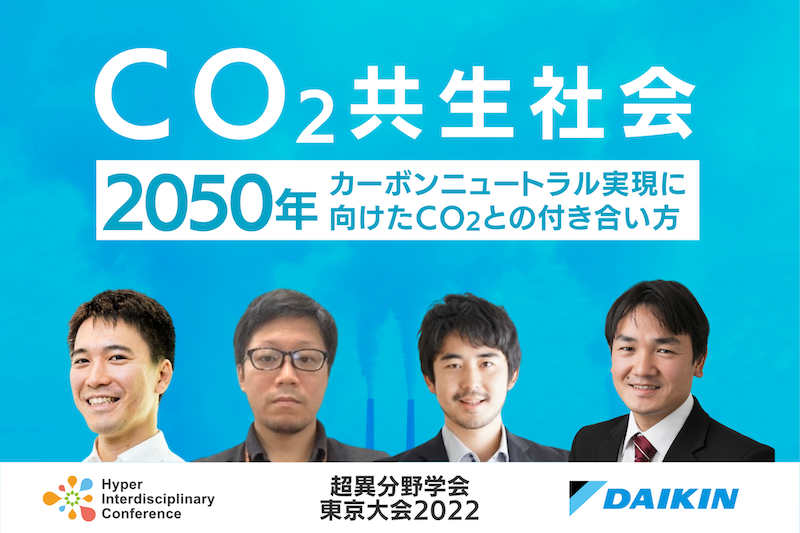
"More Information"
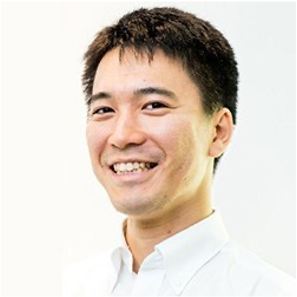
Mr. Taro Mitani
DAIKIN INDUSTRIES, LTD.
Deputy Director, Technology Innovation Center and General Manager, CVC Office
Graduated from Kyoto University, Faculty of Agriculture in 2011, and joined Daikin Industries, Ltd. After joining the company, he was involved in management accounting operations and PMI of Goodman, a major U.S. residential air conditioning company acquired in 2012, etc. In 2015, he stayed outside the company and experienced investment banking operations. After returning to Japan, he was appointed Deputy Director of the Technology Innovation Center, a global center for open innovation, in 2017, responsible for promoting corporate venturing, including M&A and investments, etc. From 2019, he will also serve as General Manager of the CVC Office.
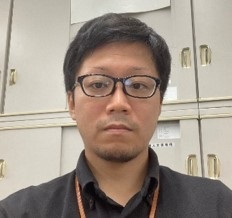
Mr. Shuhei Kaneko
Industrial Science and Technology Policy and Environment Bureau, Ministry of Economy, Trade and Industry
Assistant General Manager, Office of Energy and Environmental Innovation Strategy (General Manager)
Graduated from Osaka University with a B.S. in Engineering, and joined the Ministry of Economy, Trade and Industry (METI) in 2014. He joined the Ministry of Economy, Trade and Industry (METI) in 2014 and has been involved in SME policy, livelihood support for nuclear victims of the Great East Japan Earthquake, and the response to the accident at the Fukushima Daiichi Nuclear Power Plant (countermeasures for contaminated water). He is in charge of the Green Growth Strategy as an industrial policy to support innovation creation in the energy and environment fields and to create a virtuous cycle between the economy and the environment, and is involved in planning and formulating related areas.
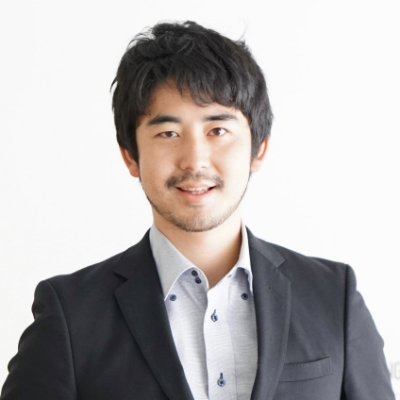
Mr. Shunsuke Tsuboi
Representative Director and CEO, Sagri Corporation
While a student at Yokohama National University, Faculty of Science and Engineering, Department of Mechanical Engineering, he went to Rwanda in 2016 to conduct educational activities and learned that local children have their own dreams, but after graduation, they work in the agricultural field. He founded Sagri in 2018, aiming to improve the local agricultural situation with satellite data and to create an environment where children can challenge their own dreams. Prior to founding Sagri, he was the CEO and Representative Director of Uchu Corporation, the first private sector space education venture. He was selected by MIT Technology Review as an innovator under 35 years old who creates the future. Member of the "Study Group on Management of Agricultural Land Information Using Digital Maps" of the Ministry of Agriculture, Forestry and Fisheries of Japan. Visiting Professor, Information Management Innovation Professional University
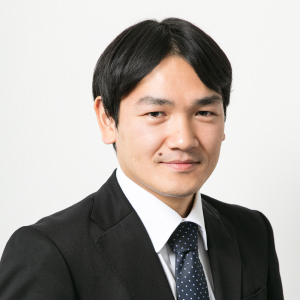
Moderator.
Yoshinobu Osaka
General Manager, Strategic Development Division, Riverness, Inc.
He holds a Master's degree in Business Administration from Keio University, Graduate School of Business Administration. After working at Mitsubishi UFJ Bank and Japan Bank for International Cooperation, he worked at the Institute of Industrial Science, University of Tokyo (Specially Appointed Researcher) and Japan Science and Technology Agency (ACCEL Program Manager). Since joining RIVANES, he has been responsible for supporting the commercialization of research results by researchers and the investment and development of venture companies. He also serves as President and Representative Director of Glocalink Inc. and Growth Manager of the Real Tech Fund.
- Session Room B
Session Partner Toyobo Co.
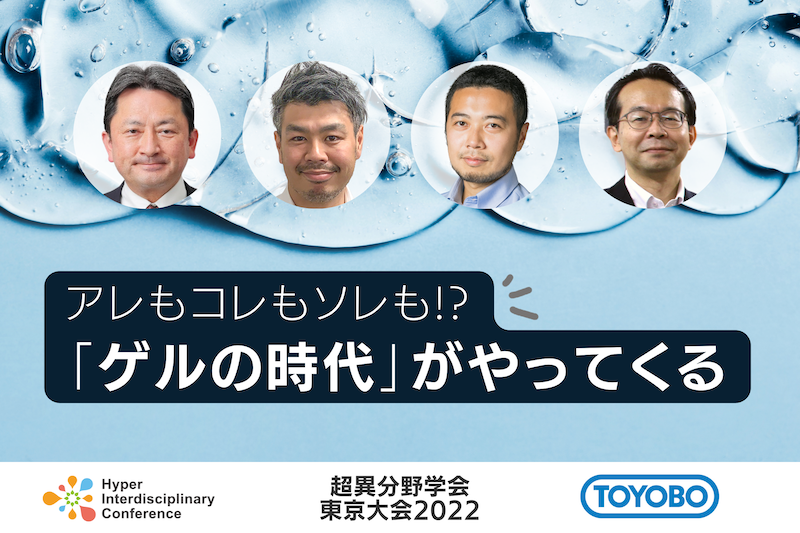
"More Information"
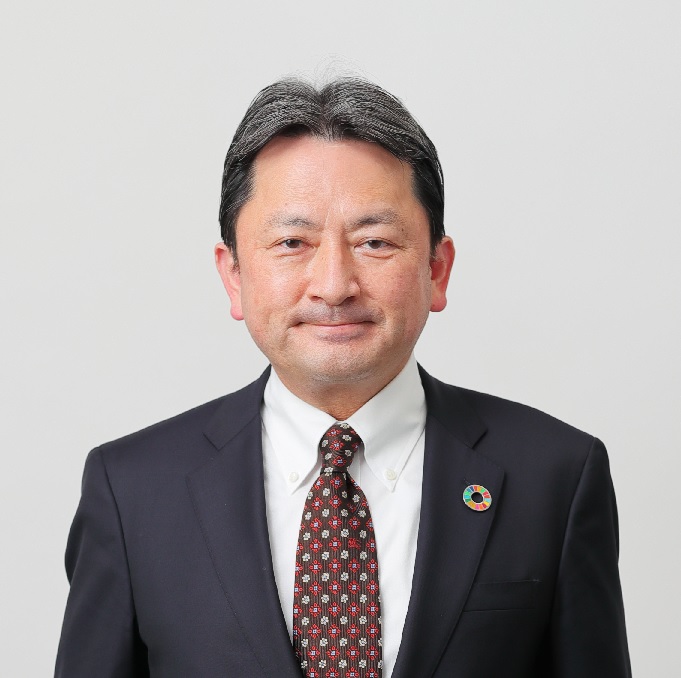
Mr. Yasuo Ota
Toyobo Co.
Managing Executive Officer Head of Innovation Division
After completing a master's degree in polymer chemistry at the Graduate School of Engineering, Kyoto University, he joined Toyobo Co. Since then, he has been engaged in the research and development of high-performance materials such as super fibers, and after serving as the General Manager of the General Research Laboratory of Toyobo, he was appointed as the General Manager of the Bio-Chemicals Division and the President of Toyobo America, Inc. Currently, as the head of the Innovation Division, he is focusing on creating new solutions that can contribute to a carbon neutral society in 2050 through the fusion of his core technologies and open innovation. In 2004, he was awarded the 2004 Society of Fiber Science and Technology Award for his "Analysis of the Structure Formation Process of Super Fibers by Gel Spinning". He also received a doctorate in engineering from Kyoto University in 2005 for his research. (He is currently a councilor of the Chemical Fibers Research Institute of Japan and vice president of the Japan Bio-Plastics Association.
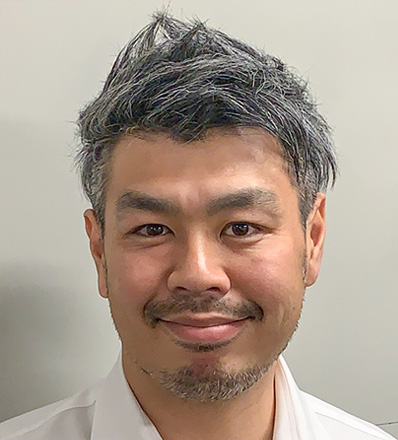
Mr. Takamasa Sakai
Professor, Department of Bioengineering, Graduate School of Engineering, The University of Tokyo
D. in 1997 from the Department of Materials Science and Engineering, Graduate School of Engineering, the University of Tokyo. After serving as a JSPS Research Fellow, Project Assistant Professor at the University of Tokyo Center for NanoBioIntegration, and Project Assistant Professor at the University of Tokyo Global COE, he joined the Department of Bioengineering, Graduate School of Engineering, the University of Tokyo as an Assistant Professor in 2011. In January 2019, he was appointed as Director and Chief Technology Officer of Gericle Corporation, a bio-venture company aiming to apply tetragel to regenerative medicine, and assumed his current position in February 2020. He specializes in elucidating the basic science of polymer gels using highly structure-controlled polymer gels, constructing medical structural materials using hydrogels, and applying hydrogels as carriers for regenerative medicine. D. (Engineering).
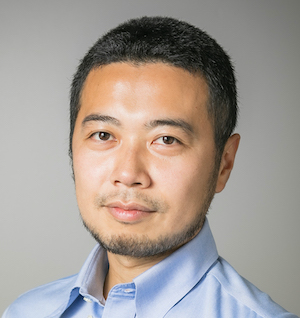
Mr. Tasuku Yanagisawa
President and Representative Director, CELFIBER Inc.
Graduated from Tokyo University of Pharmacy and Life Sciences, Faculty of Life Sciences, Department of Environmental Life Sciences in 2007. worked in planning and development at LIVANES Corporation until March 2011. received his Ph.D. (Engineering) from the University of Tokyo, Department of Chemical and Biological Engineering in December 2017. received the Dean's Award of the Graduate School of Engineering, University of Tokyo and the President's Award of the University of Tokyo in March 2018. Specialized in polymer chemistry, materials chemistry, soft materials, and hydrogel.Appointed as Director of Cell Fiber since May 2018.Principal Investigator of AMED "Development of high density continuous production technology for antibody production using cell fibers" since June 2018.NEDO in October 2018. He was selected for Entrepreneurs Profgram (NEP) and developed a contractile force measurement system oriented to drug discovery application of cardiac fibers.He was appointed as Representative Director in June 2019.
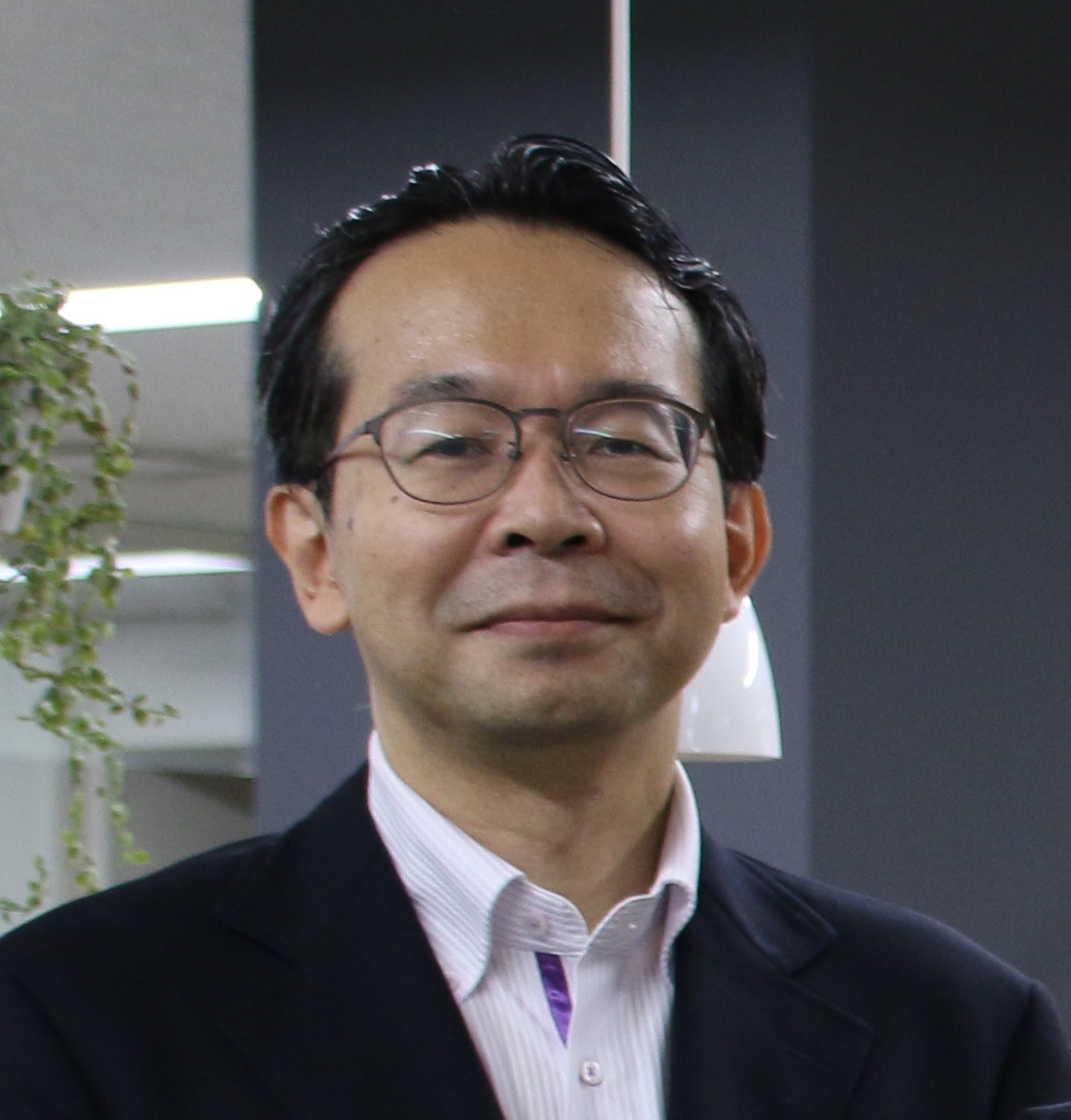
Moderator.
Mr. Norio Iizuka
Counselor, General Manager of Innovation Strategy Department, TOYOBO CO.
After receiving a Master's degree in Polymer Chemistry from the Faculty of Engineering, Kyoto University, he joined Toyobo Co. He was involved in the development of melt spinning technology at the General Research Laboratory, and in the development, production, and quality assurance of polyester tire cord spinning and processing technology at the Tsuruga Plant. After serving as General Manager of the Tire Cord Division and General Manager of the Administration and General Affairs Department of Toyobo STC Corporation, in 2016 he became Manager of the Future Strategy Group Manager, then in 2020 as General Manager of Innovation Strategy Department.
- Main hall
Session Partner Nihon Unisys, Ltd.
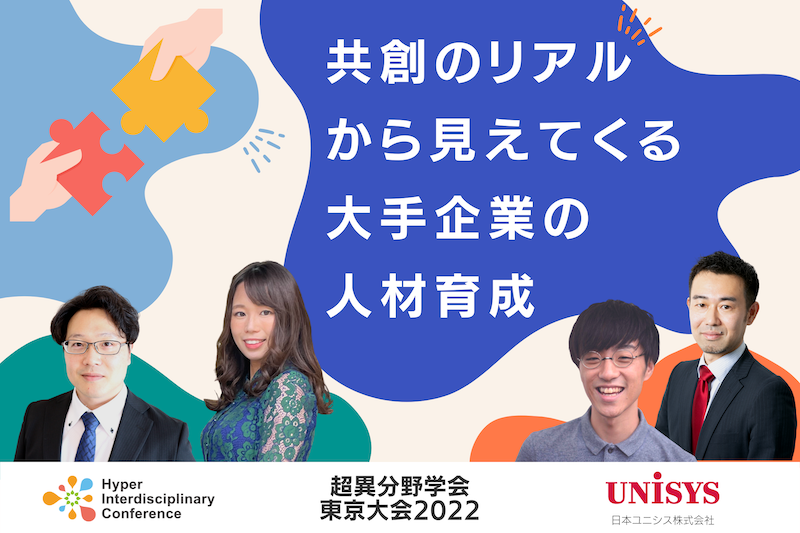
(*) JRE Station College
https://jre-station-college.jp/
"More Information"
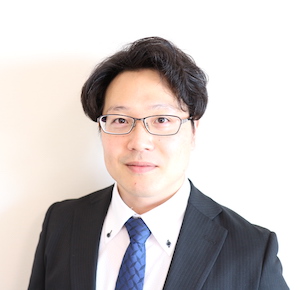
Mr. Kazuki Yoshikoshi
Nihon Unisys, Ltd.
Next Generation Business Development Department, Public Business Service Division 1
Joined Nihon Unisys in April 2009. Experienced from web reservation system development in the entertainment field to public sector and smartphone application development. He also experienced new fields such as design and development of security robots, and was widely engaged in SI business as an engineer. In 2021, he joined JRE Station College with the aim of becoming a human resource with a higher perspective than that of an engineer.
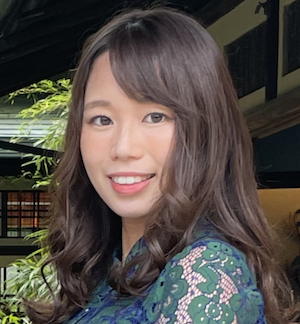
Mr. Manzumi Kasahara
Shimizu Corporation
In charge of CVC, Venture Business Dept.
After graduating from Osaka University with a BA in Foreign Languages, he studied abroad in Indonesia before joining Kansai Electric Power Co. He was engaged in overseas power plant construction projects and power generation company acquisitions in the International Business Division. While stationed in Indonesia, he was involved in construction projects of thermal power plants. Currently, he belongs to the Venture Business Department of Shimizu Corporation's Frontier Development Office, where he is promoting the company's open innovation through venture investment.
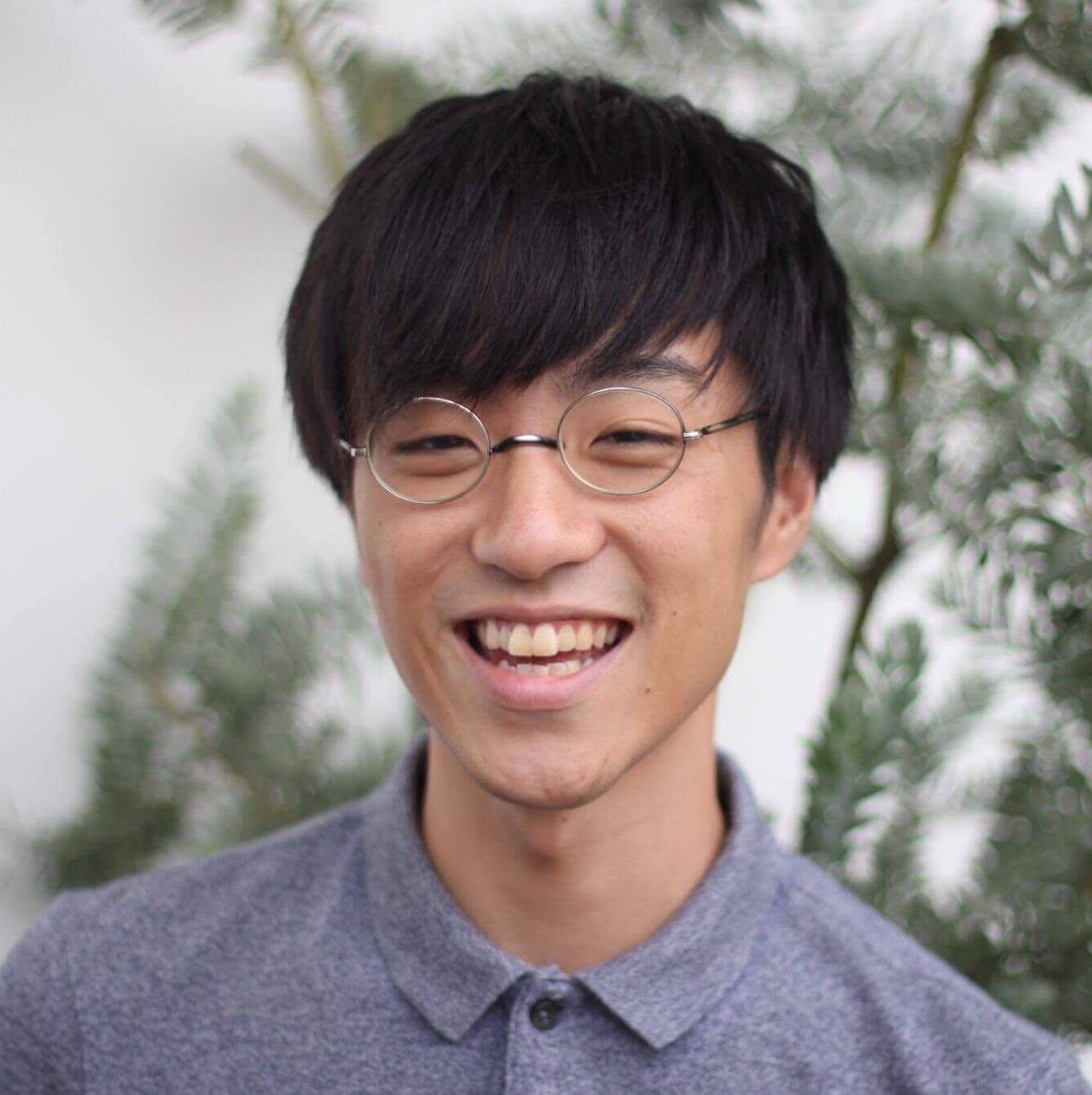
Mr. Yota Takakura
Representative Director and CEO, Inoka Co.
Born in 1994. Graduated from the University of Tokyo's Faculty of Engineering, and conducted research in the Junichi Rekimoto Laboratory of the Graduate School of Engineering at the University of Tokyo, where he conducted research on supporting practice of musical instruments using machine learning. While in school, he founded a hardware development company and established Inoka Inc. in April 2019, and became a director of the Roth Foundation for Children's Mirai in October 2021. In the same year, he was selected for Forbes JAPAN "30 UNDER 30".
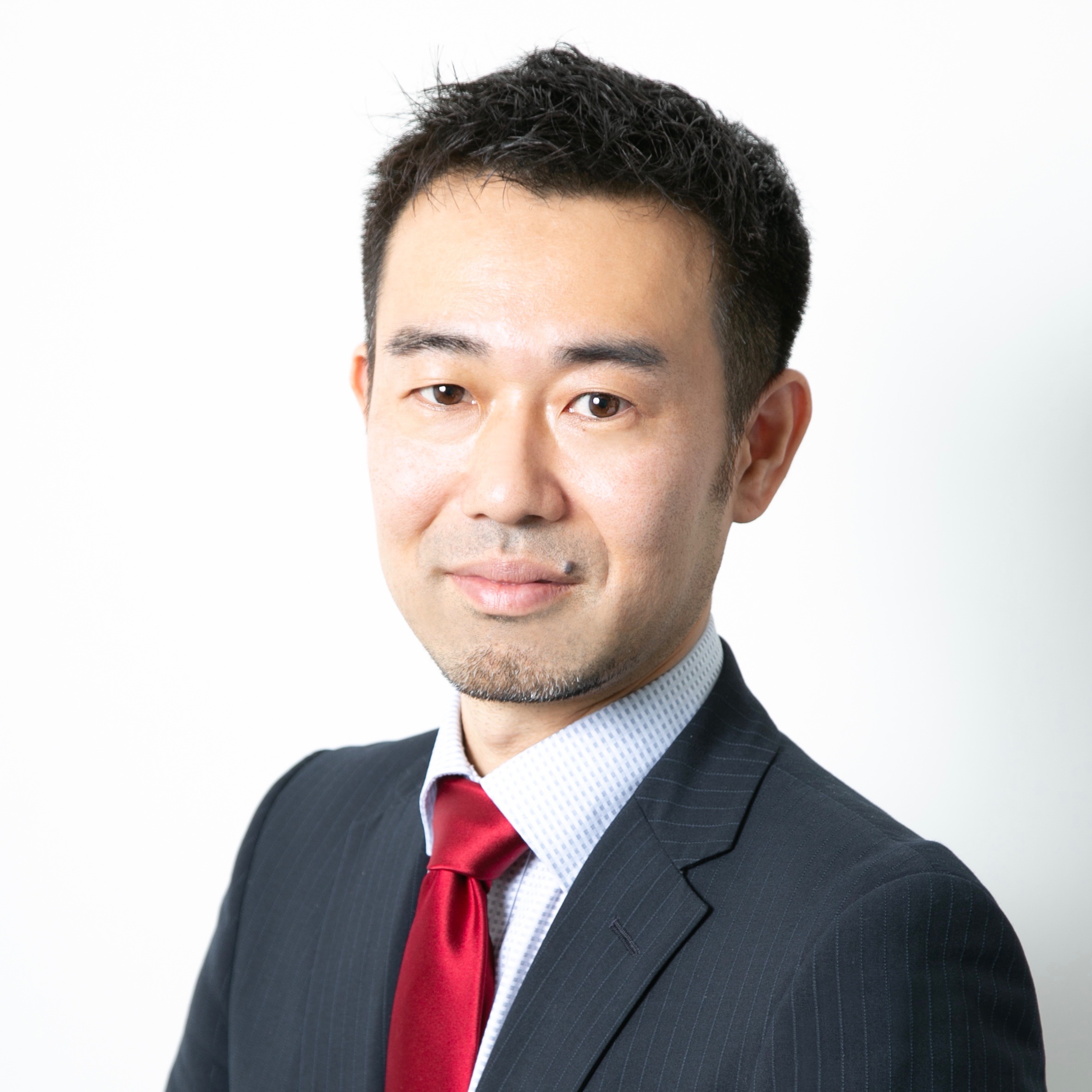
Moderator.
Kazuhiro Hasegawa
Executive Officer CKO, LIVERNESS Co.
He holds a master's degree in engineering from Tokyo Metropolitan University. He joined Leave a Nest in his first year of master's degree and later became the first new employee of Leave a Nest. He launched the Human Resource Development Division and became an executive officer in 2012, leading the launch of the TECH PLANTER business and real-tech fund, building case studies of collaboration between startups and local factories, opening the "Center of Garage" incubation facility, and supporting new business creation for small and medium-sized enterprises.
Concurrently, he is Executive Vice President of Realtech Holdings, Director of Glocalink Corporation, and Director of NESTiPLAB Corporation.
- Session Room A
Session Partner Japan Tobacco Inc.
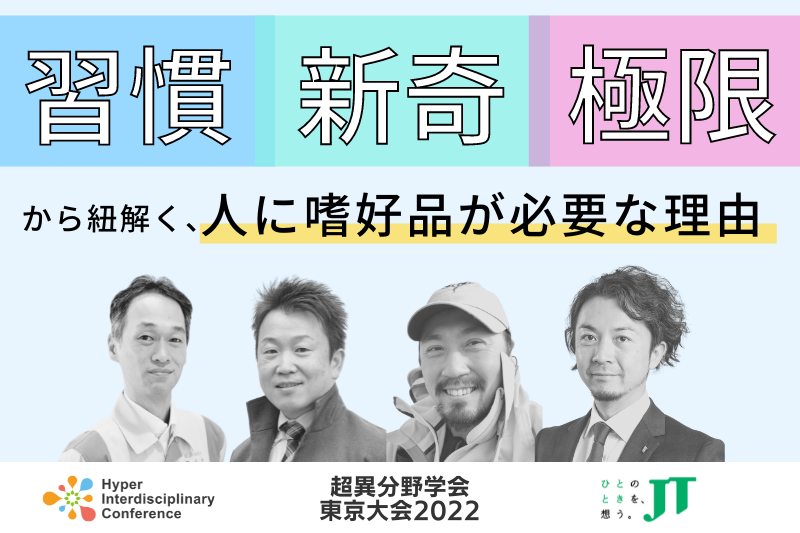
"More Information"
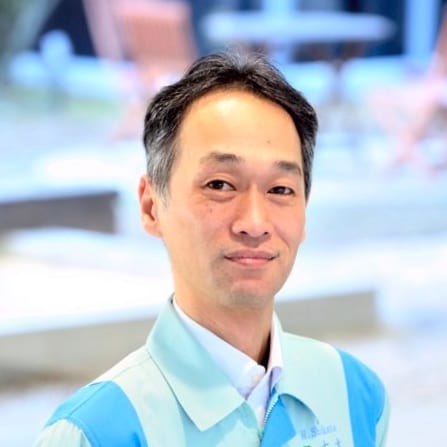
Mr. Hiroki Shikata
Japan Tobacco Inc.
R&D Principal Scientist, Global Tobacco Business
Born in Nagasaki, Japan, in 1965, he graduated from the Graduate School of Science at the University of Tokyo in 1989 and joined JT Corporation. He was engaged in research on chemical sensory perception, such as taste and aroma, and spent two years as a Visiting Scientist at the Monell Institute for Chemical Sensory Research in the U.S. from 1995. After returning to Japan, he worked on the development of D-spec (low odor tobacco products) technology and led the application of this technology to products. In 2010, he became Director of the R&D Planning Department, in 2012, Director of the Product Technology Development Department, and in 2015, Director of the Central Tobacco Research Institute, before assuming his current position in 2019. He is currently experimenting with cross-divisional technological collaboration and the creation of a more open alliance system, based on his belief that innovation is born from "intellectual nonsense. D. in Human Sciences.
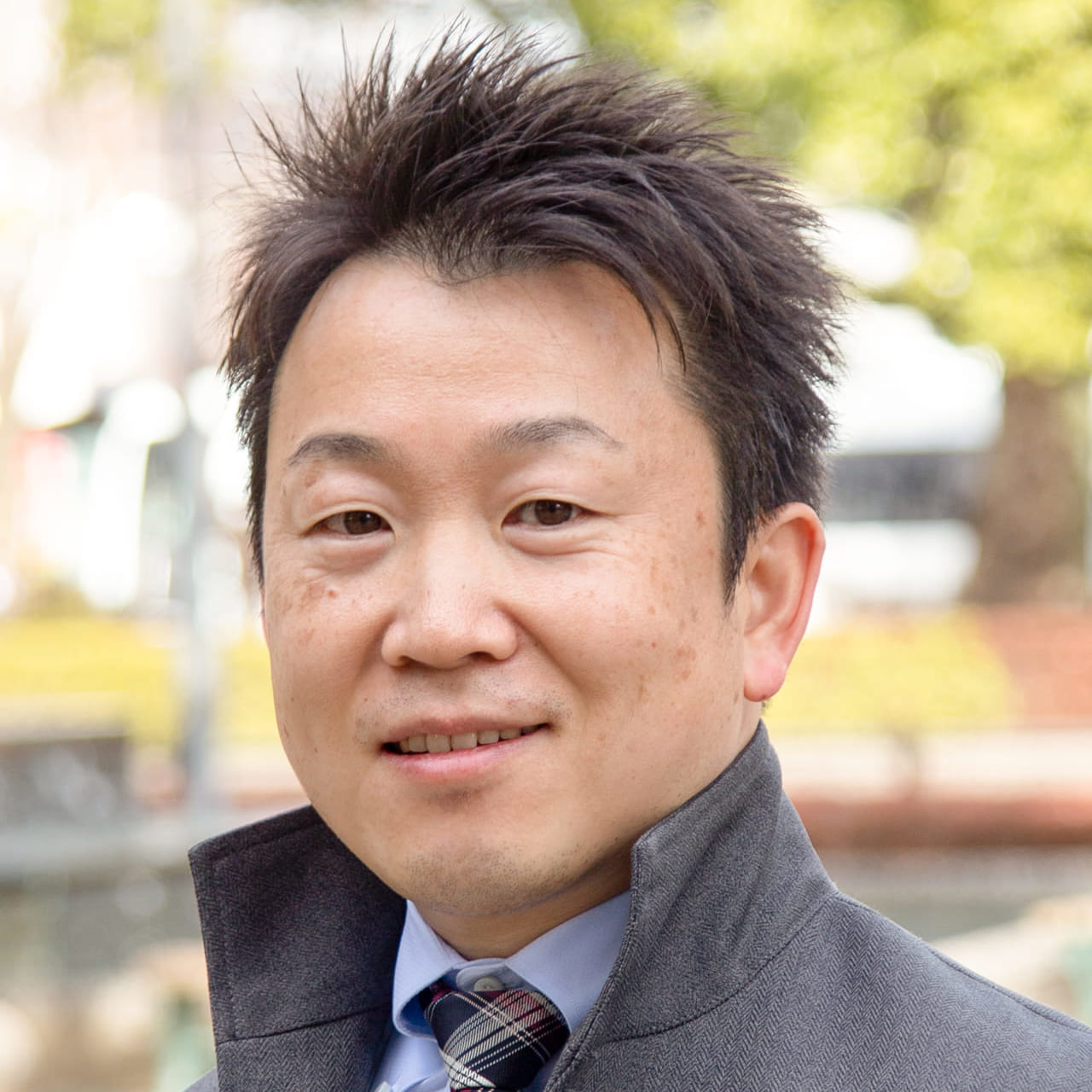
Akihiro Iijima
Professor, Department of Regional Development, Faculty of Regional Policy Studies, Takasaki University of Economics
D., Professor, Faculty of Regional Policy Studies, Takasaki University of Economics
After working at a research institute, he arrived at Takasaki City University of Economics in 2010. After serving as a full-time lecturer and associate professor, he assumed his current position in 2018. He specializes in environmental data science. Utilizing the seeds of his research on food preference and behavioral psychology, he established FUTURENAUT Corporation in 2019 and is in charge of research and development and consortium projects.
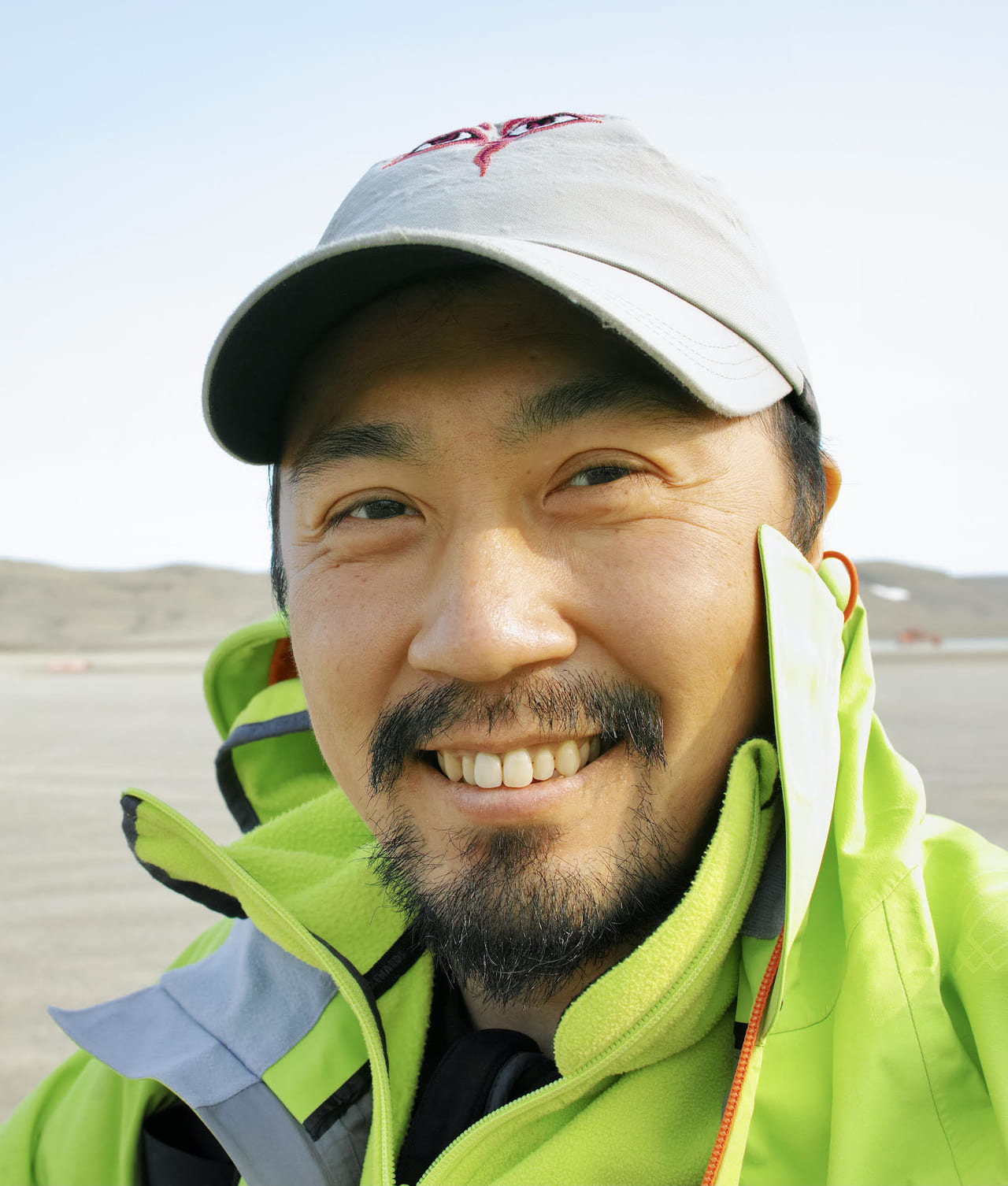
Mr. Yuji Murakami
Polar Architect / FIELD assistant Representative
A polar architect who has explored various polar regions to find beautiful ways of living in harsh environments such as Antarctica and the Himalayas, he joined the 50th Japanese Antarctic Research Expedition as a wintering party in 2008, and in the Mars160 simulated Mars experiment conducted in 2017, he completed a total of 160 days as deputy commander in two simulated Mars environments on Earth. In the Mars160 experiment in 2017, he completed a total of 160 days in two simulated Mars environments on Earth as deputy commander. He served as the commander of MDRS Crew 191 TEAM ASIA in 2018. He has lived in polar regions for more than 1,000 days, including the South Pole, the North Pole, and Mount Everest, which are also called the "three poles of the Earth. He is currently working on the theme of "Inter-Survival," which unravels the relationship between human life and architecture.

Moderator.
Joe Inoue
Representative Director, Vice President CTO, Liverness, Inc.
D. in Pharmaceutical Sciences from Tokyo University of Pharmacy and Life Sciences. He is a founding member of LIVERNESS. After completing his doctoral studies, he worked as an assistant professor and lecturer at the Faculty of Science, Kitasato University, and an assistant professor at the Graduate School of Medicine, Kyoto University, before being appointed and concurrently serving as a specially-appointed associate professor at the Institute for Advanced Biosciences, Keio University in 2015, and as a professor of advanced pharmacy at the Faculty of Pharmaceutical Sciences, Kumamoto University and a visiting professor at Keio University's Faculty of Pharmaceutical Sciences in 2018. While conducting research and development, he is a researcher involved in launching joint research projects with universities and research institutions and supporting the establishment of research institutes.
- Session Room B
- AI, Functionality, and Material Production, Beyond Full Control -.
Session Partner Plantex Inc.
powered by Agriculture, Forestry and Fisheries Research Center
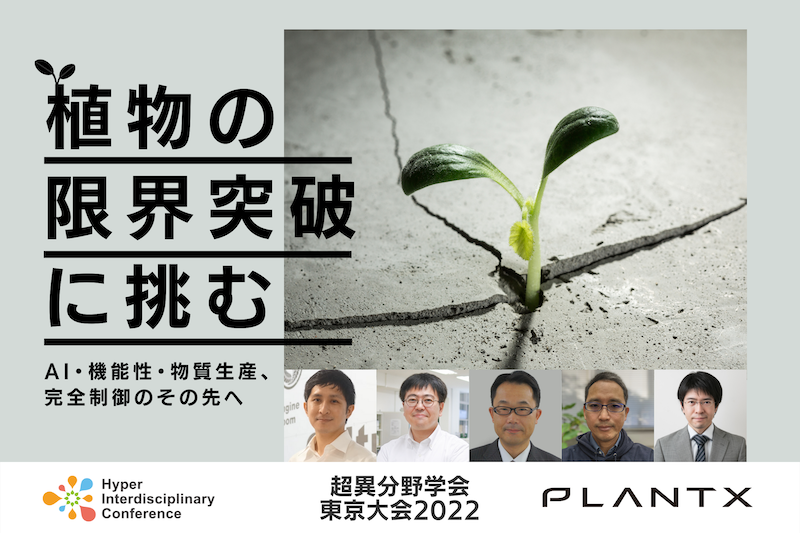
"More Information"
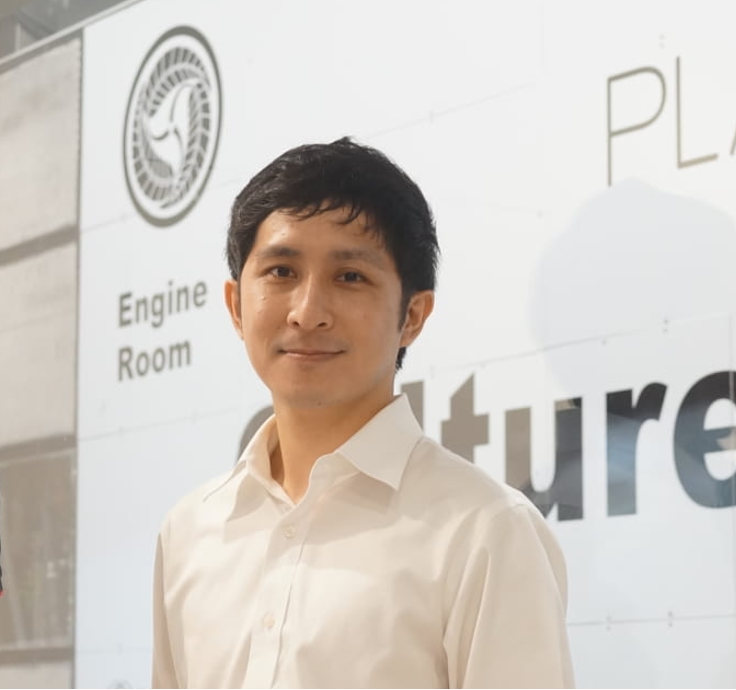
Mr. Masahito Takeyama
General Manager, Planning Office, Plantex Co.
Mr. Kato holds a Master's degree from the Graduate School of Agricultural and Life Sciences at the University of Tokyo. After graduating, he joined a general trading company, where he was engaged in corporate operations overseeing the financial business and resource investment business. While working for a general trading company, he encountered Plantex and was attracted by its technology and vision, and joined the company in March 2020. He is currently in charge of corporate planning and cultivation testing.

Mr. Jun Zeze
Humanome Research Institute, Inc.
D., President and Representative Director. D. in Science and Technology. He has served as Assistant Professor at the University of Tokyo, Associate Professor at Ochanomizu University, Associate Professor at Tokyo Institute of Technology, and Research Team Leader at the National Institute of Advanced Industrial Science and Technology (AIST). He specializes in the development of machine learning and mathematical statistics methods, as well as large-scale data analysis in the life sciences. He won the KDD Cup 2001, a data mining contest of the American Society for Computing Machinery, and the Oxford Journals-JSBi Prize.
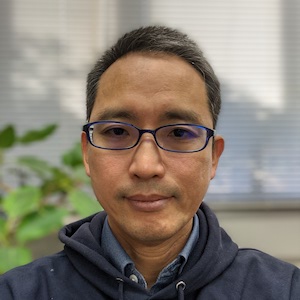
Mr. Kensuke Kageyama
Professor, Graduate School of Science and Engineering, Saitama University
D. in Advanced Interdisciplinary Engineering from the University of Tokyo. After engaging in research on nondestructive evaluation of various materials using acoustic emissions (AE, elastic waves generated by sudden phenomena), he has developed acoustic and ultrasonic sensors using electrets. He is now working on the practical application of technology that uses electret sensors to capture the invisible movements of plants and microorganisms with AE and monitor their activities. We are challenging the activity monitoring in various environments by developing our own instruments for AE measurement, such as sensor elements, device circuit boards, and analysis programs in our laboratory.
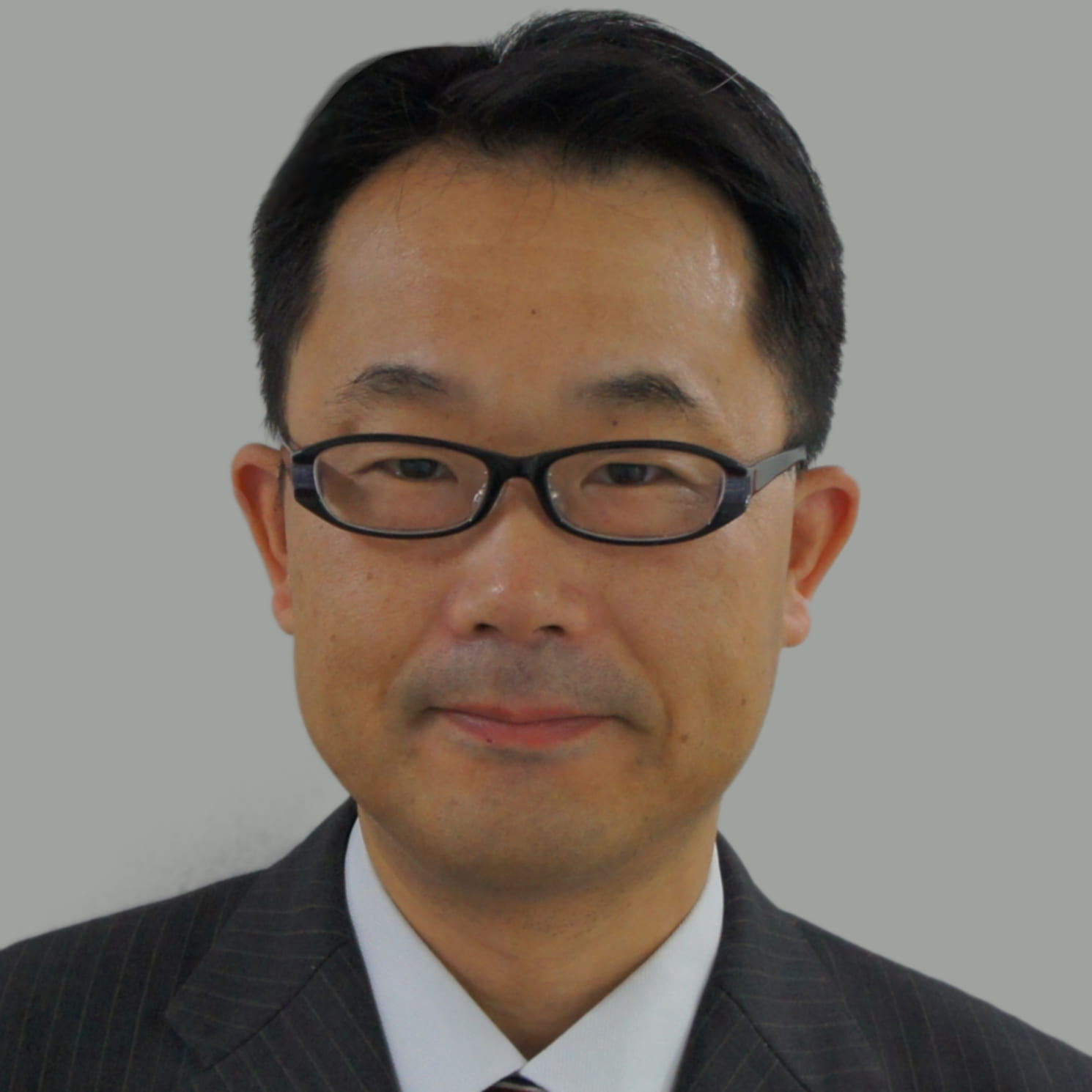
Mr. Koji Uei
Associate Professor, Graduate School of Engineering, Muroran Institute of Technology
D. (Pharmaceutical Sciences), Tohoku University Graduate School of Pharmaceutical Sciences, 2000, teaching staff, Faculty of Pharmaceutical Sciences, Kanazawa University, 2000, postdoctoral researcher, Department of Molecular Physiology, Max Planck Institute, Germany, assistant at Tohoku Pharmaceutical University, 2002, lecturer at Tohoku Pharmaceutical University, 2006, current position since 2011, aims to create new industries using natural resources in Hokkaido through collaboration in different fields He aims to create a new industry using Hokkaido's natural resources through collaboration among different fields.
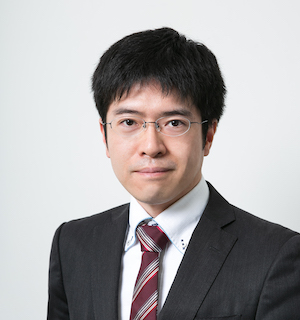
Moderator.
Yosuke Miyauchi
Director, Agriculture, Forestry and Fisheries Research Center, Riverness, Inc.
Representative Director, Agronome Research Institute, Inc.
Ph.D. (Agronomy), Graduate School of Horticulture, Chiba University. In graduate school, he established high-yield cultivation technology of soybean in Xinjiang Uygur Autonomous Region. In 2019, he established the Agriculture, Forestry, and Fisheries Research Center to actively promote cross-sectional research in the field of agriculture.
- Main hall
Partner
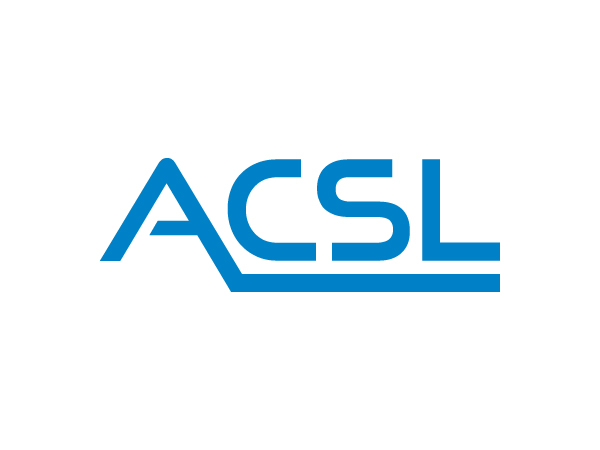
ACSL Corporation
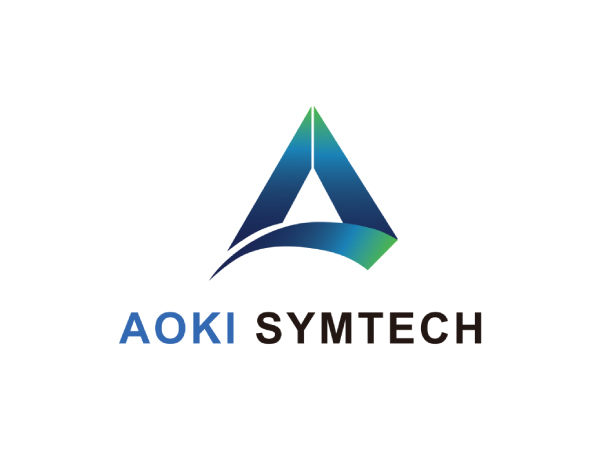
Aoxintec Corporation
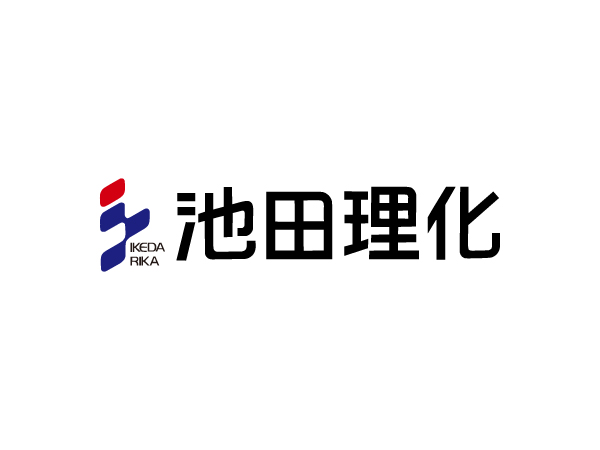
Ikeda Rika Corporation
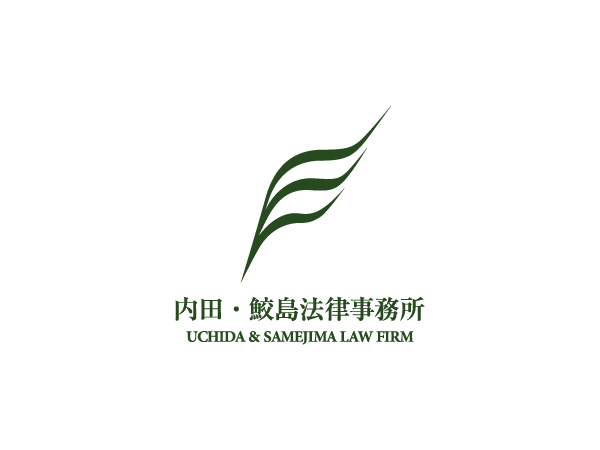
Uchida & Samejima Law Office
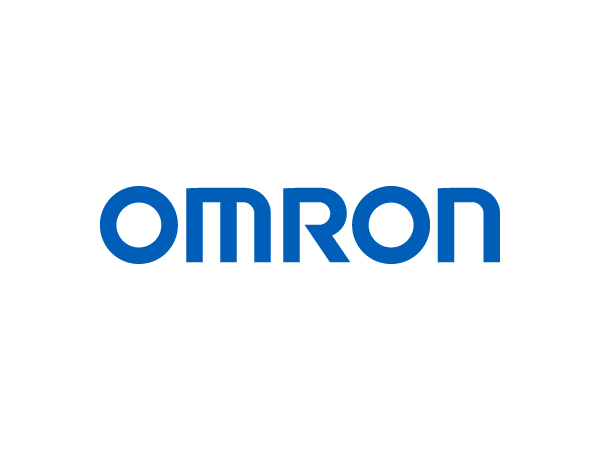
Omron Corporation
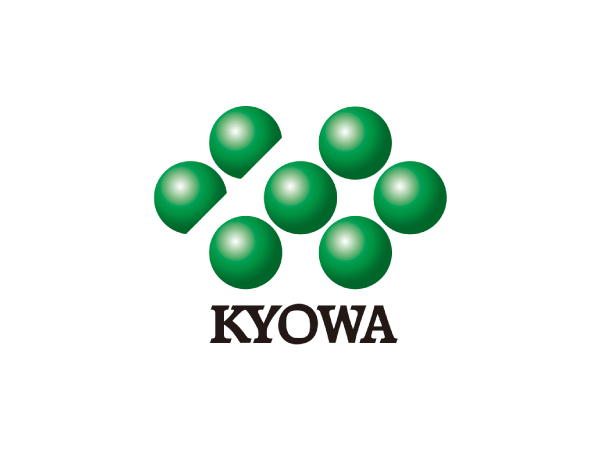
Kyowa Hakko Bio Co.

KOBASHI HOLDINGS Co.

Suntory Global Innovation Center Limited
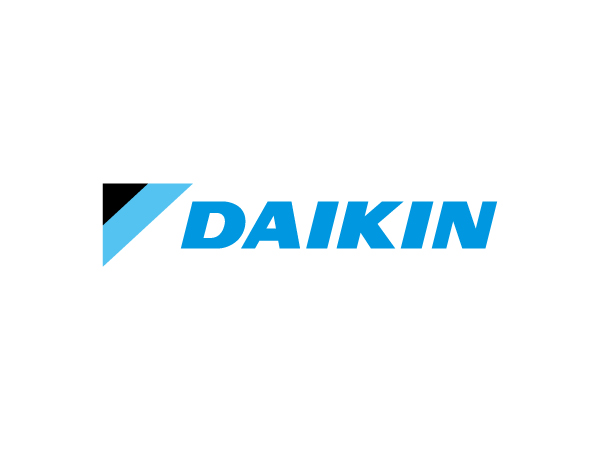
DAIKIN INDUSTRIES, LTD.

DIC Corporation
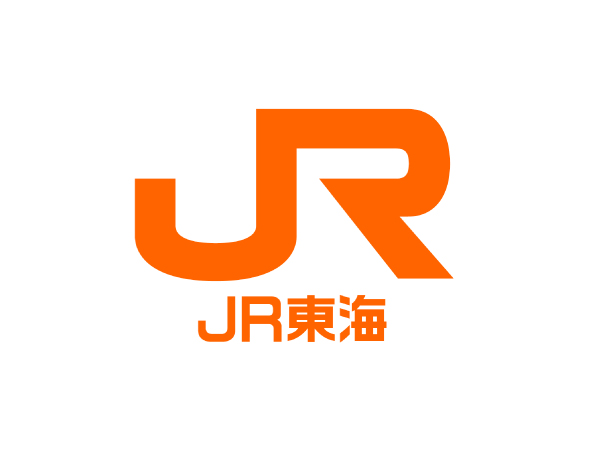
Tokai Railway Company
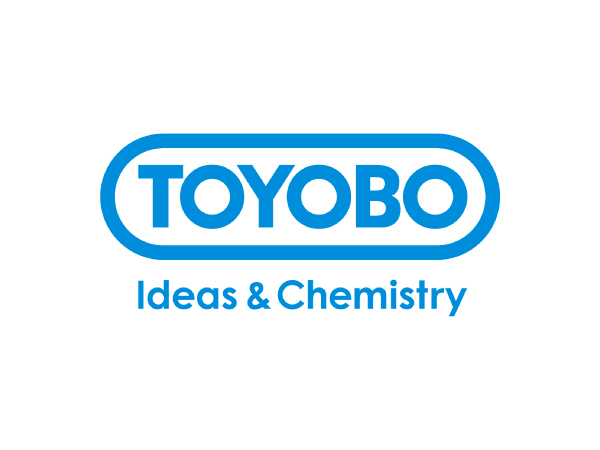
Toyobo Co.
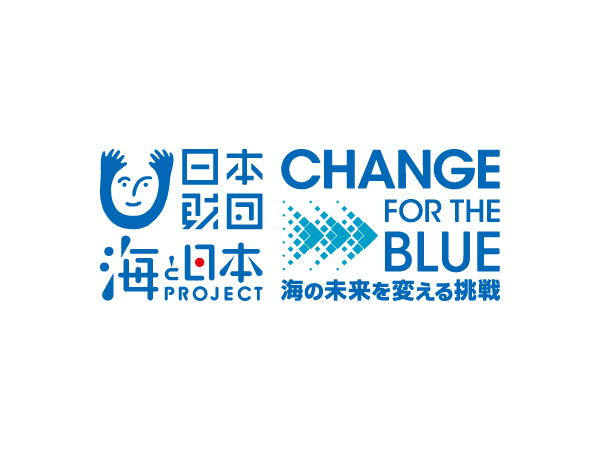
The Nippon Foundation

Japan Tobacco Inc.
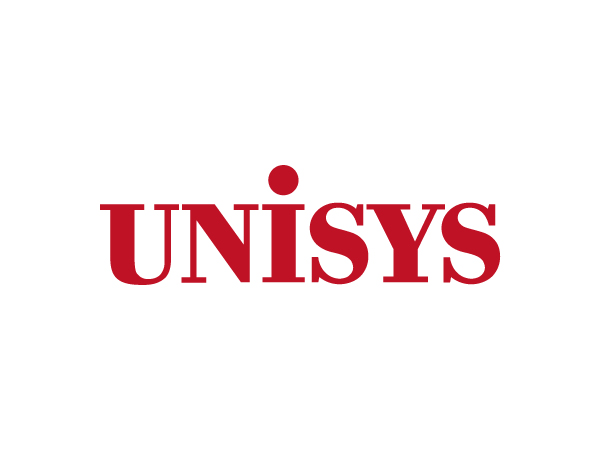
Nihon Unisys, Ltd.
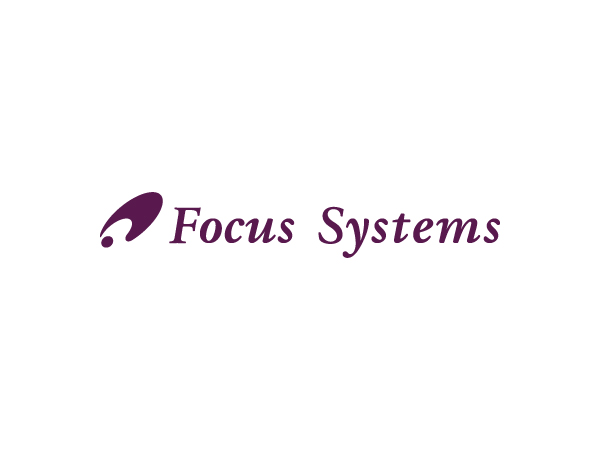
Focus Systems Co.

Plantex Corporation
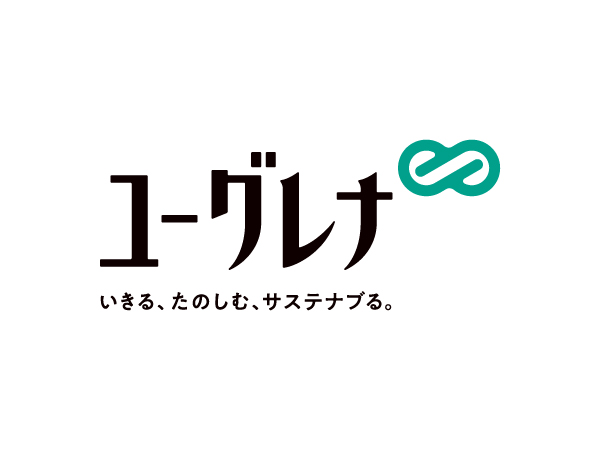
Euglena Co.


